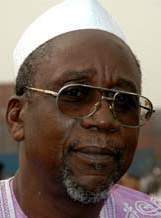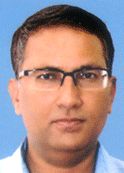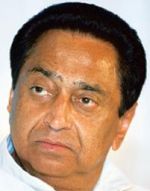Rulers
Index Na-Ne
Na II, byname King John, civil name John Paliknoa Sigrah (b. June 3, 1875, Lelu, Kosrae [now in Federated States of Micronesia] - d. April 19, 1957, Lelu), chief of Kosrae (1910-46).
Naarendorp, Harvey (Harold) (b. March 31, 1940, Paramaribo, Dutch Guiana [now Suriname]), foreign minister (1981-83), armed forces minister (1981), and justice minister (1981-82) of Suriname. He was also ambassador to Mexico (1984-87), Brazil (1987-90), Trinidad and Tobago (1997-2001), and France (2011-15).
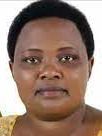
Nabbanja |
Nabbanja, Robinah (b. Dec. 17, 1969, Kamusenene village [now in Kakumiro district], Bunyoro, Uganda), prime minister of Uganda (2021- ).
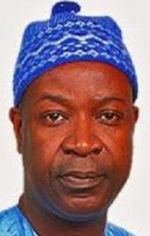
Nabiam |
Nabiam, Nuno Gomes (b. Nov. 17, 1966, Bissau, Portuguese Guinea [now Guinea-Bissau]), prime minister of Guinea-Bissau (2020- ). He was a presidential candidate in 2014 and 2019.
Nabiullin, Valey (Gabeyevich) (b. April 16 [April 3, O.S.], 1914, Staro-Kucherbayevo, Ufa province [now in Bashkortostan republic], Russia - d. Dec. 25, 1982, Ufa, Bashkir A.S.S.R., Russian S.F.S.R.), chairman of the Council of Ministers of the Bashkir A.S.S.R. (1951-62). He was also minister of livestock (1946) and agriculture (1949-51).
Nabiyev, Rakhmon (Nabiyevich) (b. Oct. 5, 1930, Shaiburkhan village, Khodzhent rayon [sector], Tadzhik S.S.R. - d. April 10, 1993, Khujand, Tajikistan), Tajik politician. He joined the Communist Party of the Soviet Union in 1961. Thereafter he held posts in the Central Committee of the Tadzhik Communist Party, and became minister of agriculture (1971-73) and chairman of the Council of Ministers (1973-82) of the Tadzhik S.S.R. He became Communist Party boss in 1982 and ruled the republic until he was ousted from power in 1985 in a series of sweeping reforms by Soviet leader Mikhail Gorbachev. He made a political comeback during the breakup of the Soviet Union. When the office of president was introduced in Tajikistan in 1990, he stood as an alternative candidate to Communist leader Kakhar Makhkamov but lost the vote in parliament. He was, however, elected president by popular vote in November 1991. He failed to prevent civil war between his Communist supporters and a coalition of pro-democratic and pro-Islamic insurgents. He was forced to sign a resignation statement in September 1992, but that resignation was not formally confirmed by parliament and he said on several occasions that he had not officially resigned. In November, after parliament passed a resolution granting that the September resignation was a result of pressure and threats, he said he would now resign of his own free will "so that the people can be reunited and so that peace can return to Tajikistan."
Nabiyev, Yusif (Mustafa ogly) (b. 1926), chairman of the Council of Ministers of the Nakhichevan A.S.S.R. (1970-79).
Nabo, Francisco Murteira (b. July 22, 1939, Évora, Portugal), acting governor of Macau (1990-91). He was also Portuguese minister of infrastructure (1995-96).
Nabokov, Dmitry (Nikolayevich) (b. July 1 [June 19, O.S.], 1826, Pskov, Russia - d. March 28 [March 15, O.S.], 1904, St. Petersburg, Russia), justice minister of Russia (1878-85).
Nabokov, Mikhail (Nikolayevich) (b. July 21, 1829 - d. April 21, 1886), governor of Kalisz (1877-79); brother of Dmitry Nabokov.
Nabokov, Sergey (Dmitriyevich) (b. Oct. 6, 1866, St. Petersburg, Russia - d. Dec. 21, 1940, Bucharest, Romania), governor of Courland (1910-15) and Kursk (1915); son of Dmitry Nabokov.
Nabokov, Vladimir (Dmitriyevich) (b. July 20 [July 8, O.S.], 1870, Tsarskoye Selo [now Pushkin, part of St. Petersburg], Russia - d. March 28, 1922, Berlin, Germany), Russian politician; son of Dmitry Nabokov (and father of the writer Vladimir Nabokov). He was a member of the State Duma (1906) and justice minister of Crimea (1918-19). He was killed by assassins whose intended target was Pavel Milyukov.
Nabulsi, Suleiman al- (b. 1908, Salt, Ottoman Empire [now in Jordan] - d. Oct. 14, 1976, Amman, Jordan), finance minister (1946-47, 1950-51), foreign minister (1956, 1956-57), and prime minister (1956-57) of Jordan. He was also ambassador to the United Kingdom (1953-54).
Nabwera, Burudi, Kenyan diplomat. He was permanent representative to the United Nations (1963-70) and ambassador to the United States (1964-69).
Nacar, Manoel Antonio Guimarães, barão e visconde de (b. Feb. 15, 1813, Paranaguá, São Paulo [now in Paraná], Brazil - d. Aug. 16, 1893, Paranaguá), acting president of Paraná (1873, 1877). He was made baron in 1877 and viscount in 1880.

Naccache |
Naccache, Alfred (Georges), Arabic Alfrad (Jurj) al-Naqqash (b. 1887, Beirut, Lebanon - d. Sept. 26, 1978), prime minister (1941), president (1941-43), and foreign minister (1953-55) of Lebanon.
Nachev, Lyubomir (Todorov) (b. Oct. 22, 1954, Dyulevo village, Sredets municipality, Burgas province, Bulgaria - d. [suicide] Oct. 13, 2006, Karnobat, Burgas province), interior minister of Bulgaria (1995-96).
Nachovich, Grigor (Dimitrov) (b. Jan. 22, 1845, Svishtov, Ottoman Empire [now in Bulgaria] - d. Jan. 4, 1920, Sofia, Bulgaria), foreign minister of Bulgaria (1879-80 [acting], 1886-87, 1894-96). He was also minister of finance (1879-80, 1882-83, 1883-84, 1886, 1887, 1891-92, 1894), interior (1882), trade and agriculture (1883 [acting], 1896-97, 1899-1900), and public works (1883 [acting]), diplomatic representative in Romania (1884-89), Austria-Hungary (1889-91), and the Ottoman Empire (1903-06), and mayor of Sofia (1896-97).
Nachtigal, Gustav (b. Feb. 23, 1834, Eichstedt, Prussia [now in Sachsen-Anhalt, Germany] - d. April 20, 1885, aboard the gunship Möwe off Cape Palmas, Liberia), commissioner of German Cameroon (1884).
Nackreij, Olof friherre von (b. Dec. 7, 1728, Filipstad, Värmland, Sweden - d. June 22, 1783, Uppsala, Sweden), governor of Halland (1771-76), Kronoberg (1776-82), and Uppsala (1782-83). He became friherre (baron) in 1778.
Naço, Rako (b. July 15, 1923, Pogradec, Albania), Albanian diplomat. He was permanent representative to the United Nations (1972-77).
Nacu, Constantin (b. June 29, 1844, Bucharest, Walachia [now in Romania] - d. Feb. 20, 1920, Bucharest), justice minister (1885), finance minister (1885-88), and interior minister (1888) of Romania.
Nad, Jaroslav (b. March 21, 1981, Nitra, Slovakia), defense minister (2020- ) and acting foreign minister (2021) of Slovakia.
Nadareishvili, Tamaz (Vladimirovich) (b. July 19, 1954, Gagra, Abkhaz A.S.S.R., Georgian S.S.R. - d. Aug. 31, 2004, Tbilisi, Georgia), chairman of the Supreme Council of Abkhazia (pro-Georgian government) (1992-2004).
Nadarov, Ivan (Pavlovich) (b. Jan. 15 [Jan. 3, O.S.], 1851, Konstantinograd, Poltava province, Russia [now Krasnohrad, Kharkiv oblast, Ukraine] - d. 1922), governor-general of the Steppes (1906-08). He was also governor of Zabaikalye oblast (1901-04).
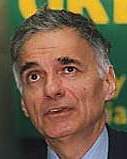
Nader |
Nader, Ralph (b. Feb. 27, 1934, Winsted, Conn.), U.S. presidential candidate (1996, 2000, 2004, 2008). In 1965 he became famous with his best-seller Unsafe at Any Speed, a book that criticized the American auto industry and led to the passage of the 1966 National Traffic and Motor Vehicle Safety Act, which empowered the government to set safety standards for all automobiles sold in the United States. He then turned his attention to other consumer issues and founded numerous organizations like the Center for Study of Responsive Law (1969) and Public Citizen (1971). His fellow activists, known as "Nader's Raiders," presented scores of studies on such widely divergent items as pipeline safety, baby food, insecticides, mercury poisoning, pension reform, land use, and banking. He is considered to be a major influence on the public-interest movement, and his model of fact-finding followed by lobbying is much in evidence in the United States. He was credited as the moving force in new legislation calling for stricter regulation of meat- and poultry-processing plants, coal-mine safety and health, and radiation emissions from television sets, and as instrumental in the passage of California's Proposition 103 (1988), which provided for a rollback of auto insurance rates. After running briefly as a write-in candidate in the 1992 Democratic primary in New Hampshire, he ran for president on the Green Party ticket in 1996 and 2000, winning 0.7% and 2.7% of the vote, respectively. Many Democrats saw him as a spoiler who helped to elect George W. Bush in 2000 (when his vote total far exceeded Bush's winning margin in two states, Florida and New Hampshire; by winning just one of them Al Gore would have had a majority of electoral votes). As an independent he won only 0.4% in 2004 and 0.6% in 2008.

Nadingar |
Nadingar, Emmanuel (Djélassem) (b. 1951, Bebidja, southwestern Chad), defense minister (2004-05) and prime minister (2010-13) of Chad. He was also minister of petroleum resources (2006-08), mines and energy (2008-09), and decentralization (2009-10).
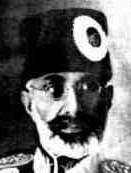
Nadir |
Nadir Shah, Mohammad, official epithet Ghazi, official posthumous epithet Shah-i Shahid (the Martyr King) (b. April 10, 1880 - d. [assassinated] Nov. 8, 1933, Kabul, Afghanistan), king of Afghanistan (1929-33); brother of Sardar Mohammad Aziz Khan.
Nadzhafov, Guseyn (Gumbat ogly), first secretary of the Communist Party committee of the Nakhichevan A.S.S.R. (1940-48). He was also minister of forest industry (1948-50) and forest and paper industry (1950-...) of the Azerbaijan S.S.R.
Naegelen, Marcel Edmond (b. Jan. 17, 1892, Belfort, France - d. April 15, 1978, Paris, France), French minister of education (1946-48) and governor-general of Algeria (1948-51).
Näff, Wilhelm Matthias, also spelled Naeff (b. Feb. 19, 1802, Altstätten, Sankt Gallen, Switzerland - d. Jan. 21, 1881, Muri bei Bern, Bern, Switzerland), president of Switzerland (1853). He was also Landammann of Sankt Gallen (1834, 1836, 1837, 1839, 1842, 1844, 1846, 1848) and minister of posts and construction (1848-52, 1855-59), trade and customs (1854, 1867-73), posts (1860-66), and finance and customs (1873-75).
Naffah, Fouad (Georges), Arabic Fu´ad Naffah (b. March 1, 1925, Zouk Mikael, Lebanon - d. April 9, 2017), finance minister (1972-73) and foreign minister (1973-74) of Lebanon. He was also agriculture minister (1972).
Nafisee, Khalid (Abdalrazaq) al- (b. 1948, Riyadh, Saudi Arabia), Saudi diplomat. He was permanent representative to the United Nations (2008-11) and ambassador to Norway (2011-15).

Naftalin |
Naftalin, Arthur (b. June 28, 1917, Fargo, N.D. - d. May 16, 2005, Minneapolis, Minn.), mayor of Minneapolis (1961-69).
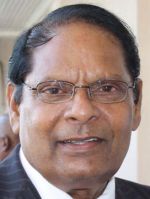
Nagamootoo |
Nagamootoo, Moses (Veerasammy) (b. Nov. 30, 1947, Whim village, British Guiana [now Guyana]), first vice president and prime minister of Guyana (2015-20). He was also senior minister in the Office of the President (1992-93, 1996-2000) and minister of local government (1995-96).
Nagasaki, Kotaro (b. Aug. 18, 1968), governor of Yamanashi (2019- ).
Nagacevschi, Fadei (b. Dec. 30, 1982, Kishinev, Moldavian S.S.R. [now Chisinau, Moldova]), justice minister of Moldova (2019-21).
Nagel, Larion (Timofeyevich), German Ludwig von Nagel (b. 1738 - d. 1808), governor of Irkutsk (1791-97) and governor-general of Livonia and Estonia (1798-1800).
Nagell van Ampsen, Anne Willem Carel baron van (b. Jan. 4, 1756, The Hague, Netherlands - d. Feb. 6, 1851, The Hague), foreign minister of the Netherlands (1814-24). He was also minister to Great Britain (1788-95).
Nagin, Ray, in full Clarence Ray Nagin, Jr. (b. June 11, 1956, New Orleans, La.), mayor of New Orleans (2002-10).
Nagle, Robert T(imo) (b. Jan. 31, 1955), justice minister of Papua New Guinea (1994-95, 1999). He was also minister of housing (1995-97).
Nagmanov, Kazhmurat (Ibrayevich) (b. June 1, 1948, Karpovka, Omsk oblast, Russian S.F.S.R. - d. July 2/3, 2022), head of Dzhezkazgan (1994-96), Vostochno-Kazakhstan (1996-97), and Severo-Kazakhstan (1999-2002) oblasti. He was also mayor of Yermak (1982-87) and Kazakh minister of transport and communications (2002-05).
Nagovitsyn, Iosif (Alekseyevich) (b. Sept. 18 [Sept. 6, O.S.], 1888, Omutnitsa, Vyatka province [now in Udmurtia republic], Russia - d. Nov. 21, 1937, Miskhor, Crimean A.S.S.R., Russian S.F.S.R.), chairman of the Executive Committee of Votyak autonomous oblast (1921-25). He was also chairman of the Votyak Military-Revolutionary Committee (1921) and people's commissar of social security of the Russian S.F.S.R. (1926-37).

V. Nagovitsyn |
Nagovitsyn, Vyacheslav (Vladimirovich) (b. March 2, 1956, Glazov, Udmurt A.S.S.R., Russian S.F.S.R.), president of Buryatia (2007-17).
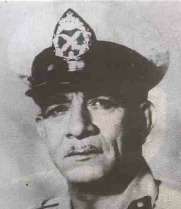
Naguib |
Naguib, Muhammad, also spelled Mohammed Neguib, Arabic Muhammad Najib (b. Feb. 20, 1901, Khartoum, Sudan - d. Aug. 28, 1984, Cairo, Egypt), president of Egypt (1953-54, 1954). A professional soldier, he held various military appointments before World War II. Promoted to colonel, then brigadier, he distinguished himself in the Arab-Israeli war of 1948. He was made a major general in 1951 and by this time had been invited to act as a figurehead for the Free Officers movement, a nationalist military group led by Gamal Abdel Nasser. In January 1952 the Free Officers helped Naguib win election as president of the Egyptian Army Officers Club in opposition to a man backed by King Faruq. The Free Officers engineered a coup that overthrew Faruq that July, and Naguib was presented to the public as the man in control. He became commander-in-chief and, after the resignation of Ali Maher in September over land reform, prime minister. When the republic was declared in June 1953, he became president. But the real power lay with Nasser. A rivalry developed as Naguib, contrary to Nasser and many of the other Free Officers, wanted to see a speedy return to parliamentary government. He also objected to the summary sentences that were passed on various politicians by the Revolutionary Tribunal. In February 1954 he resigned, but dissident members of the Revolutionary Command Council invited him to resume office. Still, Nasser steadily consolidated his own position and became prime minister in April. In October an assassination attempt was made on Nasser in which Naguib was vaguely implicated. In November Naguib was ousted and placed under house arrest, which was eased in 1960 and ended in 1971; he ceased to play any role in Egyptian politics.
Nagy (de Vámos), Emil (b. Nov. 16, 1871, Kaposvár, Hungary - d. Aug. 20, 1956, Budapest, Hungary), justice minister of Hungary (1923-24).
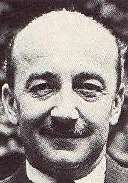
F. Nagy |
Nagy, Ferenc (b. Oct. 8, 1903, Bisse, Hungary - d. June 12, 1979, Fairfax, Va.), prime minister of Hungary (1946-47). He became the national secretary of the Smallholders' Party in 1932 and served in parliament from 1939 to 1942. After the Nazis had taken control of Hungary in World War II, he was jailed by the Gestapo in 1944 but later escaped. In 1945 he became minister of reconstruction in the postwar provisional government and in August was elected president of the Smallholders' Party, which won a majority in parliamentary elections in November. He was speaker of the National Assembly late in 1945 and in 1945-46 served as a member of the High National Council, which exercised the powers of head of state. He then became premier of an anti-Fascist coalition government and tried to build bridges between the Communists, centrist forces, and royalists. His policies, however, were thought by the Soviet-backed Communists to be too conservative, and in May 1947, they engineered his resignation. Perhaps anticipating developments, he had gone on vacation to Switzerland, where he learned of charges that he had plotted against the state. He resigned without returning to Hungary. He moved to the United States in June and was stripped of his Hungarian citizenship in October. He tried to go to Hungary during the uprising of 1956, when the government was headed by moderate Communist Imre Nagy (no relation), but got no farther than Vienna when Soviet tanks crushed the rebels. In 1961-62 he was chairman of the Assembly of Captive European Nations.

I. Nagy |
Nagy, Imre (b. June 7, 1896, Kaposvár, Hungary - d. June 16, 1958, Budapest, Hungary), prime minister of Hungary (1953-55, 1956). Drafted in World War I, he was taken prisoner by the Russians in 1915, but was released during the 1917 revolution and joined the Red Army. In 1919 he played a minor part in Béla Kun's short-lived Communist government and then went underground as a Communist organizer until in 1929 he went to the U.S.S.R. On returning to his country in late 1944 with the Soviet army, he was appointed minister of agriculture in the first postwar Hungarian government. He was interior minister in 1945-46 and president of the National Assembly in 1947-49. He was excluded from the Communist government in 1949 because of his independent attitude but was readmitted after a public recantation. In 1953 he became prime minister, but in 1955 Mátyás Rákosi forced him to resign and he was dismissed from the party central committee. In April 1956 he was expelled from the party, then in October he was readmitted and again became prime minister during a popular uprising against Soviet domination. He took no clear stand at first, but on November 4, when the Soviet army returned to Budapest in strength, he took refuge in the Yugoslav embassy and made a dramatic radio appeal to the West for help. He left the embassy on November 22 under an agreement with the Hungarian government that he would be allowed to go home. However, he was immediately arrested by Soviet security officers and deported to Romania. He was brought back to Budapest in 1957 and tried in secret in June 1958. He was sentenced to death for conspiracy against the people's republic, and was executed. In July 1989, as part of the wave of liberalization occurring in Hungary and Eastern Europe, he was posthumously rehabilitated by the Supreme Court.
Nagy (de Nagybaczon), Vilmos vitéz (b. May 30, 1884, Parajd, Hungary [now Praid, Romania] - d. June 21, 1976, Piliscsaba, Hungary), defense minister of Hungary (1942-43).

A. Al Nahayan |
Nahayan, Sheikh Abdullah ibn Zaid Al, Arabic Shaykh `Abd Allah ibn Zayid Al Nahayan (b. April 30, 1972, Abu Dhabi, United Arab Emirates), foreign minister of the United Arab Emirates (2006- ); son of Sheikh Zaid ibn Sultan Al Nahayan. He was also culture and information minister (1997-2006).
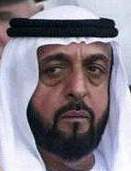
K. Al Nahayan | 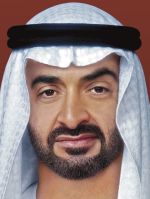
M. Al Nahayan |
Nahayan, Sheikh Khalifa ibn Zaid Al, Arabic Shaykh Khalifa ibn Zayid Al Nahayan (b. 1948, al-`Ayn, Abu Dhabi [now in United Arab Emirates] - d. May 13, 2022), president of the United Arab Emirates and ruler of Abu Dhabi (2004-22); son of Sheikh Zaid ibn Sultan Al Nahayan. He became crown prince of Abu Dhabi on Feb. 1, 1969, and head of the Council of Ministers and defense and finance minister of the emirate in July 1971. Following the establishment of the United Arab Emirates on Dec. 2, 1971, he became deputy prime minister of the federation.
Nahayan, Sheikh Muhammad ibn Zaid Al, also spelled Mohammed bin Zayed ("MbZ") (b. March 11, 1961, al-`Ayn, Abu Dhabi [now in United Arab Emirates]), president of the United Arab Emirates and ruler of Abu Dhabi (2022- ); son of Sheikh Zaid ibn Sultan Al Nahayan; half-brother of Sheikh Khalifa ibn Zaid Al Nahayan. He was already effectively in charge for much of his half-brother's reign, when he was crown prince of Abu Dhabi.
Nahayan, Sheikh Shakhbut ibn Sultan Al, Nahayan also spelled Nahyan, or Nuhayyan, Arabic Shaykh Shakhbut ibn Sultan Al Nahayan (b. 1905, Abu Dhabi [now in United Arab Emirates] - d. Feb. 11, 1989, al-`Ayn, Abu Dhabi, United Arab Emirates), ruler of Abu Dhabi (1928-66); son of Sheikh Sultan ibn Zaid Al Nahayan. As ruler of the largest of the British-controlled Trucial States, he maintained generally friendly relations with the U.K. He quarrelled for several years with Saudi Arabia over the Buraimi oasis. He awarded concessions for Western oil exploration as early as 1939, and the first oil shipment left Abu Dhabi in 1962. He was reluctant to invest his oil earnings (as much as £25 million per year in the mid-1960s) in major development projects. In 1963 he signed a £5 million plan for development, including construction of a modern airport, a 70-km water pipeline, and two new schools. Although he allowed some banks to open, he did not deposit his own funds, hoarding his wealth at home, mostly in gold bullion with a few million dollars in stacks of notes. The story goes that he was persuaded to bank some of his money only when he found that part of his fortune had been nibbled away by rats. His relations with Britain deteriorated when in March 1962 the British awarded the disputed island of Halul to Qatar. According to the British political agent, Shakhbut's personal control of even the smallest detail "would make Louis XIV look like a constitutional monarch." In August 1966, a council of the ruling family replaced Shakhbut with his more progressive younger brother, Sheikh Zaid, who had visited London in July. Shakhbut was exiled to Bahrain, but by 1970 he had returned to Abu Dhabi.
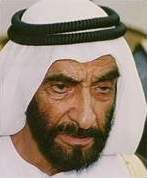
Z. Al Nahayan |
Nahayan, Sheikh Zaid ibn Sultan Al, Zaid also spelled Zayid or Zayed, Nahayan also spelled Nahyan, or Nuhayyan, Arabic Shaykh Zayid ibn Sultan Al Nahayan (b. c. 1918, Abu Dhabi town [now in United Arab Emirates] - d. Nov. 2, 2004, Abu Dhabi), ruler of Abu Dhabi (1966-2004) and president of the United Arab Emirates (1971-2004); son of Sheikh Sultan ibn Zaid Al Nahayan. His brother Sheikh Shakhbut ibn Sultan, who became ruler in 1928, appointed Zaid governor of Abu Dhabi's eastern province in 1946. His popularity helped to defeat a scheme by Saudi Arabia to annex the region. In 1966 he deposed his brother and became ruler. The leaders of the royal family thought him more able than Shakhbut to deal with the changes wrought by the export of oil, which had begun in 1962. He established a government structure and initiated large-scale development projects. As Britain prepared to end its protectorate over the Trucial States, Zaid persuaded five of the six other states to join Abu Dhabi in the U.A.E., a federation with a common foreign policy, which was formed in 1971 (the remaining state joined in 1972). The rulers of the emirates elected Zaid to five-year terms as president of the U.A.E. in 1971, 1976, 1981, 1986, 1991, 1996, and 2001. In a reorganization of the U.A.E.'s federal structure, he brought most of Abu Dhabi's ministries into the federal cabinet in 1973. During his second term he integrated the emirates' defense forces and increased the individual emirates' contributions to the federal budget. One of his primary concerns was to use oil revenues to raise living standards. The image of the U.A.E. was dented by the failure on July 5, 1991, of the Bank of Credit and Commerce International (BCCI), an institution which had been founded in 1972, with Zaid's help, by a Pakistani banker, Aghan Hasan Abadi, and of which the Abu Dhabi government had bought the majority of shares in 1990.
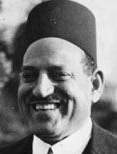
Nahhas |
Nahhas, Mustafa al-, until 1952 Mustafa al-Nahhas Pasha (b. June 15, 1876 [according to other sources, June 5, 1879], Samannud, Egypt - d. Aug. 23, 1965, Alexandria, Egypt), prime minister of Egypt (1928, 1930, 1936-37, 1942-44, 1950-52). Soon after World War I he joined the nationalist Wafd party, assuming its leadership upon Saad Zaghlul's death in 1927. As implacable as his predecessor, he was much less successful in holding his party together. His first prime ministerial term lasted only a few months. He was dismissed by King Fuad I after he introduced legislation demanded by the extreme nationalist wing of the Wafd. Returned to office in 1930, he attempted to curtail the king's power; when Fuad withheld his consent, Nahhas resigned. Appointed prime minister again in 1936, after the death of Fuad, he headed an Egyptian delegation in London and in August signed an Anglo-Egyptian treaty of alliance in response to the Italian invasion of Ethiopia. Continuing friction between the palace and the Wafd was early apparent, as the young king Faruq I disagreed with Nahhas over the king's powers and over international policies; after street brawls between rival youth organizations, Faruq dismissed Nahhas in December 1937. In 1942 the British obliged Faruq, by a show of military force, to appoint Nahhas again as prime minister, due to his pro-Allied position. In October 1944 he presided over the meeting of the Arab states at Alexandria which gave rise to the Arab League. On his return to Cairo he was abruptly dismissed, the British having withdrawn their support from him. His final term began in 1950, by which time the palace and Wafd had come together, which took the brakes off corruption, and popular opposition was growing towards both. Following a day of total disorder in Cairo in January 1952, Faruq once more dismissed Nahhas. After a coup in July the Wafd was broken by the freezing of its funds and Nahhas retired to private life.
Nahles, Andrea (Maria) (b. June 20, 1970, Mendig, Rheinland-Pfalz, West Germany), German politician. She was general secretary (2009-14) and chairman (2018-19) of the Social Democratic Party (SPD) and minister of labour and social affairs (2013-17). In 1995-99 she chaired the SPD youth organization, the Young Socialists (Jusos).
Nahodha, Shamsi Vuai (b. Nov. 20, 1962, Zanzibar [now in Tanzania]), chief minister of Zanzibar (2000-10) and home affairs minister (2010-12) and defense minister (2012-13) of Tanzania.
Nahuys, Petrus Cornelis baron van (b. Aug. 18, 1803, Harderwijk, Batavian Republic [now Netherlands] - d. April 19, 1882, Ermelo, Netherlands), king's commissioner of Overijssel (1869-78).
Nai Shwe Kyin, also known as Nai Ba Lwin (b. March 1, 1908, Pae-ka-dar village, Pa-an township, Burma - d. March 7, 2003, Mawlamyine, Myanmar), Myanmar guerrilla leader. He was active in politics since founding the Mon Freedom League in 1947. He went underground in 1948, the same year that Burma gained independence. The Mons, who live mostly in the east of the country near the Thai border, are one of several ethnic minorities seeking autonomy. Detained by the government in 1948 and again during 1949-51, Nai Shwe Kyin went on to help found the Mon People's Front in 1952 and the New Mon State Party in 1958. The New Mon State Party established a small guerrilla army which suffered from splits in its ranks. It signed a ceasefire agreement with Myanmar's military government in 1995. In 1990 he became president of the National Democratic Front, an umbrella political organization of ethnic groups.
Naidenov, Angel (Petrov) (b. Sept. 28, 1958, Kardzhali, Bulgaria), defense minister of Bulgaria (2013-14). He was also governor of Haskovo oblast (1995-97).
Naidenov (Dragnev), Radi (b. June 22, 1895, Burkach, Bulgaria - d. Jan. 14, 1985), justice minister of Bulgaria (1946-62).

R. (D.) Naidenov |
Naidenov, Radi (Dragnev) (b. Aug. 24, 1962, Sofia, Bulgaria), foreign minister of Bulgaria (2017); grandson of the above. He has also been ambassador to Austria (2005-12), Germany (2012-17), and Switzerland (2019- ).
Naidu, Amraiya (b. 1941, Fiji), Fijian diplomat. He was permanent representative to the United Nations (1999-2003).
Naidu, M(uppavarapu) Venkaiah (b. July 1, 1949, Chavatapalem, Nellore district, Madras [now in Andhra Pradesh], India), vice president of India (2017-22). He was also minister of rural development (2000-02), urban development, housing, and urban poverty alleviation (2014-17), parliamentary affairs (2014-16), and information and broadcasting (2016-17) and president of the Bharatiya Janata Party (2002-04).
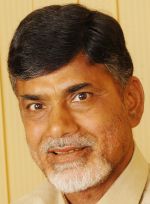
N.C. Naidu |
Naidu, Nara Chandrababu (b. April 20, 1950, Naravaripally village, Chittoor district, Madras state [now in Andhra Pradesh], India), chief minister of Andhra Pradesh (1995-2004, 2014-19). He was elected to the Andhra Pradesh state legislative assembly in 1978 as a Congress Party member and served as a minister in the state cabinet in 1980-83. During this period he married the daughter of N.T. Rama Rao, the founder of the Telugu Desam Party (TDP). He joined the TDP in 1983 and became its general secretary in 1985. Although he did not hold a portfolio in Rao's 1983-89 government, he came to wield considerable clout within the party. When the TDP was out of power in 1989-94, he served as party coordinator, his skillful work being a key factor in the success of the TDP in the state elections of 1994, after which he became finance minister. In 1995 he staged an intraparty coup against his father-in-law to counter the rising influence of Lakshmi Parvathi, Rao's second wife. He mustered a majority of the party to his side, forcing Rao to resign, and became chief minister in his place. He continued to strengthen the party, and in the 1996 Indian parliamentary elections the TDP made significant gains. In the 1999 elections, the TDP took 29 seats in the Lok Sabha, a performance that solidified his reputation as a leader to be reckoned with; he also won a second term as chief minister of Andhra Pradesh. He let the U.S. consultancy McKinsey write a development program on neoliberal lines and won the praises of Western leaders. He was viewed as a future prime minister by many political analysts. But while he transformed the state into an information technology hub he left millions in desperate poverty; many small farmers committed suicide. In the 2004 state elections his government was heavily defeated. He again became chief minister in 2014, after the state was reduced in size by the separation of Telangana; he was defeated again in 2019.
Naidu, Padmaja (b. Nov. 17, 1900, Hyderabad, India - d. May 2, 1975, New Delhi, India), governor of West Bengal (1956-67); daughter of Sarojini Naidu.

S. Naidu |
Naidu, Sarojini, née Chattopadhyay (b. Feb. 13, 1879, Hyderabad, India - d. March 2, 1949, Lucknow, India), Indian politician. After some experience in the suffragist campaign in England, she was drawn to India's Congress movement, addressing the All-India Social Conference in Calcutta in 1905. In 1919 she joined Mohandas Gandhi's non-cooperation movement against British rule. In 1924 she traveled in eastern Africa and South Africa in the interest of Indians living there and in 1925 she became the first Indian woman to be elected president of the Congress (the first woman was the English feminist Annie Besant eight years earlier). In 1928-29 she toured North America, lecturing on the Congress movement. She was jailed several times for her anti-British activity (1930, 1932, and 1942-43). In 1931 she accompanied Gandhi to London for the inconclusive second session of the Round Table Conference for Indian-British cooperation. Following the outbreak of World War II she supported the Congress Party's policies, first of aloofness, then of avowed hindrance to the Allied cause. Upon independence in 1947 she became governor of the United Provinces (later Uttar Pradesh), a post she retained until her death. Sarojini Naidu, "the Nightingale of India," also led an active literary life and presided over a famous intellectual salon in Bombay.
Naif (ibn Abdullah al-Hashimi), Arabic Na´if ibn `Abd Allah (b. Nov. 14, 1914, al-Ta´if, Hejaz [now in Saudi Arabia] - d. Oct. 12, 1983, Amman, Jordan), regent of Jordan (1951); son of Abdullah I.
Naif, Abdul Razzak (Said) al-, Arabic `Abd al-Razzak (Sa`id) al-Na´if (b. 1933 - d. [assassinated] July 9, 1978, London, England), prime minister of Iraq (1968).
Naik, Niaz A(hmad) (b. May 31, 1926 - d. [murdered?] Aug. 5?, 2009, Islamabad, Pakistan), Pakistani diplomat. He was permanent representative to the United Nations (1978-82), foreign secretary (1982-86), and ambassador to France (1986-88) and India (1988-89).
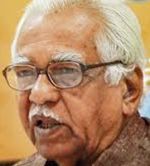
Ram Naik | 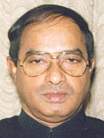
Ravi Naik |
Naik, Ram (b. April 16, 1934, Sangli [now in Maharashtra], India), governor of Uttar Pradesh (2014-19) and Rajasthan (2014). He was also Indian minister of state (independent charge) for railways (1999) and minister of petroleum and natural gas (1999-2004).
Naik, Ravi (Sitaram) (b. Sept. 18, 1946, Ponda, Goa, Portuguese India [now in India]), chief minister of Goa (1991-93, 1994).
Naik, Sudhakarrao (Rajusing) (b. Aug. 21, 1934, Gahuli, Yeotmal district, Berar [now Yavatmal district, Maharashtra], India - d. May 10, 2001, Mumbai, India), chief minister of Maharashtra (1991-93) and governor of Himachal Pradesh (1994-95); nephew of Vasantrao Naik.
Naik, Vasantrao (Phulsing) (b. July 1, 1913, Gahuli, Yeotmal district, Berar [now Yavatmal district, Maharashtra], India - d. Aug. 18, 1979, Singapore), chief minister of Maharashtra (1963-75).
Nail, Louis (Léon Jules) (b. Sept. 27, 1864, Château-Gontier [now Château-Gontier-sur-Mayenne], Mayenne, France - d. [automobile accident] Oct. 25, 1920, Paris, France), justice minister of France (1917-20). He was also mayor of Lorient (1904-12).

E. Nailatikau |
Nailatikau, Ratu Epeli (b. July 5, 1941, Levuka, Ovalau island, Fiji), foreign minister (2007-08) and president (2009-15) of Fiji; grandson of George Tupou II; great-great-grandson of Seru Epenisa Cakobau. He was also commander of the military forces (1982-87), high commissioner to the United Kingdom (1988-96), roving ambassador and high commissioner in the Pacific (1998-99), deputy prime minister and minister of Fijian affairs (2000-01), speaker of the House of Representatives (2001-06) and the unicameral parliament (2019-22), minister of provincial development and multiethnic affairs (2008-09), and vice president (2009).
Nailatikau, Koila Mara (b. 1953), Fijian politician; daughter of Ratu Sir Kamisese Mara; wife of Ratu Epeli Nailatikau. She was minister of tourism (1999-2000).
Naim Khan, Mohammad (b. 1910 - d. [killed] April 27, 1978), foreign minister of Afghanistan (1953-63); son of Sardar Mohammad Aziz Khan. He was also minister to Italy (1932-34) and the United Kingdom (1946-47), minister of education (1937-46), and ambassador to the United States (1948-50).
Naimi, Ali (ibn Ibrahim) al- (b. Aug. 2, 1935, Rakah, Saudi Arabia), Saudi oil minister (1995-2016). He was also president of Saudi Aramco (1984-95).
Nair, P(adayatt) K(esavapillai) Vasudevan (b. March 2, 1926, Kidangoor, Kottayam division, Travancore [now in Kottayam district, Kerala], India - d. July 12, 2005, New Delhi, India), chief minister of Kerala (1978-79).
Nair, P(arameswaran) M(adhavan) (b. Oct. 18, 1944, Edappally [now in Kerala], India), administrator of Lakshadweep (1978-81).
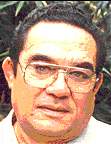
Naisali |
Naisali, Henry (Faati) (b. Dec. 8, 1928, Nukulaelae Atoll, Gilbert and Ellice Islands [now in Tuvalu] - d. mid-October 2004, Auckland, New Zealand), deputy prime minister and finance minister of Tuvalu (1981-85), director of the South Pacific Bureau for Economic Cooperation (1986-88), and secretary-general of the South Pacific Forum (1988-92).
Najamudin, Agusrin M(ariyono) (b. Aug. 8, 1971, Bengkulu, Indonesia), governor of Bengkulu (2005-12).
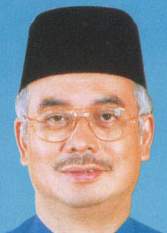
Najib |
Najib (bin) Tun (Haji Abdul) Razak, Datuk Seri (Mohamed) (b. July 23, 1953, Kuala Lipis, Pahang, Malaya [now in Malaysia]), deputy prime minister (2004-09) and prime minister (2009-18) of Malaysia; son of Tun Abdul Razak bin Hussein; grandson of Tan Sri Mohamed Noah Omar; nephew-in-law of Datuk Hussein bin Onn. He took his late father's place in parliament in 1976 and was appointed deputy minister of energy, telecommunication, and post in 1978, at age 25. After a stint as chief minister of Pahang (1982-86), he returned to federal-level politics and became one of the rising stars within the United Malays National Organization (UMNO). He was minister of culture (1986-87), youth and sports (1986-90), defense (1990-95, 1999-2008), education (1995-99), and finance (2008-18). As defense minister, he set up the Malaysian Armed Forces Department for Veteran Affairs in 2001. In 2003 he was instrumental in introducing the National Service, aimed at instilling patriotism among youths and students. In 2004 he was appointed deputy prime minister by Prime Minister Abdullah Ahmad Badawi and also became deputy president of UMNO. He received the titles Orang Kaya Indera Shahbandar (1976), Dato' (Oct. 23, 1978; 1983; 1990), Dato' Seri (Oct. 24, 1985), Datuk (September 1990), Dato' Seri DiRaja (April 10, 2004), and Datuk Seri (Dec. 11, 2004). In 2008, following election losses for UMNO, Abdullah announced that Najib would succeed him. In 2009 he won the UMNO presidency unopposed and then became prime minister. He won the 2013 elections but suffered a humiliating fall from grace in 2018 when former UMNO prime minister Mahathir bin Mohamad, 92, came out of retirement, formed an opposition alliance, and successfully challenged him, prompted by a scandal in which Najib and others were accused of siphoning off billions of dollars from a state development fund known as 1MDB. In July 2018, soon after leaving office, he was arrested and charged with corruption; he was found guilty in July 2020.
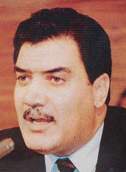
Najibullah |
Najibullah (Ahmadzai), Mohammad, in 1986-87 also known simply as Najib (b. Aug. 6, 1947, Gardez, Paktia province, Afghanistan - d. Sept. 27, 1996, Kabul, Afghanistan), president of Afghanistan (1987-92). He joined the Parcham ("Banner") faction of the (Communist) People's Democratic Party of Afghanistan (PDPA) in 1965 and was twice imprisoned for political activities. The PDPA staged a successful coup in 1978, but the Khalq ("People's") faction soon gained supremacy, and Najibullah briefly served as ambassador to Iran, but was fired for allegedly plotting the overthrow of the regime of Hafizullah Amin. He went into exile in Eastern Europe until the U.S.S.R. intervened (1979) and supported a Parcham-dominated government. He was made head of the secret police (Khad) and acquired a reputation of brutality and ruthlessness among the Islamic guerrillas who fought against the regime. In May 1986 Major General Najibullah was made general secretary of the PDPA, replacing Babrak Karmal. In December 1986, he became head of a commission writing a new constitution, and under that constitution he became president in November 1987. Karmal's Parcham faction was broadly based, and Karmal's rule had given the Soviet-imposed government the credibility it sought. However, Karmal was too nationalistic, while Najibullah showed total commitment to the U.S.S.R. As the guerrilla war grew in intensity, the Soviet Union pulled its troops out in 1989. Najibullah proved Western predictions of his regime's imminent collapse wrong and managed to hang on to power for nearly three more years, attempting to gain support by relaxing his strict control, but in 1992 he was finally forced from office by the rebels. He took refuge in a UN compound. Factional fighting continued, and when the Taliban militia took over Kabul in 1996, they summarily executed Najibullah.
Nakagawa, Ichiro (b. March 9, 1925, Hokkaido, Japan - d. Jan. 9, 1983, Sapporo, Hokkaido, Japan), Japanese politician. He emerged as one of the country's most colourful figures and became a member of the lower house of the Diet (parliament) in 1963. A decade later, intent on furthering his career, he formed a secretive ultraconservative group called the Seirankai (Blue Storm Society), whose 31 members helped one another advance in the ruling Liberal-Democratic Party (LDP). During the late 1970s the club disbanded, but Nakagawa had already established a foothold in the party and in 1982 was the youngest of four candidates for the presidency of the LDP. Nakagawa, who placed last in the election, became deeply depressed and took his own life by hanging himself with his kimono sash.
Nakagawa, Shoichi (b. July 19, 1953, Tokyo, Japan - d. Oct. 4, 2009, Tokyo), finance minister of Japan (2008-09); son of Ichiro Nakagawa. He was also minister of agriculture, forestry, and fisheries (1998-99, 2005-06) and economy, trade, and industry (2003-05).
Nakagawa, Toru (b. March 30, 1911, Tokyo, Japan - d. Aug. 31, 2001, Tokyo), Japanese diplomat. He was ambassador to Italy (1964-65) and the Soviet Union (1965-71) and permanent representative to the United Nations (1971-73).
Nakai, Sardar (Mohammad) Arif (b. 1929 - d. Feb. 29, 2000, Lahore, Pakistan), chief minister of Punjab (Pakistan) (1995-96).
Nakaima, Hirokazu (b. Aug. 19, 1939, Osaka, Japan), governor of Okinawa (2006-14).
Nakamura, Hodo (b. Nov. 29, 1950), governor of Nagasaki (2010-22).

K. Nakamura | 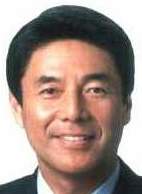
H. Nakasone |
Nakamura, Kuniwo (b. Nov. 24, 1943, Peleliu, Palau - d. Oct. 14, 2020), vice president (1989-92) and president (1993-2000) of Palau.
Nakamura, Tokihiro (b. Jan. 25, 1960), governor of Ehime (2010- ).
Nakaoki, Yutaka (b. Sept. 16, 1927 - d. June 24, 2018, Toyama, Japan), governor of Toyama (1980-2004).
Nakashidze, Knyaz (Prince) Aleksandr (Davidovich) (b. 1837 - d. Oct. 8 [Sept. 25, O.S.], 1905), governor of Yelizavetpol (1880-97).
Nakashidze, Knyaz (Prince) Mikhail (Aleksandrovich) (b. Sept. 8 [Aug. 27, O.S.], 1873, Moscow, Russia - d. Aug. 25 [Aug. 12, O.S.], 1906, St. Petersburg, Russia), governor of Baku (1904-05); son of Knyaz Aleksandr Nakashidze. He was killed in a bomb attack whose main target was Prime Minister Pyotr Stolypin, who survived.
Nakasone, Hirofumi (b. Nov. 28, 1945), foreign minister of Japan (2008-09); son of Yasuhiro Nakasone. He was also minister of education (1999-2000).
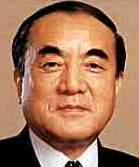
Y. Nakasone |
Nakasone, Yasuhiro (b. May 27, 1918, Takasaki, Gunma prefecture, Japan - d. Nov. 29, 2019, Tokyo, Japan), prime minister of Japan (1982-87). In April 1947 he was first elected to the lower house of the Diet (parliament), becoming one of the youngest persons ever to hold a seat in that body. He held several cabinet posts beginning in 1959, including that of transport (1967-68), defense (1970-71), and international trade and industry (1972-74). After Prime Minister Zenko Suzuki resigned (1982), Nakasone, an ally of the powerful Kakuei Tanaka, won a four-way contest to become the president of the dominant Liberal-Democratic Party (LDP) and thus prime minister. In 1983 Tanaka was convicted of bribery and violations of the foreign exchange law, causing an uproar that forced Nakasone to call early elections. The LDP lost its absolute majority, and it was only after a small conservative party agreed to form a coalition with the LDP that he was reelected as prime minister. In 1986, however, he led the LDP to a spectacular victory in the national elections, and made political history by having his tenure as party president (and hence as prime minister) extended by one year, though he was not granted a third term. Japan continued its sustained economic growth under his administration and became the world's largest creditor nation. In foreign affairs he sought to strengthen Japan's ties with the United States. In May 1989 he was forced to resign formally from the LDP - though he remained in the Diet - to take responsibility for an influence-peddling scandal which occurred when he was in office. He rejoined the LDP in April 1991 and was named a senior party adviser in November. He did not stand again for the Diet in 2003 due to a new party policy setting an age limit of 73 for candidates (he was 85).
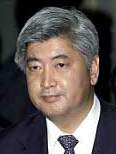
Nakatani | 
Taro Nakayama | 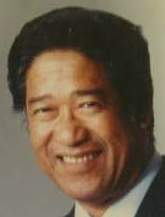
Tosiwo Nakayama |
Nakatani, Gen (b. Oct. 14, 1957, Kochi, Japan), defense minister of Japan (2001-02, 2014-16).
Nakayama, Masao (b. 1941, Truk, Caroline Islands [now Chuuk, Federated States of Micronesia] - d. Nov. 13, 2011, Nevada), Micronesian diplomat. He was ambassador to Japan (1989-97), China (1992-97), and Singapore (1993-97) and permanent representative to the United Nations (1998-2011).
Nakayama, Taro (b. Aug. 27, 1924, Osaka, Japan), foreign minister of Japan (1989-91).
Nakayama, Tosiwo (b. Nov. 23, 1931, Piserach, Truk, Caroline Islands [now Chuuk, Federated States of Micronesia] - d. March 29, 2007, Ewa Beach, Honolulu, Hawaii), president of the Federated States of Micronesia (1979-87).
Nakhai, Hossein Ghods (b. 1902, Tehran, Iran - d. ...), foreign minister of Iran (1961-62). Also a poet, he was ambassador to Iraq (1951, 1953), Japan (1956-58), the United Kingdom (1958-61), the United States (1962-63), and the Vatican (1966-70) and minister of the imperial court (1963-66).
Nako, Andrea (b. Sept. 14, 1934, Leskovik, near Kolonjë, Albania), finance minister of Albania (1985-90). He was also director of the State Bank (1984-85).
Nako, Charlie, home affairs minister of Vanuatu (1991-95, 1996).
Nakoniecznikow-Klukowski, Bronislaw Franciszek (b. Oct. 17, 1888, Warsaw, Poland - d. Jan. 7, 1962, Warsaw), governor of Stanislawowskie (1928-30), Lwowskie (1930-31), and Warszawskie (1934-38) województwa. He was also Polish minister of agriculture and agrarian reform (1933-34).
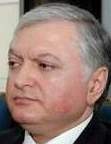
Nalbandyan |
Nalbandyan, Eduard (Agvani), Eduard also spelled Edvard (b. July 16, 1956, Armenian S.S.R.), foreign minister of Armenia (2008-18). He was Armenia's chargé d'affaires (1992-93) and ambassador (1994-98) to Egypt (also accredited to Morocco and Oman). In 1999-2008 he was ambassador to France (also accredited to Israel from 2000, the Vatican from 2001, and Andorra from 2004).
Nalda García, José Constantino (b. Aug. 5, 1939, Valladolid, Spain), president of the Junta of Castilla-León (1986-87).
Nali, Michael (Buku) (b. Aug. 8, 1964), deputy prime minister of Papua New Guinea (1997-98). He was also minister of civil aviation, culture, and tourism (1995-97), trade and tourism (1997), trade and industry (1997-98, 1999-2000), lands and physical planning (2003), commerce and trade (2007), and works (2017-22).
Nalibayev, Nurlybek (Mashbekovich) (b. 1976), head of Kyzylorda oblast (2022- ). He was also mayor of Kyzylorda (2013-21).
Nallet, Henri (Pierre) (b. Jan. 6, 1939, Bergerac, Dordogne, France), justice minister of France (1990-92). He was also minister of agriculture (1985-86) and agriculture and forests (1988-90).
Nalyvaichenko, Valentyn (Oleksandrovych) (b. June 8, 1966, Zaporozhye [Zaporizhzhya], Ukrainian S.S.R.), Ukrainian politician. He was ambassador to Belarus (2006), head of the Security Service of Ukraine (2006-10, 2014-15), and a minor presidential candidate (2019).
Nam Duck Woo (b. Oct. 10, 1924, suburban Seoul, Korea [now in South Korea] - d. May 18, 2013, Seoul), finance minister (1969-74) and prime minister (1980-82) of South Korea. He was also a deputy prime minister and minister of economic planning (1974-78).
Namah, Belden (Norman) (b. Dec. 30, 1968), deputy prime minister of Papua New Guinea (2011-12). He was also minister of forestry and natural resources (2007-10, 2011-12), leader of the opposition (2012-14), and governor of Sandaun (in opposition, 2015).

Namaliu |
Namaliu, Sir Rabbie (Langanai) (b. April 3, 1947, Raluana, East New Britain, Papua New Guinea), prime minister of Papua New Guinea (1988-92). He moved into the political arena with his appointment as principal private secretary to Chief Minister Michael Somare, who became prime minister at independence in 1975. Namaliu remained in government employment, serving as a district commissioner and as chairman of the Public Service Commission, until he was elected to parliament representing Kokopo on New Britain in 1982. In parliament he was a member of Pangu Pati and held the portfolios of foreign affairs (1982-84) and primary industry (1984-85). His rise to power had its origins in the instability of the government of Prime Minister Paias Wingti, which was weakened by internal divisions and embarrassed by a major timber scandal. In connection with the latter, a commission of inquiry announced findings of corruption and perjury against Ted Diro, leader of the People's Action Party, a coalition partner of Wingti. Faced by a vote of no confidence and the defection of Diro and his supporters, Wingti tried to form a coalition with Somare. This failed; Somare retired and was replaced as leader of the Pangu Pati by Namaliu. A further attempt by Wingti to join with the Pangu Pati also failed, and on July 4, 1988, a little more than one week after becoming leader of the opposition, Namaliu was sworn in as prime minister. His two main objectives were to secure constitutional amendments that would help to generate stability in the nation's politics - a move that had the full support of the parliamentary opposition - and a renewed attempt to grapple with the country's law and order problem. He was speaker of parliament in 1994-97, was knighted in 1996, was minister of petroleum and gas in 1998-99, foreign minister again in 2002-06, and treasurer in 2006-07. He lost his seat in 2007.
Nambiar, Vijay (Kumar) (b. August 1943, Poona [now Pune], India), Indian diplomat. He was ambassador to Algeria (1985-88), Afghanistan (1990-92), Malaysia (1993-96), China (1996-2000), and Pakistan (2000-01) and permanent representative to the United Nations (2002-04).
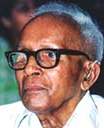
Namboodiripad |
Namboodiripad, E(lamkulam) M(anakkal) Sankaran (b. June 13, 1909, Palghat [now Palakkad] district, Madras province [now in Kerala state], India - d. March 19, 1998, Thiruvananthapuram, Kerala), Indian politician. "EMS," as he was popularly called by his party colleagues, headed the world's first democratically elected Communist government in the southern coastal state of Kerala from 1957 to 1959 until its dismissal by the federal government. Namboodiripad was the general secretary of the Communist Party of India (Marxist), the country's main Communist party, between 1978 and 1992 and helped India's leftist movement gain strength by cooperating with moderate socialists and regional groups. The Marxist leader was admired even by political rivals, including the Hindu nationalists of whom he was bitterly critical.
Namgyal, Palden Thondup (dPal-ldan Don-grub rNam-rgyal) (b. May 22, 1923, Gangtok, Sikkim [now in India] - d. Jan. 29, 1982, New York City), king of Sikkim (1963-75). At the time of his birth he was proclaimed a living saint and spiritual head of the Phodong and Rumtek monasteries. He was trained as a monk but when his elder brother was killed in an airplane crash, Palden Thondup became heir apparent. After being educated at the administrative college in Dehra Dun, India, he served as an adviser to his father and led the Sikkimese delegation that negotiated the 1950 treaty with India. Six years after the death (1957) of his first wife, Palden Thondup defied Buddhist tradition and made international headlines by marrying New York socialite Hope Cooke. During his reign he and his consort sought to modernize the Himalayan kingdom with roads, schools, and hospitals. In 1973 he lost power when he pressed too hard for Sikkimese autonomy. In 1975 he was formally deposed, the monarchy was abolished, and on April 10 Sikkim became the 22nd state of India. After the uprising his wife returned to the U.S. The couple divorced in 1980.
Namgyel, Kunzang C(hoden), Bhutanese diplomat. She was permanent representative to the United Nations (2014-17).

Nami |
Nami, Özdil (b. May 23, 1967, London, England), foreign minister of North Cyprus (2013-15). He was also minister of economy and energy (2018-19).
Nami Bey, Damad-i Shahriyari Ahmad (b. 1873, Beirut, Lebanon - d. Dec. 13, 1962, Beirut), head of state of Syria (1926-28).
Namir, Mordechai, original surname Nemirovsky (b. Feb. 23, 1897, Bratolinbovka, Russia [now in Ukraine] - d. Feb. 22, 1975, Tel Aviv, Israel), Israeli politician. He was minister of labour (1956-59) and mayor of Tel Aviv (1959-69).
Namir, Ora, née Toib (b. Sept. 1, 1930, Hadera, Palestine [now in Israel] - d. July 7, 2019, Tel Aviv, Israel), Israeli politician; wife of Mordechai Namir. She was minister of environment (1992) and labour and social welfare (1992-96) and ambassador to China and Mongolia (1996-2000).
Namoloh, Charles (Dickson Ndaxu Phillip) (b. Feb. 28, 1950, Odibo, Ohangwena region, South West Africa [now Namibia]), defense minister of Namibia (2005-12). He was also ambassador to Angola (1995-2003), high commissioner to India (2003-05), and minister of regional and local government, housing, and rural development (2012-15) and safety and security (2015-20).

Namphy |
Namphy, Henri (b. Nov. 2, 1932, Cap-Haïtien, Haiti - d. June 26, 2018, Dominican Republic), head of state of Haiti (1986-88, 1988). Following the fall of the government headed by President-for-Life Jean-Claude Duvalier, who fled the country with his family in 1986, Lieutenant General Namphy became president of the interim governing council, made up of six civilian and military members. His selection was not surprising. He was widely liked and respected and had a reputation for being honest and apolitical. His early weeks in power were traumatic as Haitians ceased their jubilant celebrations over the departure of Duvalier and started rioting and looting. In March, as violence swept the capital, Port-au-Prince, the most popular member of the council resigned as justice minister and Namphy dismissed three other members who had close ties with the Duvalier regime. The new council had two other members apart from Namphy himself. The council had difficulty in exerting its authority throughout the year because of frequent strikes and demonstrations. Observers at home and abroad regarded Namphy and his government as ineffective. At the same time, there was no alternative, and an election held in October for a constituent assembly to prepare a draft constitution reflected a lack of public interest in determining the country's political future. Namphy was unusual in his lack of political ambition. From the start of his presidency he made it clear that he would hand over power to an elected president. His lack of political dynamism possibly explained why support for him was waning. In January 1988 presidential elections were won by Leslie Manigat, but in June Namphy deposed him after Manigat had dismissed Namphy as army commander. In September Namphy was himself deposed by a group of young officers.
Namsinov, Ilya (Yevgenyevich) (b. June 15, 1920, Mechetinsky rayon, Don oblast [now in Rostov oblast], Russia - d. Dec. 28, 2010, Elista, Kalmykia, Russia), chairman of the Presidium of the Supreme Soviet of the Kalmyk A.S.S.R. (1974-84).
Namwizi Mankoy, originally Louis Namwizi, finance minister of Congo (Kinshasa) (1969-70, 1970-72). He was also minister of economy (1969, 1970).
Nanasbaye, Abdoul Boukar (b. 1934), Chadian diplomat. He was ambassador to Nigeria (1961-64), the United States (1964-68), and the Soviet Union (1969-74), permanent representative to the United Nations (1965-68), and minister of information (1979-82).
Nanayakkara, Hemakumara (Wickramathilaka) (b. 1953, Galle, Ceylon [now Sri Lanka]), governor of Southern province (2015-18) and Western province (2018-19), Sri Lanka. He was also minister of agriculture technology and productivity (2003-04) and agriculture (2007-10).

Nanda | 
Nandi-Ndaitwah |
Nanda, Gulzarilal (b. July 4, 1898, Badoki Gosain village, Gujranwala, India [now in Pakistan] - d. Jan. 15, 1998, Ahmedabad, India), home affairs minister of India (1963-66). He twice served briefly as interim prime minister, following the deaths of Jawaharlal Nehru (1964) and Lal Bahadur Shastri (1966). He was also minister of planning (1951-63), irrigation and power (1951-57), labour (1957-63), and railways (1970-71).
Nandi-Ndaitwah, Netumbo (Ndemupelila) (b. Oct. 29, 1952, Onamutai, Oshana region, South West Africa [now Namibia]), foreign minister (2012- ) and deputy prime minister (2015- ) of Namibia. Earlier she was minister of women affairs and child welfare (2000-05), information and broadcasting (2005-10), and environment and tourism (2010-12).

Nandigna | 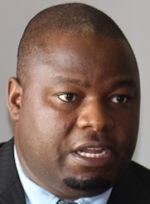
Nankhumwa |
Nandigna, (Maria) Adiato Djaló (b. Nov. 6, 1958, Canchungo, Portuguese Guinea [now Guinea-Bissau]), foreign minister (2009), acting prime minister (2012), and defense minister (2015-16) of Guinea-Bissau. She was also minister of culture, youth, and sports (2007-09) and fisheries (2018-20).
Nando, Sheikh Khalifa (Usman) (b. 1941? - d. Feb. 5, 2023, Davao City, Philippines), wali of Bangsamoro (2019-23).
Nandoe, Kriesnadath (b. June 14, 1935, Dutch Guiana [now Suriname]), Surinamese diplomat. He was chargé d'affaires in Brazil (1983-85) and permanent representative to the United Nations (1989-97).
Nanjappa, Venkatasubramani (b. Jan. 26, 1911 - d. ...), chief commissioner of Cooch Behar (1949-50) and Tripura (1951-55).
Nankhumwa, Kondwani (b. July 3, 1978), foreign minister of Malawi (2020). He was also minister of information, tourism, and civic education (2014-15), local government and rural development (2015-19), and agriculture, irrigation, and water development (2019-20).
Nannestad, Mathias Bonsach Krogh (b. Oct. 14, 1815, Storfosen [now in Ørland municipality], Søndre Trondhjems amt [now in Trøndelag fylke], Norway - d. March 17, 1878, Drøbak, Akershus [now in Viken], Norway), governor of Tromsø stift (1858-69), Finmarkens amt (1858-66), and Tromsø amt (1866-69).

Nano |
Nano, Fatos (Thanas) (b. Sept. 16, 1952, Tiranë, Albania), prime minister of Albania (1991, 1997-98, 2002-05). Having also been a deputy premier (1991) and minister of foreign economic relations (1991), he became leader of the Socialist Party in June 1991. He was arrested July 30, 1993, and sentenced on April 3, 1994, to 12 years' imprisonment for embezzlement and other offenses; he denied the charges. During the revolt against Pres. Sali Berisha's rule in March 1997, he was released from jail, was pardoned by Berisha (March 15), and again took the lead of his party. After June 1997 elections he returned to the post of prime minister, heading a left-centre coalition. Instability continued, and he resigned in September 1998. In February 1999 he also resigned as Socialist Party chairman, but he was reelected to that position in October 1999, causing the resignation of his successor as prime minister, Pandeli Majko. Majko's successor, Ilir Meta, also resigned (in 2002) after Nano accused his government of corruption and incompetence. For some months Majko returned to office, until he resigned again to settle the bickering within the party, and Nano became prime minister a third time. After the defeat of the Socialist Party in the 2005 elections, he resigned as party leader.
Nansen, Fridtjof (b. Oct. 10, 1861, Store Frøen, near Kristiania [now Oslo], Norway - d. May 13, 1930, Lysaker, near Oslo), Norwegian diplomat. Famous as an explorer, he was minister to the United Kingdom (1906-08) and League of Nations high commissioner for refugees (1921-30). He was awarded the Nobel Peace Prize in 1922.

Napat |
Napat, Jotham (b. Aug. 7, 1972), foreign minister of Vanuatu (2022- ). He was also minister of infrastructure and public utilities (2016-18) and deputy prime minister and minister of tourism, commerce, trades, and ni-Vanuatu business (2019-20).
Nape, Jeffery (b. 1964 - d. July 8, 2016, Port Moresby, Papua New Guinea), acting governor-general of Papua New Guinea (2004, 2010). He was speaker of parliament (2004-12).
Napier, Sir (Thomas John) Mellis (b. Oct. 24, 1882, Dunbar, East Lothian, Scotland - d. March 22, 1976, Kingswood, near Adelaide, S.Aus.), acting governor of South Australia (1944, 1952-53, 1960-61, 1968, 1971); knighted 1943. He was chief justice (1942-67) and lieutenant governor (1942-73).
Napier and Ettrick, Francis Napier, Baron (b. Sept. 15, 1819, Thirlestane Castle, Selkirkshire, Scotland - d. Dec. 19, 1898, Florence, Italy), governor of Madras (1866-72) and acting viceroy of India (1872). He was also British minister to the United States (1857-58), the Netherlands (1858-60), Russia (1860-64), and Prussia (1864-66). He succeeded as (10th) Baron Napier of Merchistoun in 1834 and was created (1st) Baron Ettrick in July 1872, becoming known as Baron Napier and Ettrick.
Napier of Magdala, Robert Cornelis Napier, (1st) Baron (b. Dec. 5, 1810, Colombo, Ceylon [now Sri Lanka] - d. Jan. 14, 1890, London, England), acting viceroy of India (1863) and governor of Gibraltar (1876-83). He was knighted in 1858 and created a baron in 1868.
Napieralski, Grzegorz (Bernard) (b. March 18, 1974, Szczecin, Poland), Polish presidential candidate (2010). He was chairman of the Democratic Left Alliance (2008-11).

Napoléon I |
Napoléon I, in full Napoléon Bonaparte, original Italian Napoleone Buonaparte, byname the Corsican (le Corse), or the Little Corporal (le Petit Caporal) (b. Aug. 15, 1769, Ajaccio, Corsica [now in France] - d. May 5, 1821, St. Helena), first consul (1799-1804) and emperor (1804-14, 1815) of France. In 1791 he joined the Jacobin club and soon became its president, making speeches against nobles and clerics. In 1793 he was given a command at the siege of Toulon and quickly defeated the royalists there who were aided by a British fleet in the harbour. He was rewarded by a speedy promotion to brigadier general. In 1796 he became commander of the Army of Italy and in quick succession achieved victories over the Sardinians and Austrians. In 1798 his forces took Malta and the Nile delta, but his first defeat came when his fleet was destroyed by the British navy. Arriving back in France, he joined Emmanuel Sieyès in planning a coup, which was carried out on Nov. 10, 1799; the Directory was abolished and a Consulate established with Napoléon as one of three equal members. Soon afterward he became first consul. An 1802 referendum made him first consul for life, and in 1804 he was crowned emperor. In 1805 he made himself also king of Italy (having already been president of the Italian Republic from 1802), and he put relatives in charge of various vassal states; he himself was also grand duke (1808-09) and regent (1809-13) of Berg and Cleves. The beginning of the end came when his invasion of Russia in 1812 ended in a disastrous retreat. Under attack from all sides, he announced his abdication in April 1814 and was exiled to the island of Elba, of which he was made sovereign. A year later, however, he returned to Paris and was reinstated as emperor. But when British forces, reinforced by Prussians, defeated the French at Waterloo, he had to abdicate for a second time, and this time was exiled to St. Helena in the South Atlantic. The Code Napoléon and other Napoleonic institutions still persist, as does his reputation as one of the greatest military commanders of all time.
Napoléon II: see Reichstadt, Napoléon François Charles Joseph Bonaparte, Herzog von.

Napoléon III |
Napoléon III, also called (until 1852) (Charles) Louis-Napoléon Bonaparte (b. April 20, 1808, Paris, France - d. Jan. 9, 1873, Chislehurst, Kent, England), president (1848-52) and emperor (1852-70) of France; brother of Napoleon Lodewijk II; nephew of Napoléon I. He was the third son of Napoléon's brother Louis Bonaparte (Lodewijk I Napoleon) and his wife, Hortense de Beauharnais Bonaparte. He took part in an unsuccessful plot against the papal government in Rome in 1830 and in the rebellion in central Italy in 1831. After the death in 1832 of his cousin the Duke of Reichstadt (Napoléon I's only son), Louis-Napoléon considered himself his family's claimant to the French throne. Convinced that as Napoléon's nephew he would be popular with the French army, he led two unsuccessful coup attempts, one at Strasbourg in 1836, when he was exiled by King Louis-Philippe, and another in 1840, when he landed with 56 followers near Boulogne, was arrested, brought to trial, and sentenced to permanent confinement in a fortress. In 1846 he succeeded in escaping and fleeing to Britain, where he waited for another chance to seize power. After the revolution of 1848, he was elected to the Constituent Assembly and in December was elected president. The constitution forbade the reelection of the president after one four-year term, and when he realized he could not obtain the necessary votes for a revision of the constitution he carried out a coup d'état on Dec. 2, 1851. Following a plebiscite in November 1852 he established the Second Empire and assumed the name Napoléon III. In 1853 he married Eugénie de Montijo, of minor Spanish nobility. He helped transform France into a modern industrial state. In 1870 he led France to defeat in the Franco-Prussian War and was deposed. Released by the Germans, he went to live in England.
Napoleon Lodewijk II, French (Charles) Napoléon Louis Bonaparte (b. Oct. 11, 1804, Paris, France - d. March 17, 1831, Forlì, Papal State [now in Italy]), grand duke of Berg and Cleves (1809-13) and king of Holland (1810); son of Lodewijk I Napoleon; nephew of Napoléon I.
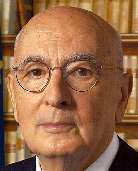
G. Napolitano |
Napolitano, Giorgio (b. June 29, 1925, Naples, Italy), president of Italy (2006-15). During World War II he took part in the resistance against Nazi and Fascist troops, founding a Communist group in 1942. At the end of the war, in 1945, he became an official member of the Italian Communist Party (PCI) and in 1953 he was elected to parliament for the first time. He quickly became a key party organizer as a member of the party's national committee. His early years were characterized by unswerving loyalty to the official Communist line (e.g., hailing the Soviet intervention in Hungary in 1956 as necessary), but the PCI distanced itself from the Communists in the Soviet Union and Eastern Europe after the Soviet army invaded Czechoslovakia in 1968 and by the 1980s he had emerged as one of the most influential leaders of the reformist wing of his party. At a PCI congress in 1986, he made a speech in which he described the PCI as "an integral part of the European Left." When the PCI set up a shadow cabinet in 1989, he became shadow foreign minister. He was a champion of the party's transformation into the Democratic Party of the Left (subsequently the Democrats of the Left) in February 1991. He was president of the Chamber of Deputies (1992-94), interior minister (1996-98), and a member of the European Parliament (1999-2004), serving as chairman of its committee on constitutional affairs. In September 2005, he was named a lifetime senator by Pres. Carlo Azeglio Ciampi. In 2006 he became Italy's first former Communist to be appointed head of state. In 2013, the 87-year-old became the first Italian president to be reelected. He resigned in 2015, however, citing his advanced age.

J. Napolitano |
Napolitano, Janet (Ann) (b. Nov. 29, 1957, New York City), governor of Arizona (2003-09). She volunteered as an attorney for the state Democratic Party and joined the team of lawyers representing Anita Hill at the hearings on the confirmation of Supreme Court justice Clarence Thomas in October 1991. In 1993 she was appointed U.S. attorney for Arizona where she served until she ran for attorney general in 1998; she was elected by a 50%-47% margin in a year in which the top 5 statewide offices were won by women of which Napolitano was the only Democrat. As attorney general, she got plenty of good publicity. By October 2001 she had a 55% positive job rating, and she was obviously running for governor (Jane Hull was term-limited). She announced in January 2002. She campaigned as a "conservative Democrat" and was criticized as "too Republican" by one primary opponent. But she was able to enlist the help of the firefighters' union and the United Food and Commercial Workers to amass the necessary 6,000 nominating petitions and 6,000 $5 contributions that qualified her for financing under the Clean Elections Act. Napolitano won the primary over former state senator Alfredo Gutierrez, 57%-22%. In the general election, Napolitano relied on her record as attorney general and called for closing loopholes and cutting spending to make up the budget shortfalls; she supported the death penalty. Her Republican opponent, former congressman Matt Salmon, opposed tax increases, announced a Workforce 2010 plan to create 500,000 jobs paying more than $40,000, and said he wanted to bring God back into government. It proved to be a very close election, and she won 46%-45%. Her taking office in 2003 was the first orderly transition from one governor to another since 1987. In 2009-13 she was secretary of homeland security in Pres. Barack Obama's cabinet.
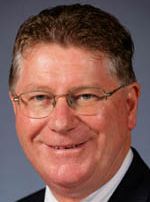
Napthine | 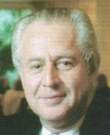
Naranjo |
Napthine, Denis (Vincent) (b. March 6, 1952, Geelong, Vic.), premier of Victoria (2013-14).
Napuat, Andrew (Solomon) (b. March 21, 1983), internal affairs minister of Vanuatu (2017-20).
Naqvi, (Syed) Mohsin (Raza) (b. Oct. 28, 1978, Lahore, Pakistan), interim chief minister of Punjab (Pakistan) (2023- ).
Narain, Govind (b. May 5, 1916 - d. April 3, 2012, Chattarpur, Delhi, India), governor of Karnataka (1977-83).
Narancio (Grela), Edmundo (Manuel) (b. Sept. 28, 1916, Montevideo, Uruguay - d. Feb. 14, 2001, Montevideo), Uruguayan politician. He was minister of education and culture (1973-75) and permanent representative to the United Nations (1977-80).
Narang, Agustin Teras (b. Oct. 12, 1955, Banjarmasin, Kalimantan [now in Kalimantan Selatan], Indonesia), governor of Kalimantan Tengah (2005-15).
Naranjo (Trujillo), Óscar (Adolfo) (b. Dec. 22, 1956, Bogotá, Colombia), vice president of Colombia (2017-18). He was also director-general of police (2007-12).
Naranjo Villalobos, Fernando (Enrique) (b. Oct. 11, 1942, San José, Costa Rica), finance minister (1986-89) and foreign minister (1994-98) of Costa Rica.

Narantsatsralt |
Narantsatsralt, Janlavyn (b. June 10, 1957, Dundgovi aymag, Mongolia - d. Nov. 12, 2007, Töv aymag, Mongolia), prime minister of Mongolia (1998-99). A member of the National Democratic Party, he became mayor of Ulaanbaatar in 1996. He was well liked by the public, and few blamed him for the capital's mounting piles of garbage and proliferating potholes. When the government could not sell Ulaanbaatar's only skyscraper to private investors, Narantsatsralt moved the mayor's office into it. He took over as prime minister after the fledgling democracy went through a seven-month crisis period that saw parliament fail to agree on five candidates for prime minister. He was elected as a lawmaker in 2000 and in 2006 became minister of construction and city planning. He was killed in a car accident.
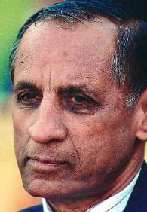
Narasimhan |
Narasimhan, E(kkadu) S(rinivasan) L(akshmi) (b. Nov. 4, 1945), governor of Chhattisgarh (2007-10), Andhra Pradesh (2009-19), and Telangana (2014-19). He was also director of the Intelligence Bureau of India (2005-06).
Narayan, Shriman (b. July 13, 1912 - d. Jan. 3, 1978, Gwalior, India), governor of Gujarat (1967-73). He was also Indian ambassador to Nepal (1964-67).
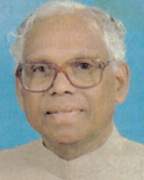
K.R. Narayanan |
Narayanan, K(ocheril) R(aman) (b. Oct. 27, 1920, Uzhavoor, Kottayam division, Travancore [now in Kottayam district, Kerala], India - d. Nov. 9, 2005, New Delhi, India), president of India (1997-2002). He joined the Indian foreign service in 1949 and became ambassador to Thailand (1967-69) and Turkey (1973-75) but was especially effective as ambassador to China (1976-78), helping to mend relations following a 15-year rift in diplomacy. After retiring from the foreign service, he served as ambassador to the U.S. (1980-84) as a political appointee. In 1984 he entered politics, serving in the Lok Sabha (People's Assembly) from 1985 to 1992 for the Ottapalam constituency in Kerala. He was a minister of state in the union cabinet from 1985 to 1989 and became vice president in 1992. Supported by nearly all of the main political parties, he became the first "untouchable" (member of India's lowest caste) to become president in 1997 when he was elected by 95% of the mainly upper-caste federal and state lawmakers, defeating former chief election commissioner T.N. Seshan. His installment came only weeks before the 50th anniversary of India's independence. Caste discrimination had not been completely eliminated in the previous 50 years, and indeed had led to recent violent eruptions, but his election was seen as a harbinger of progress in that area. He brought a rare assertiveness to the largely ceremonial post. Twice, on constitutional grounds, he questioned the government's decision to sack state governments. He also challenged the tradition that, after an election, the largest party automatically gets the chance to form a government, insisting it show evidence of a parliamentary majority.
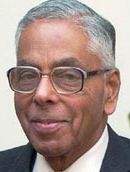
M.K. Narayanan |
Narayanan, Mayankote Kelath (b. July 23, 1934, New Delhi, India), governor of West Bengal (2010-14). He was also director of the Intelligence Bureau (1987-89, 1991-92) and national security advisor (2005-10) of India.
Narayanasamy, V(elu) (b. May 30, 1947, Pondicherry, French India [now Puducherry, India]), chief minister of Puducherry (2016-21).
Nardone (Cetrulo), Benito, byname Chicotazo (b. 1906, Montevideo, Uruguay - d. March 25, 1964, Montevideo), president of the National Council of Government of Uruguay (1960-61).

Narimanov | 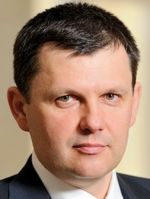
A. Narolin |
Narimanov, Nariman (Kerbalay Nadzhaf-ogly), Azeri Näriman Kärbälay Näcäf oglu Närimanov (b. April 14 [April 2, O.S.], 1870, Tiflis, Russia [now Tbilisi, Georgia] - d. March 19, 1925, Moscow, Russian S.F.S.R.), chairman of the Provisional Military-Revolutionary Committee (1920-21) and of the Council of People's Commissars (1921-22) of the Azerbaijan Soviet Socialist Republic, member of the Union Council of Transcaucasia (1922-23), and co-chairman of the Central Executive Committee of the U.S.S.R. (1922-25).
Narjes, Karl-Heinz (b. Jan. 30, 1924, Soltau, Prussia [now in Niedersachsen], Germany - d. Jan. 26, 2015, Bonn, Nordrhein-Westfalen, Germany), West German politician. He was European commissioner for the internal market, industrial innovation, customs union, environment, consumer protection, and nuclear safety (1981-85) and industrial affairs, information technology, and science and research (1985-89) and a vice president of the Commission (1985-89).
Narokobi, Bernard (Mullu) (b. Aug. 2, 1945, Wautogik village, New Guinea [now in East Sepik province, Papua New Guinea] - d. March 9, 2010, Port Moresby, Papua New Guinea), Papua New Guinean politician. He was minister of justice (1988-92) and agriculture (1994-95), speaker of parliament (1999-2002), and high commissioner to New Zealand (2005-08).
Narolin, Aleksandr (Vladimirovich) (b. June 27, 1972, Krasnogvardeyskoye, Adygey autonomous oblast, Russian S.F.S.R.), prime minister of Adygeya (2017-20). He was also mayor of Maykop (2013-17).
Narolin, Mikhail (Tikhonovich) (b. Oct. 19, 1933 - d. Jan. 21, 2011, Lipetsk, Russia), head of the administration of Lipetsk oblast (1993-98).
Narruhn, Alexander (Robert) (b. June 15, 1966), governor of Chuuk (2021- ).
Nartakhova, Mariya (Dmitriyevna) (b. Jan. 25 [Jan. 12, O.S.], 1906, Abaginsky nasleg [village], Yakutsk oblast [now in Sakha republic], Russia - d. 1987), chairman of the Presidium of the Supreme Soviet of the Yakut A.S.S.R. (1954-63). She was also minister of social security (1947-54).
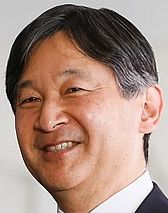
Naruhito |
Naruhito, original name Naruhito Hironomiya, era name Reiwa (b. Feb. 23, 1960, Tokyo, Japan), emperor of Japan (2019- ). The eldest son of Emperor Akihito and Empress Michiko, he became the first heir to the Japanese throne to have studied abroad (Oxford University, England, 1983-85). He became crown prince when his father became emperor in 1989, and he was ceremonially proclaimed heir to the throne on Feb. 23, 1991. On June 9, 1993, he followed in the footsteps of his father by marrying a commoner. His choice, Masako Owada (b. Dec. 9, 1963, Tokyo), the daughter of Hisashi Owada, a high-ranking official of the Ministry of Foreign Affairs, joined the Foreign Ministry herself in 1987. When they first met in 1986, Naruhito was favourably impressed, but Owada was reportedly not interested in courtship. Marriage would mean the loss of much of the unprecedented freedom she enjoyed, and the decision was especially difficult because she would be exchanging a career in diplomacy for life in the imperial household, where the emperor's family, by tradition, lacked both privacy and autonomy. Only in December 1992 did Owada finally decide to accept the marriage proposal. Naruhito had persuaded her that her duties would be largely diplomatic in nature and promised to protect her for her entire life, an idea that was widely interpreted to mean that he was determined to guard her from the traditional, rigid ways of the Imperial Household Agency courtiers. Both were well prepared to take advantage of the experience they had in the world beyond the palace walls. A daughter, Aiko, was born Dec. 1, 2001. He succeeded as emperor when his father abdicated in 2019.
Narula, Ranjit Singh (b. Nov. 3, 1915, Gojra, Punjab, India [now in Pakistan] - d. June 1, 2005, Delhi, India), governor of Haryana (1976) and Punjab (India) (1977).
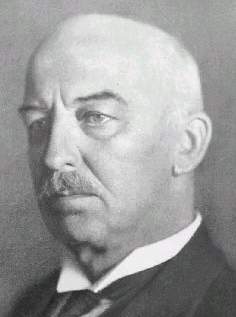
Narutowicz |
Narutowicz, Gabriel (Józef) (b. March 17, 1865, Telsze, Zmudz [Samogitia] region, Russia [now Telsiai, Lithuania] - d. Dec. 16, 1922, Warsaw, Poland), president of Poland (1922). He won international recognition as a water-power engineer and after World War I he participated in the Vistula river-bed control project. In June 1920, he was nominated minister for public works. He became president of the Academy of Technical Sciences and chairman of the National Reconstruction Council. In June 1922, he was appointed minister of foreign affairs. The rightist press attacked him for his affiliation to Chief of State Józef Pilsudski. Due to a demagogic action of the nationalists (National Democracy), he became the leading personage of the left side of the Sejm. He was elected first president of the republic on Dec. 9, 1922 (defeating the candidate of the right, Maurycy Zamoyski, by 289 votes to 227 on the fifth ballot), was sworn in on December 11, and took office December 14. On December 16, at the opening of an art exhibition, he was shot dead by a rightist extremist, Eligiusz Niewiadomski (1869-1923). The assassin declared at the trial that he first planned to kill Pilsudski.
Narváez Ojeda, Paula (Verónica) (b. May 22, 1972, Osorno, Los Lagos, Chile), Chilean diplomat. She has been permanent representative to the United Nations (2022- ).
Narváez Sampson, Sergio (Fredis) (b. April 26, 1948, León, Nicaragua), interior minister of Nicaragua (1995-97).
Naryshkin, Aleksandr (Alekseyevich) (b. Oct. 27 [Oct. 15, O.S.], 1839, Oryol province, Russia - d. March 6 [Feb. 22, O.S.], 1916, Petrograd [now St. Petersburg], Russia), governor of Podolia (1892-94); grandnephew of Dmitry Naryshkin.
Naryshkin, Aleksandr (Lvovich) (b. May 6 [April 26, O.S.], 1694, Moscow, Russia - d. Feb. 5 [Jan. 25, O.S.], 1746, St. Petersburg, Russia), Russian official; son of Lev Naryshkin. He was president of the Collegiums of State Expenses (1725-26), State Revenue (1726-27), and Commerce (1731-33).
Naryshkin, Dmitry (Vasilyevich) (b. 1792 - d. Jan. 1, 1832 [Dec. 20, 1831, O.S.]), governor of Tavrida (1823-29).
Naryshkin, Kirill (Alekseyevich) (b. c. 1670 - d. 1723), governor of Moscow (1716-19).
Naryshkin, Lev (Kirillovich) (b. 1664 - d. Feb. 8 [Jan. 28, O.S.], 1705, Moscow, Russia), head of the Ambassadorial Chancellery of Russia (1689-99).
Naryshkin, Semyon (Kirillovich) (b. April 16 [April 5, O.S.], 1710 - d. Dec. 8 [Nov. 27, O.S.], 1775, Moscow, Russia), Russian diplomat; son of Kirill Naryshkin. He was ambassador to Great Britain (1741-43).
Naryshkin, Sergey (Yevgenyevich) (b. Oct. 27, 1954, Leningrad, Russian S.F.S.R. [now St. Petersburg, Russia]), Russian politician. He has been head of the Government Apparatus (2004-08) and the Administration of the President (2008-11), a deputy prime minister (2007-08), chairman of the State Duma (2011-16), and director of the External Intelligence Service (2016- ).
Nasau, Kuresa (b. June 17, 1943, Swains Island, American Samoa - d. May 16, 2022), Ulu of Tokelau (1998-99, 2001-02, 2007-08, 2010-11, 2014-15). He was faipule of Atafu (1987-93, 1996-2011, 2014-17).
Nascimento, Alexandre Cassiano do (b. Aug. 13, 1856, Pelotas, Rio Grande do Sul, Brazil - d. Sept. 9, 1912, Rio de Janeiro, Brazil), foreign minister (1893-94), acting justice and interior minister (1893-94), and finance minister (1894) of Brazil.
Nascimento, Edson Arantes do, byname Pelé (b. Oct. 23, 1940, Três Corações, Minas Gerais, Brazil - d. Dec. 29, 2022, São Paulo, Brazil), Brazilian minister extraordinary of sports (1995-98). He was one of the world's most famous football (soccer) players.
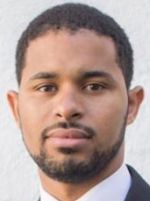
F. Nascimento |
Nascimento, Filipe (Dias) (b. Dec. 12, 1989, São Tomé and Príncipe), president of the regional government of Príncipe (2020- ).
Nascimento, João Garcez do (b. June 23, 1898, Curitiba, Paraná, Brazil - d. April 27, 1971, Curitiba), governor of Iguaçu (1944-46).
Nascimento, José Ayres do (d. af. 1916), president of Sergipe (1882-83) and Paraíba (1883-84).
Nascimento, Lopo (Fortunato Ferreira) do (b. June 10, 1942 [or July 10, 1940], Luanda, Angola), prime minister of Angola (1975-78). He was also minister of internal trade (1977-78), foreign trade (1979-82), planning (1981-86), and territorial administration (1991-92) and governor of Huíla (1986-90).
Nascimento, Miguel Joaquim Ayres do (d. Feb. 21, 1870, São Luís, Maranhão, Brazil), acting president of Maranhão (1863-64, 1866).
Nase, Nesti (b. April 13, 1922, Korçë district, Albania - d. 1994), foreign minister of Albania (1966-82). He was also minister to Bulgaria (1952-53) and ambassador to China (1954-56, 1963-66) and the Soviet Union (1958-61).
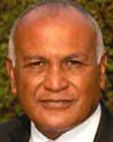
Naseem |
Naseem, Ahmed (b. 1948), foreign minister of Maldives (2011-12). He has also been minister of health (2020- ).

Nash |
Nash, Sir Walter (b. Feb. 12, 1882, Kidderminster, Worcestershire, England - d. June 4, 1968, Lower Hutt, N.Z.), prime minister and foreign minister of New Zealand (1957-60). He moved to New Zealand in 1909 and was elected to the national executive of the New Zealand Labour Party in 1919. He was secretary of the party from 1922 to 1932 and was elected its president in 1935. He was first elected to parliament in 1929 as member for Hutt and held the seat until his death. In 1935 he was appointed minister of finance and customs in the country's first Labour government, holding those portfolios until 1949. In 1940 he also became deputy prime minister and in 1942-44 he combined his cabinet position with responsibility as New Zealand minister to the United States and member of the Pacific War Council in Washington. He pushed through parliament the bitterly contested social security legislation of 1939 which made New Zealand a prototype welfare state. As finance minister he was responsible for legislation which brought the Reserve Bank under state ownership and control, for acquisition by the state of privately owned shares of the Bank of New Zealand, and for nationalization of the major domestic airline. On the death of Peter Fraser in 1950 he became leader of the opposition, and following Labour's narrow victory in 1957, prime minister. He reassumed leadership of the opposition after Labour's defeat in 1960, but resigned that position in 1963, when Arnold Nordmeyer succeeded him. He was also concerned with the welfare of the world's starving and underprivileged; the Colombo Plan, the Freedom from Hunger Campaign, and other undertakings with similar objectives could be assured of his enthusiastic support. He was knighted in 1965.
Nashad, Fida Muhammad (b. Feb. 27, 1945), acting governor of Gilgit-Baltistan (2018).
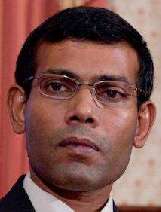
Nasheed |
Nasheed, Mohamed, byname Anni (b. May 17, 1967, Male, Maldives), president of Maldives (2008-12). In 1999, he was elected as a member of parliament representing the capital, Male. In 2003 he helped establish the Maldivian Democratic Party. He was elected chairman of the party in December 2005 and was the party's successful candidate in the country's first democratic presidential election in 2008. He became popular internationally as an environment crusader, holding an underwater cabinet meeting to highlight the perils of rising sea levels caused by global warming and their impact on the archipelago nation composed of coral masses just a few metres above sea level. He resigned in 2012 after opposition protesters continued anti-government rallies in the capital for 22 days, triggered by the military detention of the chief judge of the criminal court, Abdullah Mohamed. He was an unsuccessful presidential candidate in 2013. In 2015 he was sentenced to 13 years in prison on terrorism charges for ordering the arrest of Judge Mohamed. In 2016 he was granted political refugee status in Britain. In 2018, after elections were won by his party's candidate and the Supreme Court suspended his sentence, he returned from exile. In 2019 he became speaker of parliament.
Nasim Pasha, Muhammad Tawfiq (b. 1875, Cairo, Egypt - d. March 7, 1938, Cairo), interior minister (1919-20) and prime minister (1920-21, 1922-23, 1934-36) of Egypt.
Nasir (ibn Abdul Aziz Al Saud) (b. 1919, Riyadh, Nejd [now in Saudi Arabia] - d. 1984), Saudi prince; son of Abdul Aziz. He was governor of Riyadh (1945-47).
Nasir, Arrmanatha C(hristiawan) (b. December 1971, Bangkok, Thailand), Indonesian diplomat. He has been ambassador to France, Andorra, and Monaco (2019-21) and permanent representative to the United Nations (2022- ).
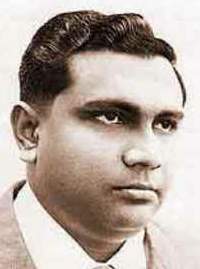
I. Nasir |
Nasir (Rannabaderi Kilagefanu), (Amir) Ibrahim (b. Sept. 2, 1926, Mahe, Maldives - d. Nov. 22, 2008, Singapore), prime minister (1957-68) and president (1968-78) of Maldives. A descendant of one of the Maldivian royal families, he served as prime minister under Sultan Muhammad Farid Didi - also being minister of public safety (1956-68), home affairs (1957-64), and finance, education, and external affairs (1957-68) - and then became the first president of the second Maldivian republic. Some hail him as a national hero due to his involvement in the deal which saw the British protectorate gain full independence in 1965. He is credited with introducing the modern school curriculum, modernizing the fisheries industry, and initiating tourism in Maldives, which was to become the country's biggest earner. He also ended the local tax known as the vaaru and cracked down on islanders in the south who had declared a breakaway state. After declining to run for a third term in 1978, he went to Singapore and never returned to Maldives. In May 1980 Pres. Maumoon Abdul Gayoom accused Nasir of having masterminded an abortive coup; Nasir denied the allegation and attempts to extradite him from Singapore failed. In July 1990 Gayoom pardoned Nasir in absentia, ostensibly because of his role in the independence struggle.
Nasir, Musa (b. 1896? - d. 1971), finance minister (1952-53) and foreign minister (1959-61) of Jordan. He was also minister of communications (1949-50).
Nasir (bin Syed) Ismail, Tun Syed (b. March 7, 1921, Batu Pahat, Johor [now in Malaysia] - d. March 16, 1982, Kuala Lumpur, Malaysia), Malaysian politician. He was speaker of the Dewan Rakyat (1978-82). He was awarded the titles Tan Sri (1971) and Tun (posthumous, 1982).
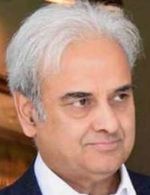
Nasir-ul-Mulk |
Nasir-ul-Mulk (b. Aug. 17, 1950, Mingora, Swat [now in Khyber Pakhtunkhwa], Pakistan), interim prime minister of Pakistan (2018). He was also acting chief election commissioner (2013-14) and chief justice (2014-15).
Nasirov, Roman (Mykhailovych) (b. March 3, 1979, Kiev, Ukrainian S.S.R.), Ukrainian politician. He was head of the State Fiscal Service (2015-18) and a minor presidential candidate (2019).
Nasko, (Mohammed) Gado (b. June 20, 1941, Nasko [now in Niger state], Nigeria), administrator of Sokoto (1978-79) and Nigerian minister of the Federal Capital Territory (1989-93). He was also minister of trade (1985-86) and agriculture, water resources, and rural development (1986-89).
Näslund, (Hans) Manfred (Eugen) (b. June 28, 1899, Skön, Västernorrland, Sweden - d. July 18, 1988, Vallentuna, Stockholm, Sweden), governor of Norrbotten (1957-66).
Nason, Geraldine Byrne (b. 1959, Drogheda, County Louth, Ireland), Irish diplomat. She has been ambassador to France and Monaco (2014-17) and the United States (2022- ) and permanent representative to the United Nations (2017-22).
Nasr Allah Bahadur Khan (b. June 1, 1806 - d. Sept. 21, 1860), emir of Bukhara (1826-60).
Nasriddinova, Yadgar (Sadykovna) (b. Dec. 26, 1920, Kokand, Russia [now in Uzbekistan] - d. April 7, 2006, Moscow, Russia), chairwoman of the Presidium of the Supreme Soviet of the Uzbek S.S.R. (1959-70). She was also minister of building materials industry (1952-59) and deputy premier (1955-59) of the Uzbek S.S.R. and chairwoman of the Soviet of Nationalities of the U.S.S.R. Supreme Soviet (1970-74).
Nasrullah Khan (b. April 7, 1875, Samarkand, Russia [now in Uzbekistan] - d. [assassinated] May 31, 1920, Kabul, Afghanistan), emir of Afghanistan (1919).
Nasser, Alfredo (b. April 30, 1907, Caiapônia, Goiás, Brazil - d. Nov. 21, 1965, Brasília, Brazil), justice and interior minister of Brazil (1961-62).
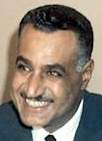
G.A. Nasser |
Nasser, Gamal Abdel, Arabic Jamal `Abd al-Nasir (b. Jan. 15, 1918, Alexandria, Egypt - d. Sept. 28, 1970, Cairo, United Arab Republic [now Egypt]), prime minister (1954, 1954-58, 1967-70) and president (1956-70) of Egypt (from 1958 United Arab Republic). While serving in the Egyptian army in the Sudan, he met three fellow officers - Zakaria Mohieddin, Abdel Hakim Amer, and Anwar as-Sadat - with whom he planned a secret revolutionary organization, the Free Officers, whose aim was to oust the British and the Egyptian royal family. On July 23, 1952, Nasser and 89 other Free Officers overthrew King Faruq in an almost bloodless coup d'état. Nasser vetoed Sadat's idea of executing Faruq and permitted him to go into exile. The country was taken over by a Revolutionary Command Council of 11 officers controlled by Nasser, with Maj.Gen. Muhammad Naguib being put forward as the leader of the regime. In 1953 Nasser became vice-premier and interior minister, and in 1954, in a complicated series of intrigues, he emerged from the shadows and replaced Naguib as head of state and prime minister. On June 23, 1956, a new constitution was approved by 99.8% of voters and 99.9% acclaimed Nasser, the only candidate, as president. He became a prominent advocate of Arab unity and a leader of the nonaligned states. He introduced land reforms and oversaw the construction of the Aswan High Dam. When he nationalized the Suez Canal in 1956, Britain, France, and Israel attacked Egypt, but they had to withdraw under international pressure. He created a union with Syria in 1958; when Syria withdrew in 1961, Egypt retained the name United Arab Republic. His defeat in the 1967 war with Israel prompted him to resign, but displays of popular support induced him to remain in office. In 1970 he mediated the Jordanian civil war before he suddenly died.
Nasser, Nasser Abdulaziz al-, Arabic Nasir `Abd al-`Aziz al-Nasir (b. Sept. 15, 1953, Doha, Qatar), president of the United Nations General Assembly (2011-12). He was also Qatar's ambassador to Jordan (1993-98) and permanent representative to the UN (1998-2011) and UN high representative for the Alliance of Civilizations (2013-18).
Nasser Muhammad Al Ahmad Al Sabah, Sheikh (b. Dec. 22, 1941), prime minister of Kuwait (2006-11); half-nephew of Sheikh Jabir Al Ahmad Al Jabir Al Sabah, Sheikh Sabah Al Ahmad Al Jabir Al Sabah, and Sheikh Nawaf Al Ahmad Al Jabir Al Sabah. He was also ambassador to Iran (1968-79) and Afghanistan (1971-79) and minister of information (1985-88), social affairs and labour (1988-90), and the royal court (1991-2006).
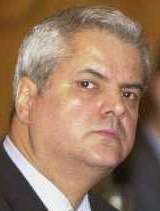
Ad. Nastase |
Nastase, Adrian (Marin) (b. June 22, 1950, Bucharest, Romania), foreign minister (1990-92) and prime minister (2000-04) of Romania. He lost the 2004 presidential election to Traian Basescu. In 1992-96 he was president of the Chamber of Deputies. On Dec. 20, 2004, he was again elected to that position, but he had to resign the post on March 15, 2006, after losing a vote of confidence among the leadership of his Social Democratic Party. In February 2006 he had been indicted by anti-corruption prosecutors for bribery in connection with a 1998 property transaction. He was cleared of the charges in December 2011, but in January 2012 he was sentenced to two years in prison after being convicted of illegally raising funds for his 2004 presidential campaign. Nastase, who insisted he was innocent and that the case was politically motivated, apparently pulled out a revolver and tried to kill himself when police arrived to arrest him in June 2012. He was released in March 2013 after serving nine months. That same month, however, he was sentenced in a different bribery case (related to his time as prime minister) to three years in jail, which on appeal was upped to four years in January 2014.
Nastase, Andrei (b. Aug. 6, 1975, Mîndresti, Moldavian S.S.R.), interior minister and a deputy prime minister of Moldova (2019). He was also mayor of Chisinau (2019).
Nasuhioglu, Rüknettin (b. 1894, Constantinople, Ottoman Empire [now Istanbul, Turkey] - d. Feb. 5, 1973), interior minister (1950-51) and justice minister (1951-52) of Turkey. He was also governor of Mersin (1936-39), Samsun (1943-46), Kocaeli (1946-48), and Aydin and Edirne (1948-49).
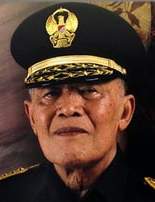
A.H. Nasution |
Nasution, Abdul Haris (b. Dec. 3, 1918, Kotanopan, Netherlands East Indies [now in Sumatera Utara, Indonesia] - d. Sept. 6, 2000, Jakarta, Indonesia), Indonesian general. He entered the Netherlands East Indies army in 1941, but within months, Japan invaded and he joined a collaborationist group that fought against the Allies in World War II in the hopes of ending centuries of Dutch rule. Once the war was over, Indonesia declared independence and he took a leading role in the fledgling republic's four-year fight against the Dutch. He became army chief of staff under Sukarno, who served as president from 1945. After the Dutch withdrawal in 1949, he was given the arduous task of welding together a united army from disparate rebel factions. In 1956, he put down a rebellion by troops covertly backed by the CIA, which feared rising Communism. The conflict cost about 30,000 lives. The adoption of a 1958 policy that allowed the military a direct role in national politics set the tone of years of authoritarianism. He was defense minister in 1959-66. On Sept. 30, 1965, he was the only survivor of a round of assassinations of top generals, which the army claimed was part of a Communist coup attempt. In what has become part of national folklore, he is remembered for dodging bullets and leaping over a wall into the Iraqi ambassador's residence next door to his home. Gen. Suharto, the only senior officer not targeted, quickly crushed what he said was a coup attempt and moved to seize power from founding president Sukarno, who was accused of leftist sympathies. As many as 500,000 trade unionists, Communist Party members, and others were murdered in an army-inspired backlash that lasted into 1966. In 1966, Nasution headed the legislature that approved Suharto's rise to the presidency. He later became a critic of the dictatorship.
Nasution, Kaharuddin (b. June 23, 1925, Medan, Netherlands East Indies [now in Sumatera Utara, Indonesia] - d. 1990), governor of Riau (1960-67) and Sumatera Utara (1983-88).

Nata | 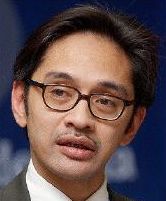
Natalegawa |
Nata, Théophile (b. 1947, Sinkouatah village, Atacora département, Dahomey [now Benin]), foreign minister of Benin (1990-91). He was also ambassador to Algeria (1982-88) and the United States (1988-90) and minister of youth and sports (1991-93), rural development (1999-2001), and agriculture, livestock, and fisheries (2001-03).
Natalegawa, (Raden Mohammad) Marty (Muliana) (b. March 22, 1963, Bandung, Indonesia), foreign minister of Indonesia (2009-14). He was also ambassador to the United Kingdom (2005-07) and permanent representative to the United Nations (2007-09).
Natalevich, Nikifor (Yakovlevich) (b. May 17 [May 4, O.S.], 1900, Orsha, Mogilyov province, Russia [now in Belarus] - d. March 28, 1964), chairman of the Central Executive Committee (1937-38) and chairman of the Presidium of the Supreme Soviet (1938-48) of the Belorussian S.S.R.
Natali, Lorenzo (b. Oct. 2, 1922, Florence, Italy - d. Aug. 28, 1989, Rome, Italy), Italian politician. He was minister of merchant marine (1966-68), public works (1968, 1969-70), tourism and entertainment (1968-69), and agriculture and forests (1970-73), European commissioner for enlargement and environment (1977-81), Mediterranean policy, enlargement, and information (1981-85), and cooperation and development (1985-89), and a vice president of the European Commission (1977-89).
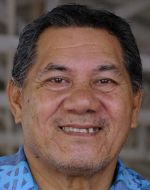
Natano | 
Natapei |
Natano, Kausea (b. July 5, 1957), prime minister of Tuvalu (2019- ). He was also minister of public utilities and industries (2007-10) and communications, transport, and public utilities (2010-13) and deputy prime minister (2010-13).
Natapei (Tua Fanua`ariki), (Nipake) Edward (b. July 17, 1954, Futuna island, Tafea province, New Hebrides [now Vanuatu] - d. July 28, 2015, Port Vila, Vanuatu), foreign minister (1991, 2013-14), speaker of parliament (1996-99), acting president (1999), and prime minister (2001-04, 2008-10, 2011) of Vanuatu. He was also minister of trade and industry (1988-89), transport, tourism, public works, communications, and civil aviation (1989-90), and infrastructure and public utilities (2005-07, 2007-08) and deputy prime minister (2007-08, 2013-14).
Natchaba, Fambaré Ouattara (b. April 17, 1945, Gando, northern Togo - d. Oct. 15, 2020, Paris, France), foreign minister of Togo (1992-94). He was president of the National Assembly in 2000-05.
Natel, Laudo (b. Sept. 14, 1920, São Manuel, São Paulo, Brazil - d. May 18, 2020, São Paulo, Brazil), governor of São Paulo (1966-67 [acting], 1971-75).
Nath, Amar (b. March 30, 1966), administrator of Lakshadweep (2011-12).
Nath, Kamal (b. Nov. 18, 1946, Kanpur, United Provinces [now Uttar Pradesh], India), chief minister of Madhya Pradesh (2018-20). He was also Indian minister of state (independent charge) of environment and forests (1991-95) and textiles (1995-96), minister of road transport and highways (2009-11), urban development (2011-14), and parliamentary affairs (2012-14), and acting speaker of the Lok Sabha (2014).
Nath, Surendra (b. 1926 - d. [plane crash] July 9, 1994, near Kulu, Himachal Pradesh, India), governor of Punjab (1991-94) and Himachal Pradesh (1993, 1993-94).
Nathan, Sir Matthew (b. Jan. 3, 1862, London, England - d. April 18, 1939, West Coker, Somerset, England), governor of Gold Coast (1900-04), Hong Kong (1904-07), Natal (1907-09), and Queensland (1920-25); knighted 1902.

S.R. Nathan |
Nathan, S(ellapan) R(ama) (b. July 3, 1924, Singapore - d. Aug. 22, 2016, Singapore), president of Singapore (1999-2011). He was head of the country's Internal Security Department in the 1970s and was high commissioner to Malaysia (1988-90) and ambassador to the United States (1990-96). He was the second ethnic Indian to be president of the multiracial state.
Náthon, István (b. May 23, 1942, Vajasvatán, Hungary - d. April 30, 2015), Hungarian diplomat. He was permanent representative to the United Nations (1994-97).
Natoli (Gongora di Scaliti), Giuseppe (b. June 9, 1815, Messina, Sicily [Italy] - d. Sept. 25, 1867, Messina), interior minister of Italy (1865). He was also foreign minister of Sicily (Garibaldi government, 1860), Italian minister of agriculture, industry, and commerce (1861) and education (1864-65), and prefect of Siena (1862). His son Giacomo Natoli was mayor of Messina (1886-87, 1889-91, 1894-96).
Natorf, Wlodzimierz (b. Oct. 12, 1931, Lódz, Poland - d. July 19, 2012), Polish diplomat. He was permanent representative to the United Nations (1982-85) and ambassador to the Soviet Union (1986-89).
Natsir, Mohammad (b. July 17, 1908, Alahan Panjang, Netherlands East Indies [now in Sumatera Barat, Indonesia] - d. Feb. 6, 1993, Jakarta, Indonesia), prime minister of Indonesia (1950-51). Known as an Islamic scholar, he was also minister of information (1946-47, 1948-49).

Natta |
Natta, Alessandro (b. Jan. 7, 1918, Imperia, Liguria, northern Italy - d. May 23, 2001, Imperia), Italian politician. An active anti-Fascist, Natta, while serving as an artillery officer in the Italian Army, was wounded in a clash with the Germans in the Aegean theatre and imprisoned in Germany. He joined the Italian Communist Party (PCI) in 1945, became a town councillor, entered the national parliament in 1948, and eventually led the party group in the Chamber of Deputies and edited its weekly magazine, Rinascita. Highly regarded within the PCI but little known to the public, Natta, who at the time was serving as president of the party's disciplinary body, the Central Control Commission, was chosen to succeed the late Enrico Berlinguer, a party leader of international stature, on June 26, 1984. Inevitably, he was seen as a stopgap candidate who would allow the party to groom a younger man. Natta, however, took office in the best Communist tradition. He showed no complexes, rolled up his sleeves, and got on with the job. Overshadowed by Berlinguer's reputation and the wave of national mourning that followed his death, Natta came to power with two notable advantages. Only ten days before his selection, the party had beaten the Christian Democrats for the first time in a national poll - the elections to the European Parliament. Second, the party united behind him: 227 votes for, none against, and 11 abstentions. Natta was replaced as leader in 1988, as the Communists were trying to halt an erosion at the polls. Succeeding him was Achille Occhetto, who would go on, two years later, to oversee the changing of the party's name and hammer-and-sickle symbol. Natta bitterly opposed those changes.
Nattes, Ernest (Maurice) de (b. Nov. 9, 1908, Toulouse, France - d. Feb. 27, 1994), governor of Guadeloupe (1946-47) and governor (1957-58) and high commissioner (1958-59) of Ivory Coast. He was also prefect of the French département of Ariège (1944-46).

Natuman |
Natuman, Joe (b. Nov. 24, 1952, Lenakel, Tanna, New Hebrides [now Vanuatu]), internal affairs minister (2001-04, 2007-08), foreign minister (2009-10, 2011, 2011), and prime minister (2014-15) of Vanuatu. He was also minister of justice, culture, and women's affairs (1996), lands and natural resources (1996-97), education (1998-99, 2004-07), health (2008-09), and tourism, trade, commerce, and ni-Vanuatu business (2016-18) and deputy prime minister (2016-18).

Natusch |
Natusch Busch, Alberto (b. May 23, 1933, Riberalta, Beni department, Bolivia - d. Nov. 23, 1994, Santa Cruz, Bolivia), president of Bolivia (1979); nephew of Germán Busch. He was also agriculture minister (1973-78).
Nauckhoff, Johan Otto friherre (b. Oct. 1, 1788 - d. Feb. 19, 1849, Stockholm, Sweden), governor of Blekinge (1832-47).
Naudé, Jozua François, byname Tom Naudé (b. April 15, 1889, Middelburg, Cape Colony [now in Eastern Cape province, South Africa] - d. May 31, 1969, Cape Town, South Africa), speaker of the House of Assembly (1948-50), finance minister (1956-58), interior minister (1958-61), president of the Senate (1961-69), and acting president (1967-68) of South Africa. He was also minister of posts and telegraphs (1951-54) and health (1954-56).
Naudin, (Jean Henri) Armand (b. July 15, 1869, Charolles, Saône-et-Loire, France - d. March 16, 1938), prefect of police of Paris (1922-24) and prefect of Seine département (1924-25). He was also prefect of Gers (1911-17), Cher (1917-18), and Nord (1918-22).
Naukaut, Shem, finance minister of Vanuatu (1996-97). He was also minister of transport, public works, ports and marine affairs, and urban water supply (1995-96).
Nauman, Sergey (Vladimirovich) (b. June 28, 1972), acting governor of Taymyr autonomous okrug (2002-03).
Naumann, Konrad (b. Nov. 25, 1928, Leipzig, Germany - d. July 25, 1992, Quito, Ecuador), first secretary of the Socialist Unity Party of East Berlin (1971-85).
Naumov, Aleksandr (Nikolayevich) (b. Oct. 3 [Sept. 21, O.S.], 1868, Simbirsk [now Ulyanovsk], Russia - d. Aug. 3, 1950, Nice, France), agriculture minister of Russia (1915-16).
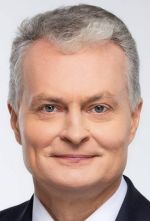
Nauseda |
Nauseda, Gitanas (b. May 19, 1964, Klaipeda, Lithuanian S.S.R.), president of Lithuania (2019- ).
Nava Carrillo, Germán (b. Aug. 21, 1930, Maracaibo, Venezuela - d. July 23, 1991, Caracas, Venezuela), foreign minister of Venezuela (1988-89). He was also ambassador to Egypt and Ethiopia (1970-72) and Costa Rica (1974-75) and permanent representative to the United Nations (1979-81).
Nava Castillo, Antonio (b. Sept. 5, 1905, Ixcaquixtla, Puebla, Mexico - d. March 28, 1983, Mexico City, Mexico), governor of Puebla (1963-64).
Navajas Artaza, Adolfo (b. May 26, 1925, Gobernador Virasoro, Corrientes, Argentina - d. Aug. 2, 2022, Gobernador Virasoro), governor of Corrientes (1969-73). He was also Argentine minister of social action (1982-83).
Navajas Mogro, Hugo (b. Aug. 1, 1923, Tarija, Bolivia - d. Dec. 25, 2015), Bolivian diplomat. He was permanent representative to the United Nations (1988-92).
Navajas Trigo, Bernardo (b. Aug. 14, 1891, Tarija, Bolivia - d. Oct. 27, 1973), interior, justice, and immigration minister of Bolivia (1942). He was also minister of war and colonization (1935-36), education and indigenous affairs (1938-40), and labour and social security (1940).
Navarrete (Prida), (Jesús) Alfonso (b. Oct. 13, 1963, Mexico City, Mexico), interior minister of Mexico (2018). He was also minister of labour and social security (2012-18).
Navarrete López, Jorge Eduardo (b. April 29, 1940, Mexico City, Mexico), Mexican diplomat. He was ambassador to Venezuela (1972-75), Trinidad and Tobago (1973-75), Austria (1976-77), Yugoslavia (1977-78), the United Kingdom and Ireland (1986-89), China (1989-93), Chile (1993-95), Brazil (1998-2001), and Germany (2002-03) and permanent representative to the United Nations (2001-02).
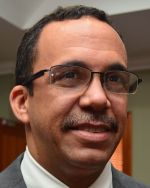
Andrés Navarro |
Navarro (García), Andrés (b. Feb. 4, 1964, Bonao, Dominican Republic), foreign minister of the Dominican Republic (2014-16).
Navarro, Antenor de França (b. Aug. 31, 1899, Paraíba [now João Pessoa], Paraíba, Brazil - d. [seaplane accident] April 26, 1932, Bay of All Saints, Bahia, Brazil), federal interventor in Paraíba (1930-32).
Navarro (Alvarado), Francisco, vice president of Nicaragua (1937-39).
Navarro (y Enríquez), José Gabriel (b. Dec. 3, 1883, Quito, Ecuador - d. Aug. 21, 1965, Quito), foreign minister of Ecuador (1933-34). He was also ambassador to Chile (1948-51).
Navarro, José Joaquim Geminiano de Moraes (b. Dec. 19, 1799, Natal, Rio Grande do Norte, Brazil - d. Aug. 24, 1858), president of Sergipe (1833-35).
Navarro (Jiménez), Luis Fernando (b. Nov. 4, 1960, Chía, Cundinamarca, Colombia), acting defense minister of Colombia (2019, 2021). He was commander of the armed forces (2018-22). In 2023 he was appointed ambassador to Lebanon.
Navarro, Lourenço José de Moraes (b. March 4, 1786, São Gonçalo do Potengi [now São Gonçalo do Amarante], Rio Grande do Norte, Brazil - d. 1830), acting president of Rio Grande do Norte (1824-25).
Navarro Reverter, Juan (b. Jan. 27, 1844, Valencia, Spain - d. March 2, 1924, Madrid, Spain), finance minister (1895-97, 1906, 1906-07, 1912) and foreign minister (1912-13) of Spain.
Navarro Rojas, Alexis (Rafael) (b. Oct. 2, 1946, Pampatar, Nueva Esparta, Venezuela - d. May 22, 2016, Caracas, Venezuela), governor of Nueva Esparta (2000-04).
Navarro Romero, (Darío) Alfonso (b. Sept. 25, 1911, Chorrillos, Lima province, Peru - d. Sept. 9, 1969, Callao, Peru), justice minister of Peru (1968). He was also navy minister (1969).
Navarro Rubio, Mariano (b. Nov. 14, 1913, Burbáguena, Teruel province, Spain - d. Nov. 3, 2001, Majadahonda, Madrid province [now autonomous community], Spain), finance minister of Spain (1957-65). He was also governor of the Bank of Spain (1965-70).
Navarro Wolff, Antonio (José) (b. July 9, 1948, Pasto, Nariño, Colombia), Colombian presidential candidate (1990, 1994). He was also minister of health (1990), mayor of Pasto (1995-97), and governor of Nariño (2008-11).
Navas, Vicente, foreign minister (1879-80) and interior minister (1880-83) of Nicaragua.
Navas Arana, Vicente (b. Nov. 26, 1900, León, Nicaragua - d. 1985), interior minister of Nicaragua (1966-69).
Návay de Földeák, Lajos (b. Sept. 18, 1870, Földeák, Hungary - d. April 29, 1919, Kiskunfélegyháza, Hungary), Hungarian politician. He was speaker of the House of Representatives (1911-12) and was designated interior minister in the abortive government of János Hadik in 1918.
Navelle, Auguste Eugène (b. June 10, 1846, Charleville-Mézières, Ardennes, France - d. ...), lieutenant governor of Cochinchina (1888).
Navia Varón, Hernando (b. April 5, 1904, El Cerrito, Valle, Colombia - d. July 11, 1969, Cali, Colombia), interior minister of Colombia (1957).
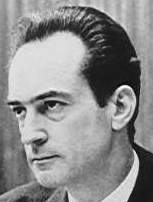
Naville | 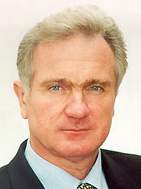
Navitski |
Naville, Marcel (Alfred) (b. Aug. 12, 1919 - d. Oct. 8, 2003, Meyrin, Genève, Switzerland), president of the International Committee of the Red Cross (1969-73).
Navitski, Henadz (Vasilyevich), Russian Gennady (Vasilyevich) Novitsky (b. Jan. 2, 1949, Mogilyov, Belorussian S.S.R.), prime minister of Belarus (2001-03). He was chairman of the Council of the Republic (upper house of parliament) in 2003-08.
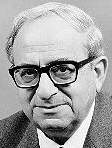
Navon |
Navon, Yitzhak (b. April 19, 1921, Jerusalem, Palestine - d. Nov. 7, 2015, Jerusalem), president of Israel (1978-83). In 1946 he was drafted to head the Arabic Department of the Zionist military organization, the Haganah, in Jerusalem and held this position until the conclusion of Israel's war of independence in 1948. He was posted for a short time to the Israeli missions in Uruguay and Argentina, but in 1951 Israel's foreign minister, Moshe Sharett, chose him as his political secretary. After Navon served two years with Sharett, Prime Minister David Ben-Gurion requested his transfer to the prime minister's office to act as chief of the prime minister's secretariat. Navon remained there until Ben-Gurion's resignation in 1963. In this post Navon served as Ben-Gurion's secretary in his dealings with ministers and foreign dignitaries and as his shield against unwanted interventions. After leaving the prime minister's office in 1963, Navon joined the Ministry of Education and Culture, but by 1965 he was back in politics. He joined Ben-Gurion's Rafi party, a breakaway group from the Labour Party. He was elected to the Knesset and served as deputy speaker for seven years and as chairman of the Defense and Foreign Affairs Committee for four years. In 1978 he became president. He made his inaugural address to the Knesset on May 29. Speaking in Hebrew and then in fluent Arabic, Navon appealed to Israel's Arab population and to Egyptian president Anwar as-Sadat to ensure the success of the negotiations for a peace settlement. At 57, Navon was the youngest of Israel's five presidents that far. He was also the first not of recent European origin; his family had resided continuously in Jerusalem for more than 300 years. He was also minister of education and culture and a deputy prime minister (1984-90).
Navozov, Fyodor (Dmitriyevich) (b. June 19, 1910, Yelshanka, Saratov province [now oblast], Russia - d. Aug. 18, 1986, Smolensk, Russian S.F.S.R.), first secretary of the Communist Party committee of the Mari A.S.S.R. (1942-45).
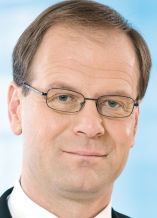
Navracsics | 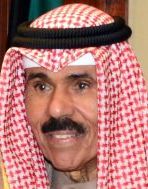
Nawaf |
Navracsics, Tibor (b. June 13, 1966, Veszprém, Hungary), a deputy prime minister (2010-14), justice minister (2010-14), and foreign minister (2014) of Hungary. He has also been EU commissioner for education, culture, youth, and sport (2014-19) and minister without portfolio for regional development and utilization of EU funds (2022- ).
Navratil, Miroslav, also called Friedrich Navratil (b. July 19, 1893, Sarajevo, Ottoman Empire [now in Bosnia and Herzegovina] - d. [executed] June 13, 1947, Zagreb, Croatia), armed forces minister of Croatia (1943-44).
Navumau, Uladzimir (Uladzimiravich), Russian Vladimir (Vladimirovich) Naumov (b. Feb. 7, 1956), interior minister of Belarus (2000-09). He was also head of the Presidential Security Service (1999-2000).
Nawaf Al Ahmad Al Jabir Al Sabah, Sheikh (b. June 1937), interior minister (1978-88, 2003-06), defense minister (1988-91, 1992-94), crown prince (2006-20), and emir (2020- ) of Kuwait; son of Sheikh Ahmad Al Jabir Al Sabah.
Nawaz, Sardar Shah (b. March 17, 1917, Dehra Dun, India - d. Jan. 11, 1991, New York), Pakistani diplomat. He was ambassador to Iran (1968-72), foreign secretary (1977-80), and permanent representative to the United Nations (1982-89).
Nawinna, (Ranasinghe Mudiyanselage) S(eneviratne) B(andara) (b. Feb. 24, 1946), chief minister of North Western province, Sri Lanka (1999-2002). He was also Sri Lankan minister of regional infrastructure development (2004-05), rural industries and self-employment promotion (2005-10), national languages and social integration (2010), consumer welfare (2010-15), labour (2015), internal affairs, cultural affairs, and Wayamba development (2015-18), and cultural affairs, internal affairs, and regional development (2018).
Nawwaf (ibn Abdul Aziz Al Saud) (b. Aug. 16, 1932, Riyadh, Saudi Arabia - d. Sept. 29, 2015, Makkah, Saudi Arabia), Saudi prince; son of Abdul Aziz. He was finance minister (1961-62) and head of the General Intelligence Directorate (2001-05).
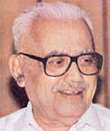
Nayanar |
Nayanar, E(rambala) K(rishnan) (b. Dec. 9, 1919, Kalliasseri, Madras province [now in Kannur district, Kerala state], India - d. May 19, 2004, New Delhi, India), chief minister of Kerala (1980-81, 1987-91, 1996-2001). He gravitated towards the independence struggle during his school days and entered into active politics in the late 1930s when he was elected the Kalliasseri unit secretary of the Indian National Congress. In 1939 he joined the Communist Party. He was first arrested in 1940 for participating in a workers' stir in Aaron Mill in Kannur district. His involvement in the Kayyur agitation of 1941 led to his implication as the third accused in a case relating to the mob lynching of a police inspector. He escaped arrest by remaining underground for seven years, even as three of his co-accused were convicted and hanged to death in 1943. When the Communist Party split in 1964, he sided with the Communist Party of India (Marxist). He served as its district secretary in Kozhikode and Kannur before becoming state secretary in 1972, a post he held for 21 years; he was also a member of the party's politburo from the mid-1980s. He was elected to the Lok Sabha from Palakkad in 1967 but returned to state politics after getting elected to the Kerala state assembly in a 1974 by-election from Irikkur. He was elected again in 1980, 1982, 1987, 1991, and 1996. He was the longest-serving chief minister of the state, with a total of over 10 years. As chief minister, many of his open comments on issues triggered controversies, but in the final count everyone took it in a lighter vein as "Nayanarism." For any question from a journalist, he always had a repartee ready in his typical Malabar slang with a smattering of English words and expressions.
Nayar, V(ijay) K(umar), byname Tubby Nayar (b. October 1931, Ferozepur, Punjab, India - d. Nov. 30, 2015, New Delhi, India), governor of Manipur (1993-94) and Nagaland (1993-94).
Nayar Parada, Guido (Eduardo) (b. Feb. 20, 1962, Santa Cruz, Bolivia), interior minister of Bolivia (1997-99).
Nayef (ibn Abdul Aziz Al Saud) (b. 1933 - d. June 16, 2012, Geneva, Switzerland), Saudi prince; son of Abdul Aziz. He was governor of Riyadh (1952-54) and Madinah (1954-60), interior minister (1975-2012), second deputy prime minister (2009-11), and crown prince and first deputy prime minister (2011-12).

Nazarbayev |
Nazarbayev, Nursultan (Abishevich), Kazakh Nursultan Abish-uly Nazarbayev (b. July 6, 1940, Chemogan village, Kaskelen district, Alma-Ata oblast, Kazakh S.S.R.), president of Kazakhstan (1990-2019); nephew-in-law of Syzdyk Abishev. He joined the Communist Party of the Soviet Union (CPSU) in 1962, became a party official in Temirtau in 1969, and in 1977 was elected second secretary of the Karaganda oblast party committee. He became a full member of the Kazakh Communist Party Politburo in 1979 and was chairman of the Kazakh S.S.R. Council of Ministers in 1984-89. He was rejected by Soviet leader Mikhail Gorbachev in 1986 as successor to Dinmukhamed Kunayev as first secretary of the Kazakhstan party. However, Gennady Kolbin, Gorbachev's appointee and an ethnic Russian, was a disaster, and Nazarbayev stepped up to take over (1989-91). He was also a full member of the CPSU Politburo (1990-91). He was bitter about the treatment of the republic as a virtual colony by Moscow, and this stimulated his demands for sovereignty. He was elected by the Supreme Soviet of Kazakhstan as president of the republic in April 1990. Invited by Gorbachev to run as his vice president, he turned the offer down when he discovered the post carried no real power. The movement for an economic union of republics was initiated in Alma-Ata in July 1991. When it became clear that the U.S.S.R. was dissolving, Kazakhstan led the Central Asian republics into the new Commonwealth of Independent States in December. In 1999 he was reelected in a vote that drew sharp criticism from international observers. In June 2000 parliament approved legislation that would give him formal access to officials, parliament, and future presidents to discuss key policy issues and award him a permanent place on the republic's Security Council. In 2005 he was again reelected in a poll that observers said was neither free nor fair, and similarly in 2011 and 2015. He suddenly resigned in 2019, but remained chairman of the Security Council and of the ruling Nur Otan party. He also held the title Elbasy ("leader of the nation"), bestowed in 2010. After his resignation the city of Astana (which he made the country's capital in 1997) was renamed Nur-Sultan. The party leadership was transferred to his successor, Pres. Kasymzhomart Tokayev, in 2021, and following public unrest in 2022 he was also stripped of his Security Council role; later that year the name of the capital was changed back to Astana.
Nazarbayeva, Dariga (Nursultanovna) (b. May 7, 1963, Temirtau, Karaganda oblast, Kazakh S.S.R.), Kazakh politician; daughter of Nursultan Nazarbayev; former wife of Rakhat Aliyev. She was a deputy prime minister (2015-16) and chairman of the Senate (2019-20).
Nazari, Enayatullah (b. 1954, Parwan province, Afghanistan), Afghan politician. He was minister of refugees and repatriation (2001-04) and acting defense minister (2012, 2014-15).
Nazarov, Aleksandr (Viktorovich) (b. Feb. 24, 1951), chairman of the Executive Committee (1990-91) and head of the administration (1991-2001) of Chukotka autonomous okrug.
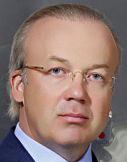
Andrey Nazarov |
Nazarov, Andrey (Gennadiyevich) (b. April 28, 1970, Baymak, Bashkir A.S.S.R., Russian S.F.S.R.), prime minister of Bashkortostan (2020- ).
Nazarov, Mukhammed (Nazarovich), Turkmen Muhammet (Nazarowiç) Nazarow, a deputy prime minister of Turkmenistan (2001-02). He was also chairman of the Committee for National Security (1996-2002).

S. Nazarov | 
T. Nazarov | 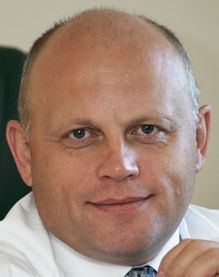
V. Nazarov |
Nazarov, Semyon (Nikolayevich) (b. 1953), prime minister of Sakha (2002-03).
Nazarov, Talbak (Nazarovich) (b. March 15, 1938, Kangurt village, Tadzhik S.S.R. [now in Khatlon province, Tajikistan]), foreign minister of Tajikistan (1994-2006). He was also minister of education (1988-91).
Nazarov, Viktor (Ivanovich) (b. Oct. 18, 1962, Ingaly, Bolsherechensky rayon, Omsk oblast, Russian S.F.S.R.), governor of Omsk oblast (2012-17).
Nazarshoyev, Moyensho (Nazarshoyevich) (b. Dec. 17, 1929, Khosa, Gorny Badakhshan, Tadzhik S.S.R. - d. [killed] March 10, 1994, Dushanbe, Tajikistan), first secretary of the Communist Party committee of Gorno-Badakhshan autonomous oblast (1963-70). He was also a deputy prime minister of Tajikistan (1994).
Nazary, secular name Nikolay (Mikhailovich) Blinov (b. Jan. 24, 1852, Kazan, Russia - d. June 18, 1930, Tobolsk, Russia), Locum Tenens of Kiev (1919-21). He was bishop of Cherkassy (1910-21) and archbishop of Tobolsk (1925-28).
Nazaryan, Karen (Arshakovich) (b. Nov. 29, 1966, Yerevan, Armenian S.S.R.), Armenian diplomat. He has been ambassador to Iran (2005-09) and the Vatican (2019- ) and permanent representative to the United Nations (2009-14).
Nazdratenko, Yevgeny (Ivanovich) (b. Feb. 16, 1949, Severo-Kurilsk, Sakhalin oblast, Russian S.F.S.R.), head of the administration (1993-95) and governor (1995-2001) of Primorsky kray. He was also chairman of Russia's State Committee for Fisheries (2001-03).
Nazeer, S(yed) Abdul (b. Jan. 5, 1958, Beluvai, Mysore [now Karnataka], India), governor of Andhra Pradesh (2023- ).
Nazer, Hisham (Mohieddin) (b. Aug. 31, 1932, Riyadh, Saudi Arabia - d. Nov. 14, 2015, United States), Saudi politician. He was minister of planning (1975-91) and petroleum and mineral resources (1986-95) and ambassador to Egypt (2005-11).
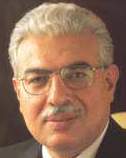
Nazif |
Nazif, Ahmed (Mahmoud Mohamed) (b. July 8, 1952, Cairo, Egypt), prime minister of Egypt (2004-11). He was also minister of communications and information technology (1999-2004).
Nazim, Mohamed, defense minister of Maldives (2012-15).
Nazimov, Vladimir (Ivanovich) (b. Dec. 22 [Dec. 10, O.S.], 1802 - d. Feb. 23 [Feb. 11, O.S.], 1874), governor-general of Vilna, Kovno, and Grodno (1855-63); son-in-law of Aleksandr Averkiyev.
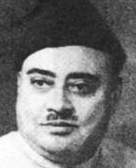
Nazimuddin |
Nazimuddin, Khwaja (b. July 19, 1894, Dacca, Bengal, India [now Dhaka, Bangladesh] - d. Oct. 22, 1964, Dacca, East Pakistan [now Dhaka, Bangladesh]), chief minister of Bengal (1943-45) and East Bengal (1947-48) and governor-general (1948-51) and prime minister (1951-53) of Pakistan. He was elected chairman of the Dacca Municipal Council in 1922 and served until 1929. He also established the Star of India, the first English-language newspaper under Muslim ownership. He was education minister (1929-34) and home minister (1937-41) of Bengal and was knighted in 1934. He rose to chief minister, but was marginalized by the more progressive elements of the Bengal Muslim League by the time of the 1946 provincial elections; he relinquished his knighthood the same year. Huseyn Shaheed Suhrawardy's removal from the scene at the time of Pakistan's creation (he remained in the Indian part of Bengal) enabled the Dacca Muslim League old guard led by Nazimuddin to stage a political comeback. He was appointed chief minister of East Bengal and held this post until Mohammad Ali Jinnah's death in 1948, when he succeeded him as governor-general of Pakistan, bringing a much less interventionist role to this office. He became prime minister following the assassination of Liaquat Ali Khan in 1951. His advocacy of the Urdu language and his inactivity during anti-Ahmadi riots contributed to his dismissal by Governor-General Ghulam Mohammad in 1953, amid his government's inability to cope with a severe economic crisis. He vainly attempted to telephone Queen Elizabeth II to order the dismissal of the governor-general. He remained active in politics until Mohammad Ayub Khan seized power in 1958 and emerged from retirement in 1962 to lead the Council Muslim League in opposition to the government of Ayub Khan.
Nazor, Vladimir (b. 1876 - d. June 15, 1949), chairman of the Anti-Fascist Council of People's Liberation (1943-45) and president of the Presidium of the People's Assembly (1945-49) of Croatia.
Nazorov, Ivan (Ivanovich) (d. 1859), governor of Erivan (1849-59).
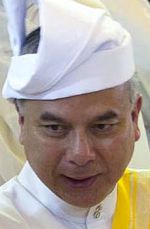
Nazrin |
Nazrin Muizzuddin Shah ibni al-Marhum Sultan Azlan Muhibuddin Shah, Tuanku (b. Nov. 27, 1956, Penang, Malaya [now in Malaysia]), sultan of Perak (2014- ) and acting yang di-pertuan agong of Malaysia (2019).
Nchimbi, Emmanuel (John) (b. Dec. 24, 1971), home affairs minister of Tanzania (2012-13). He has also been minister of information, youth, culture, and sports (2010-12) and ambassador to Brazil (2017-21) and Egypt (2022- ).
Ndabaniwe, Joseph (b. March 6, 1940), Burundian diplomat. He was ambassador to Ethiopia (1970-73) and the United States (1973-76) and permanent representative to the United Nations (1973-76).
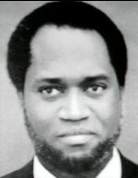
Ndadaye |
Ndadaye, Melchior (b. March 28, 1953, Murama, Nyabihanga commune, Muramvya province, Burundi - d. Oct. 21, 1993, near Bujumbura, Burundi), president of Burundi (1993). He fled to neighbouring Rwanda during the massacres of 1972 which followed a Hutu revolt. In Rwanda he founded the Burundi Progressist Student Movement in 1976 and participated in the founding of the Workers' Party of Burundi in 1979. He resigned from the party and returned to Burundi in 1983 and in 1989 was appointed adviser to the rural development ministry. In 1986 he had secretly created the Front for Democracy in Burundi (Frodebu), which was legalized under Pres. Pierre Buyoya's new constitution in March 1992. He defeated Buyoya in the country's first multiparty presidential elections held in June 1993 and took office in July as the first civilian and the first Hutu president of Burundi. Frodebu and two allied parties also won two-thirds of the seats in the National Assembly. The elections marked not only the end of 26 years of military rule but also of centuries of domination of the Hutu ethnic majority by the Tutsi, who initially accepted their historic defeat. Ndadaye, known for his calm demeanour, appointed a broadly based government, including a woman prime minister (a Tutsi), and promised to work for national reconciliation and to strengthen Burundi's human rights. His reign was abruptly ended, however, when he was killed, along with the National Assembly speaker and other officials, in an abortive coup masterminded by former president Jean-Baptiste Bagaza and led by Army Chief of Staff Lt.Col. Jean Bikomagu.
Ndagijimana, Jean-Marie (Vianney), foreign minister of Rwanda (1994). He was ambassador to France in 1990-94.
Ndakolo, Penda ya (b. March 23, 1960, Oshigambo, Oshikoto region, South West Africa [now Namibia]), defense minister of Namibia (2015-20). He was also governor of Oshikoto (2004-15).
Ndamase, Tutor Nyangelizwe Vulindlela (b. Jan. 11, 1921, Umtata, South Africa - d. Feb. 21, 1997, West amaPondo, Eastern Cape province, South Africa), paramount chief of West amaPondo (1974-97) and president of Transkei (1986-94).
Ndambu Wolang, Richard (b. March 10, 1952), governor of Bandundu (2007-12).
Ndaruzaniye, Gamaliel (b. July 19, 1952, Bugendana, Burundi), Burundian politician. He was minister of labour and vocational training (1987-88) and primary and secondary education (1988-92), ambassador to Tanzania, Mozambique, Zambia, and Zimbabwe (1992-93), and permanent representative to the United Nations (1997-99).
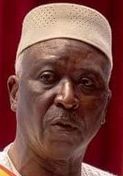
N'Daw | 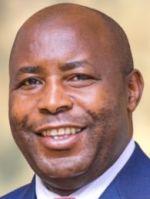
Ndayishimiye |
N'Daw, Bah, also spelled Ba N'Daou (b. Aug. 23, 1950, San, French Sudan [now Mali]), defense minister (2014-15) and transitional president (2020-21) of Mali.
Nday a Mande (d. [killed] 1889), king of the Luba (1886-89).
Ndayirukiye, Cyrille (b. July 8, 1954, Kiganda, Burundi - d. April 24, 2021, Gitega, Burundi), defense minister of Burundi (2000-02).
Ndayishimiye, Evariste (b. 1968, Giheta, Gitega province, Burundi), interior minister (2006-07) and president (2020- ) of Burundi.
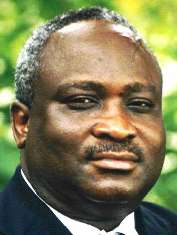
Ndayizeye | 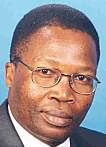
Ndebele |
Ndayizeye, Domitien (b. May 2, 1953, Murango, Kayanza province, Burundi), vice president (2001-03) and president (2003-05) of Burundi. A Hutu and member of the Frodebu party, he was the last president in an interim government put in place under a UN-backed peace plan to end a civil war that killed at least 300,000 people. He was arrested on Aug. 21, 2006, after he was questioned concerning an alleged plot to assassinate Pres. Pierre Nkurunziza; he was freed on Jan. 16, 2007, after the Supreme Court acquitted him of the charges. He was a minor presidential candidate in 2020.
Ndebele, S'bu, byname of Joel Sibusiso Ndebele (b. Oct. 17, 1948, Shiyane [Rorke's Drift], near Dundee, Natal [now in KwaZulu-Natal], South Africa), premier of KwaZulu-Natal (2004-09). He has also been South African minister of transport (2009-12) and correctional services (2012-14) and high commissioner to Australia (2014-16) and India (2019- ).
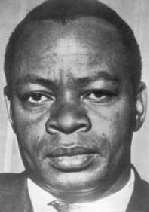
A. Ndele |
Ndele, Albert (b. Aug. 15, 1930, Boma, Belgian Congo [now Congo (Kinshasa)]), chairman (1960) and deputy chairman (1960-61) of the board of commissioners-general and finance minister (1960-61, 1970) of Congo (Léopoldville/Kinshasa).
Ndele, José (de Assunção Alberto) (b. Aug. 13, 1940, Cabinda, Angola), co-prime minister of the Democratic People's Republic of Angola (1975-76).
N'Dia Koffi, Blaise (b. Dec. 28, 1912, Pakouabo, Ivory Coast [now Côte d'Ivoire] - d. May 10, 1983, Abidjan, Ivory Coast), Ivorian politician. He was minister of public health and population (1963-70) and tourism (1974-76) and a minister of state (1970-76).
N'Diayane, Mohamed Lemine Ould (b. 1950, Chinguetti, Mauritania - d. June 8, 2003, Nouakchott, Mauritania), foreign minister of Mauritania (1986-88). He was named army chief of staff on Dec. 27, 2001. He was killed during a coup attempt when a tank opened fire in the direction of his office and struck the building after he refused to surrender to the insurgents.
Ndiaye, Aly Ngouille (b. Aug. 16, 1964, Linguère, Senegal), interior minister of Senegal (2017-20). He was also minister of energy and mines (2012-13) and industry and mines (2013-17).
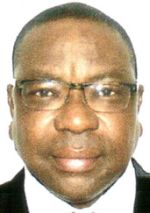
Mankeur Ndiaye |
Ndiaye, Mankeur (b. March 15, 1960, Dagana, Senegal), foreign minister of Senegal (2012-17). He was also ambassador to Mali (2010-12) and France (2012) and UN secretary-general's special representative and head of the UN Multidimensional Integrated Stabilization Mission in the Central African Republic (2019-22).
Ndiaye, Mbaye, interior minister of Senegal (2012).
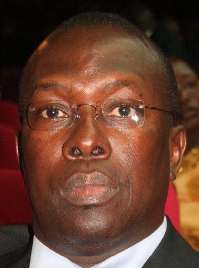
S.N. Ndiaye |
Ndiaye, Souleymane Ndéné (b. Aug. 6, 1958, Kaolack, Senegal), prime minister of Senegal (2009-12). He was also minister of civil service, labour, employment, and professional organizations (2005), environment and protection of nature (2007), and maritime economy (2007-09).
N'diaye, Valdiodio (b. April 7, 1923, Kaolack, Senegal - d. May 5, 1984), interior minister (1957-62), defense minister (1960-61), and finance minister (1962) of Senegal. He was also mayor of Kaolack (1960-62).
Ndimira, Pascal-Firmin (b. April 9, 1956, Muyinga, northeastern Burundi), prime minister of Burundi (1996-98).
Ndinga Oba, Antoine (b. 1941, Biala village, near Oyo, Cuvette region, Middle Congo [now Congo (Brazzaville)] - d. May 17, 2005, Paris, France), foreign minister of Congo (Brazzaville) (1984-91); cousin of Denis Sassou-Nguesso. A linguist, he was also rector of the University of Brazzaville (1976-77), national education minister (1977-84), and ambassador to UNESCO (1999-2005).
Ndioro (à Yombo), Justin (b. Jan. 5, 1949, Kiiki, near Bafia, French Cameroons [now in Cameroon] - d. Jan. 28, 2007, Paris, France), finance minister of Cameroon (1991-92, 1994-96). He was also minister of economy (1994-96), industrial and commercial development (1996-97), and public investments and territorial development (1997-2000).
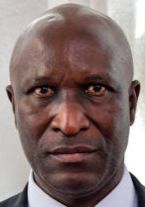
Ndirakobuca |
Ndirakobuca, Gervais, byname Ndakugarika (b. Aug. 1, 1970, Bukinanyana [now in Cibitoke province], Burundi), interior minister (2020-22) and prime minister (2022- ) of Burundi.
N'Djadder-Bedaya, François (b. 1943 - d. May 28, 2001, Bangui, Central African Republic), Central African Republic politician. He was minister of territorial administration and public security (1997-99). While serving as director-general of the national gendarmerie, he was killed during a failed coup attempt.
Ndo Edou, Daniel (d. [killed by French soldiers] Feb. 19, 1964, Libreville, Gabon), member of the Revolutionary Committee of Gabon (1964).
Ndolou, Jacques Yvon (b. May 3, 1944, Bohoulou, near Mossaka, Middle Congo [now Congo (Brazzaville)]), defense minister of Congo (Brazzaville) (2002-09). He was also chief of staff of the armed forces (1999-2002), minister of sports and physical education (2009-11), and ambassador to Germany (2012-17) and the Central African Republic (2017-18).
N'Dong, Léon (b. Feb. 15, 1935, Libreville, Gabon - d. Jan. 5, 2005, Le Plessis-Robinson, Hauts-de-Seine, France), Gabonese diplomat. He was ambassador to Central African Republic and Sudan (1972-73), Morocco (1973-74), the United Kingdom (1980-86), West Germany (1986-90), Sweden (1987-90), and Norway and Denmark (1988-90) and permanent representative to the United Nations (1976-80).
Ndong Ela Mangue, Julio (b. 1947, Nkodjoen-San Carlos, Spanish Guinea [now Equatorial Guinea]), interior minister of Equatorial Guinea (1992-98). He was also secretary-general of the presidency (1984-86).
Ndong Ella, Baudelaire (b. May 9, 1967, Oyem, Gabon), Gabonese diplomat. He has been chargé d'affaires in Ethiopia (2007-09), permanent representative to the United Nations (2015-17), and ambassador to China (2017- ).
Ndong Mba, Anatolio (b. July 3, 1946, Spanish Guinea [now Equatorial Guinea]), Equatorial Guinean politician. He has been minister of agriculture, livestock, fisheries, and forestry (1989-92), planning and international cooperation (1992-93), economy and finance (1993-96), and fisheries and forestry (1996-97), deputy prime minister (1993-96), and permanent representative to the United Nations (2010- ).
Ndong Micha, Ángel (b. 1945), justice minister of Equatorial Guinea (1984-92). He was also minister of labour, social security, and advancement of women (1982-84).
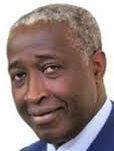
Ndong Sima |
Ndong Sima, Raymond (b. Jan. 23, 1955, Oyem, Gabon), prime minister of Gabon (2012-14). In 2009-12 he was agriculture minister. He was a minor presidential candidate in 2016.
Ndongo Miyone, Atanasio (b. 1928? - d. [assassinated] March 1969), foreign minister of Equatorial Guinea (1968-69).
Ndoutingaï, Sylvain (b. May 24, 1972, Bossangoa, Central African Republic), finance minister of the Central African Republic (2007, 2011-12); nephew of François Bozizé. He was also minister of mines, energy, and water resources (2003-11).
Ndoye, Doudou (b. Aug. 4, 1944, Dakar, Senegal), Senegalese politician. He was justice minister (1983-86) and a minor presidential candidate (2007, 2012).
Nduhuura, Richard (b. Feb. 17, 1956), Ugandan diplomat. He has been permanent representative to the United Nations (2013-17) and ambassador to France (2017- ).

Ne Win |
Ne Win, original name Shu Maung (b. May 24, 1911, Paungdale, Burma [now Myanmar] - d. Dec. 5, 2002, Yangon, Myanmar), Burmese general. He became involved in the struggle for Burmese independence from the British in the mid-1930s and took the revolutionary name Ne Win, which means "brilliant as the sun." After Burma gained independence in 1948, he served as the second commander in chief of the army. In 1958 he was appointed prime minister in a caretaker government after former prime minister Nu's administration had failed to suppress ethnic insurgencies. He stepped down in 1960 after Nu's reelection and the restoration of parliamentary government. However, on March 2, 1962, he staged a coup d'état, imprisoning Nu and establishing a Revolutionary Council, whose members were drawn almost exclusively from the armed forces. He combined a military dictatorship with a socialist economic program and steered a neutralist course in foreign policy. He founded the Burmese Socialist Program Party (BSPP), dominated by military officers, which became the only legal party in 1964. He was chairman of the Revolutionary Council and prime minister in 1962-74, then president in 1974-81, and subsequently remained the country's preeminent leader as chairman of the BSPP. He was also defense minister (1949-50, 1958-60, 1962-72). By the late 1980s, his policies had turned Burma into one of the world's poorest countries. A deep belief in numerology prompted him in 1987 to issue bank notes in 45 and 90 kyat denominations because the numbers were divisible by his lucky number, nine. In late 1987 widespread anti-government rioting broke out in the major cities, prompting him in July 1988 to resign from the BSPP chairmanship. The BSPP was replaced by the State Law and Order Restoration Council, which was also headed by military officers. Ne Win at first remained active behind the scenes, but was later disowned by his former protégés and was put under house arrest in March 2002.
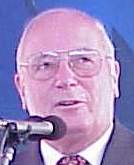
E. Neal |
Neal, Sir Eric (James) (b. June 3, 1924, London, England), administrator (1987) and chief commissioner (1987-88) of Sydney and governor of South Australia (1996-2001); knighted 1982.
Neal Phleng (b. 1900 - d. 1964), foreign minister of Cambodia (1951). He was also minister of health (1949-51) and public works and communications (1953-54, 1955).
Nebenzya, Vasily (Alekseyevich) (b. Feb. 26, 1962, Volgograd oblast, Russian S.F.S.R.), Russian diplomat. He has been permanent representative to the United Nations (2017- ).
Nebias, Joaquim Octavio (b. June 1, 1811, Santos, Brazil - d. July 16, 1872, Rio de Janeiro, Brazil), president of São Paulo (1852) and justice minister of Brazil (1870).
Nébié, Georges Bamina (b. 1917, Yallé, Upper Volta [now Burkina Faso] - d. Jan. 8, 2008, Ouagadougou, Burkina Faso), defense minister of Upper Volta (1961-62). He was also minister of education (1959-60), public works (1961), and commerce, industry, economic affairs, and mines (1962) and ambassador to the Soviet Union (1968-73).
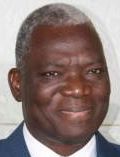
M. Nébié |
Nébié, (Bédializoun) Moussa (b. Sept. 8, 1959, Pouni, Upper Volta [now Burkina Faso]), foreign minister of Burkina Faso (2015, 2015-16). He was also chargé d'affaires in Switzerland (2003-08) and ambassador to Egypt, Sudan, Israel, Jordan, and Syria (2008-14).

Nebot |
Nebot (Saadi), Jaime (José) (b. Oct. 22, 1946, Guayaquil, Ecuador), Ecuadorian politician; son of Jaime Nebot Velasco. The former governor of Guayas province (1984-88) was the presidential candidate of the right-wing Social Christian Party in 1992 and 1996. In 1996 he presented himself as the sensible and responsible option to Abdalá Bucaram, an outrageous showman who sang, danced, and screamed during campaign appearances. Nebot called Bucaram a "living lie" for having assets of more than $2 million while championing the poor, and aired television spots showing Bucaram insulting his rivals with crude language. "It is a fight between good and evil, the evil represented by Bucaram," said Nebot, who supported free-market policies and said he would deepen the cuts in the state bureaucracy made by Pres. Sixto Durán Ballén. Nebot was the favourite throughout most of the campaign and came out on top of a nine-candidate pack in the first round of voting May 19, with 27%, but lost in the runoff to Bucaram. He disappointed his party by refusing to run again in 1998, but in 2000 was elected mayor of Guayaquil (reelected in 2004, 2009, and 2014, serving until 2019).
Nebot Velasco, Jaime (b. Dec. 28, 1921, Guayaquil, Ecuador), interior minister of Ecuador (1971-72). He was also minister of development and mines (1960-61).
Nebout, Albert (Anatole) (b. Sept. 28, 1862, Auffay, Seine-Inférieure [now Seine-Maritime], France - d. Sept. 23, 1939), acting governor of Ivory Coast (1902, 1907-08) and acting lieutenant governor of Haut-Sénégal-Niger (1917).
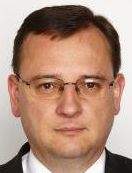
Necas |
Necas, Petr (b. Nov. 19, 1964, Uherské Hradiste, Czechoslovakia [now in Czech Republic]), prime minister (2010-13) and acting defense minister (2012-13) of the Czech Republic. He first entered parliament on the Civic Democrats' ticket in 1992 and was a deputy prime minister and labour and social affairs minister in 2006-09. He was elected chairman of the Civic Democrats in June 2010, the same month he became prime minister. Regarded as personally untainted by scandal, he vowed to clean up the reputation of his party but later met some opposition from within. The main achievements of his government were a church restitution bill and reform of the pension system. He resigned in 2013 when charges of bribery were filed against his close personal aide, Jana Nagyová; she was also charged with ordering military intelligence chiefs to spy on the prime minister's wife. Her arrest was part of an unprecedented police operation that also saw seven other people charged, among them three former MPs from the Civic Democrats. Necas also stepped down as party leader and left politics entirely.
Nechayev, Stepan (Dmitriyevich) (b. July 29 [July 18, O.S.], 1792 - d. Sept. 17 [Sept. 5, O.S.], 1860, Storozhevaya Sloboda, Ryazan province, Russia), Russian official. He was chief procurator of the Holy Synod (1833-36).
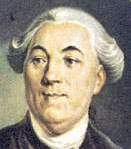
Necker |
Necker, Jacques (b. Sept. 30, 1732, Geneva, Switzerland - d. April 9, 1804, Coppet, Switzerland), finance minister of France (1777-81, 1788-89, 1789-90). The Genevan republic appointed him its resident minister in Paris in 1768; he also became a director of the French East India Company. He was placed in virtual control of French finances, as director of the royal treasury, on Oct. 22, 1776, and was appointed director-general of the finances on June 29, 1777 (he was not given the regular title of controller-general because he was a Protestant). He introduced administrative reforms and enjoyed a high degree of public confidence. His principal mistake was his attempt to finance French participation in the American War of Independence without additional taxation. In trying to raise the necessary loans, he published in 1781 his famous Compte rendu au Roi, claiming a surplus of 10,000,000 livres in the hope of concealing an actual deficit of 46,000,000. The opposition of the leading minister, Jean-Frédéric Phelypeaux, comte de Maurepas, and the hostility of Queen Marie Antoinette forced Necker to resign shortly afterward. After Charles Alexandre de Calonne and others had failed to solve the financial problems for which Necker was at least partially responsible, Necker himself was recalled to office in August 1788, when France was on the verge of bankruptcy. He supported the convocation of the Estates-General and became virtual prime minister. His objective was a limited constitutional monarchy. When he was dismissed and exiled in July 1789, disturbances in Paris followed, culminating in the storming of the Bastille. Again, public opinion compelled King Louis XVI to recall him, but in his third ministry he was overshadowed by Talleyrand and the Comte de Mirabeau and he finally resigned in September 1790.
Nedelin, Gennady (Pavlovich) (b. May 20, 1938), chairman of the Executive Committee (1990-91) and head of the administration (1991-2001) of Taymyr autonomous okrug.
Nedeljkovic, Bogoljub (b. Sept. 3, 1920, Gornje Selo, near Prizren, Yugoslavia [now in Kosovo] - d. April 22, 1986, Belgrade, Serbia), chairman of the Executive Council of Kosovo (1974-78).
Ne'e, Nelson (b. Feb. 2, 1954 - d. March 2013), home affairs minister of the Solomon Islands (2007). He was also minister of tourism and culture (2006).
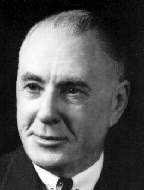
Neely |
Neely, M(atthew) Mansfield (b. Nov. 9, 1874, Grove, W.Va. - d. Jan. 18, 1958, Bethesda, Md.), U.S. politician. He built his congressional reputation on liberalism and sponsorship of prolabour legislation, first as Democratic representative from the 1st West Virginia district (1913-21) and then as U.S. senator (1923-29, 1931-41, and 1949-58; he was congressman again for one term in 1945-47). An apostle of both the New Deal and Fair Deal, Neely never hesitated to belabour Democrats and Republicans alike for opposing liberal legislation. In 1949-50 he led the move that liberalized the displaced persons act. As chairman of the Senate's committee on the District of Columbia he fought unsuccessfully for the national capital's right to the voting franchise. Neely was a vehement critic of Pres. Dwight D. Eisenhower, declaring on one occasion that he was "the worst president we've ever had." Neely was governor of West Virginia from 1941 to 1945.

Neeman |
Neeman, Yaakov (b. Sept. 16, 1939, Tel Aviv, Palestine [now in Israel] - d. Jan. 1, 2017), finance minister of Israel (1997-98). He was director-general of the Ministry of Finance in 1979-81 and served as justice minister from June to August 1996. He resigned from Benjamin Netanyahu's government in 1998, saying splits in the coalition over peace with the Palestinians were preventing passage of the 1999 budget. Later he was again justice minister (2009-13).
Neergaard, Johan Valdemar (b. April 18, 1810, Haslev, Denmark - d. July 9, 1879, Copenhagen, Denmark), war minister of Denmark (1865-66).
Neergaard, Niels (Thomasius) (b. June 27, 1854, Ugilt, Denmark - d. Sept. 2, 1936, Copenhagen, Denmark), finance minister (1908, 1909, 1910-13, 1920-24, 1926-29), prime minister (1908-09, 1920-24), and defense minister (1908-09) of Denmark.
Neev, Neycho (Hristov) (b. Feb. 10, 1948, Prisadets, Bulgaria), a deputy prime minister of Bulgaria (1992-93). He was also minister of transport (1992-93).
Neewoor, Anund Priyay (b. June 26, 1940, Mauritius), Mauritian diplomat. He was ambassador to Pakistan (1983), the Soviet Union/Russia, Burma/Myanmar, Nepal, and Thailand (1983-93), and the United States (1993-96), high commissioner to India, Bangladesh, Malaysia, and Sri Lanka (1983-93) and Canada and Guyana (1993-96), and permanent representative to the United Nations (1999-2001).
Nef Jara, Francisco (b. Aug. 3, 1863, Valparaíso, Chile - d. June 9, 1931, Viña del Mar, Chile), finance minister of Chile (1924). He was also director-general of the navy (1922-24).
Nefedov, Aleksandr (Petrovich) (b. March 22, 1955, Ardatov, Mordovian A.S.S.R., Russian S.F.S.R.), chairman of the government of Samara oblast (2007-19). He was also mayor of Novokuybyshevsk (1991-2007).
Nefedov, Pyotr (Petrovich) (b. Oct. 29, 1941, Sorokino, Belgorod oblast, Russian S.F.S.R. - d. Feb. 15, 2021), head of Karaganda oblast (1992-97).
Neffati, Chédli (b. March 15, 1946, Gabès, Tunisia), interior minister of Tunisia (1988-90). He was also governor of Kairouan (1982-84) and Béja (1984-87), minister of justice (1990-91) and social affairs and solidarity (1996-2001, 2002-05), and ambassador to Egypt (2005-07).
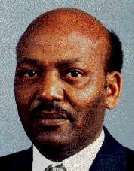
Negasso |
Negasso Gidada (b. Sept. 8, 1943, Dembi Dolo, Ethiopia - d. April 27, 2019, Germany), president of Ethiopia (1995-2001). He was also minister of labour and social affairs (1991-93) and information (1993-95). In 1978-91 he was in exile in Germany.
Negovanovic, Marko (b. Sept. 24, 1935, Ostra, near Cacak, Yugoslavia [now in Serbia]), defense minister of Serbia (1991-93).
Negrete (y) de la Torre, Manuel (José Antonio Hilario), (I) marqués de Torre-Manzanal, (II) conde y (I) duque del Campo de Alange (b. Jan. 15, 1736, Madrid, Spain - d. March 13, 1818, Paris, France), war minister (1790-95) and foreign minister (1808-11) of Spain. He was also ambassador to Austria (1795-1802), Portugal (1802-07), and France (1811-13).
Negri, Ramón P. de (b. Aug. 27, 1887, Hermosillo, Sonora, Mexico - d. Oct. 20, 1955, Mexico City, Mexico), Mexican politician. He was minister of agriculture (1922-24) and industry, commerce, and labour (1929-30) and ambassador to Germany (1926-29), Austria (1927-29), Belgium (1930-33), Chile (1936-37), and Spain, Portugal, and Turkey (1937).
Negrín López, Juan (b. Feb. 3, 1894, Las Palmas, Gran Canaria, Spain - d. Nov. 12, 1956, Paris, France), prime minister of Spain (1937-45, from 1939 in exile). He was also finance minister (1936-38) and defense minister (1938-45, from 1939 in exile).

Negroponte |
Negroponte, John (Dimitri) (b. July 21, 1939, London, England), U.S. ambassador to the United Nations (2001-04). Earlier he was ambassador to Honduras (1981-85), Mexico (1989-93), and the Philippines (1993-96). In 2004 he became ambassador to Iraq but left this post in 2005 after being nominated to the new position of national intelligence director. In 2007-09 he was deputy secretary of state.
Negruta, Veaceslav (b. March 4, 1972, Delacau, Moldavian S.S.R. [now in Transnistria, Moldova]), finance minister of Moldova (2009-13).
Negulescu, Ion (b. April 1, 1887, Turnu Magurele, Teleorman county, Romania - d. April 1, 1949, Jilava, Ilfov county, Romania), war minister of Romania (1944-45).
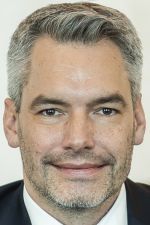
Nehammer |
Nehammer, Karl (b. Oct. 18, 1972, Vienna, Austria), interior minister (2020-21) and chancellor (2021- ) of Austria. He has also been chairman of the Austrian People's Party (2021- ).
Nehru, Braj Kumar (b. Sept. 4, 1909, Allahabad, United Provinces [now Prayagraj, Uttar Pradesh], India - d. Oct. 31, 2001, Kasauli, Himachal Pradesh, India), Indian diplomat. He was born into the family that produced India's first prime minister, Jawaharlal Nehru. While members of his family were imprisoned in the campaign for India's freedom, Nehru joined the British-run Indian civil service in 1934. He told his examiners that if he could not help his people by performing his job, he would resign. He said his honesty got him the job. After independence, he lamented the corruption and lack of service in the bureaucracy. "I had to remember that I was not a ruler of the people, but their servant, working for their benefit," he said in a 1999 speech. He nearly became the United Nations' second secretary-general, declining the post that went to Dag Hammarskjöld of Sweden in 1953. He served as India's ambassador to the United States (1961-68) and high commissioner to the United Kingdom (1973-77). In 1968-73 he was governor of India's northeastern states, and later of Jammu and Kashmir in the north (1981-84) and Gujarat in the west (1984-86). He also served as chairman of the United Nations Investments Committee (1977-91).

J. Nehru |
Nehru, Jawaharlal, byname Pandit (Hindi: "Pundit," or "Teacher") Nehru (b. Nov. 14, 1889, Allahabad, United Provinces [now Prayagraj, Uttar Pradesh], India - d. May 27, 1964, New Delhi, India), prime minister and foreign minister of India (1947-64). His close association with the Congress Party dates from 1919. He was its general secretary in 1923-25 and 1927-29 and its president in 1929-31, 1935-38, and 1951-55. He served nine periods of detention between 1921 and 1945, totalling more than nine years in jail. When Britain agreed to grant independence, the question remained whether India was to consist of one or more independent states. While Mohandas Gandhi refused to accept partition, Nehru reluctantly but realistically acquiesced, and on Aug. 15, 1947, India and Pakistan emerged as two separate, independent countries. Nehru, who had been the principal minister in an interim government since September 1946, became independent India's first prime minister and his party won great majorities in the 1951-52, 1957, and 1962 general elections. In the early years after independence, anticolonialism was the cornerstone of his foreign policy, later substituted by nonalignment. His moral influence was a recognized element in the international situation. In 1956 he drew criticism when he was quick to condemn the Israeli-British-French attack on Egypt but slow to denounce the Soviet invasion of Hungary. In 1961 he seized Portuguese India by force, after years of persuasion had failed. In 1962, when China threatened to overrun the Brahmaputra River valley as a result of a long-standing border dispute, Nehru called for Western aid, and China withdrew. This confrontation dented his image, but he continued to command the affection of the Indian masses. He died in office.
Neil, Stafford Oliver, Jamaican diplomat. He was ambassador to Venezuela, Colombia, Argentina, Brazil, and Ecuador (1987-89), Suriname (non-resident, 1989-94), Cuba (non-resident, 1995-97), and Brazil (non-resident, 1997-2002), high commissioner to Trinidad and Tobago, Antigua and Barbuda, Barbados, Saint Lucia, Saint Kitts and Nevis, Saint Vincent and the Grenadines, Grenada, Dominica, and Guyana (1989-94), and permanent representative to the United Nations (2002-06).
Neira Menéndez, (Antonio) Xavier (b. July 25, 1947), Ecuadorian politician. He was minister of industry, trade, and integration (1984-87) and a presidential candidate (2002).
Neiva, Artur (b. March 22, 1880, Salvador, Bahia, Brazil - d. June 6, 1943, Rio de Janeiro, Brazil), federal interventor in Bahia (1931). He was also director of the National Museum (1923-27).
Neiva, Tude Soares (b. Feb. 28, 1838, Paraíba [now João Pessoa], Paraíba, Brazil - d. July 19, 1901, Rio de Janeiro, Brazil), governor of Bahia (1891).
Neiva, Venâncio Augusto de Magalhães (b. July 21, 1849 - d. Feb. 17, 1939), president of Paraíba (1889-91); brother of Tude Soares Neiva.
Nejad-Hosseinian, Sayyed Mohammad Hadi (b. 1947), Iranian politician. He was minister of roads and transportation (1981-85) and heavy industry (1989-94) and permanent representative to the United Nations (1997-2002).
Nejedlý, Zdenek (b. Feb. 10, 1878, Leitomischl, Austria [now Litomysl, Czech Republic] - d. March 9, 1962, Prague, Czechoslovakia [now in Czech Republic]), a deputy premier of Czechoslovakia (1953). Known as a historian and musicologist, he was also minister of education (1945-46, 1948-53) and labour and social affairs (1946-48) and a minister without portfolio (1953-62).
Neklyudov, Anatoly (Vasilyevich) (b. April 16 [April 4, O.S.], 1856 - d. Sept. 18, 1934, Nice, France), Russian diplomat; grandson of Gavriil Katakazi; nephew of Konstantin (Gavrilovich) Katakazi and Dmitry Zamyatnin. He was minister to Bulgaria (1911-13) and Sweden (1914-17) and ambassador to Spain (1917).
Nekrasov, Nikolai Vissarionovitsh (Nikolay Vissarionovich Nekrasov) (b. Oct. 20?, 1879, St. Petersburg, Russia - d. [executed] May 7, 1940, Moscow, Russian S.F.S.R.), governor-general of Finland (1917). He was also a member of the Russian State Duma (1907-17) and Russian minister of communications (1917), deputy prime minister (1917), and finance minister (1917).
Nelidov, Aleksandr (Ivanovich) (b. June 23 [June 11, O.S.], 1835, Dubrovka, Smolensk province, Russia - d. Sept. 17, 1910, Paris, France), Russian diplomat; grandnephew of Arkady Nelidov. He was minister to Saxony (1879-82), chargé d'affaires in the Ottoman Empire (1882-83), and ambassador to the Ottoman Empire (1883-97), Italy (1897-1903), and France (1903-10).
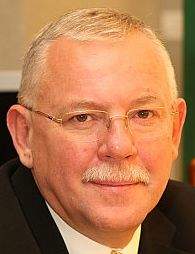
Andrey Nelidov |
Nelidov, Andrey (Vitalyevich) (b. July 12, 1957), head of the republic of Karelia (2010-12).
Nelidov, Arkady (Ivanovich) (b. March 1 [Feb. 18, O.S.], 1773 - d. Sept. 15 [Sept. 3, O.S.], 1834, Reval, Russia [now Tallinn, Estonia]), governor of Kursk (1811-18); son-in-law of Graf Fyodor Buksgevden.
Nelidov, Dmitry (Aleksandrovich) (b. March 19, 1863 - d. Feb. 6, 1935, Paris, France), Russian diplomat; son of Aleksandr Nelidov. He was minister-resident to the Vatican (1912-16) and minister to Belgium (1916-17).
Nelissen, Roelof (Johannus) (b. April 4, 1931, Hoofdplaat, Zeeland, Netherlands - d. July 18, 2019, Hilversum, Noord-Holland, Netherlands), finance minister and a deputy prime minister of the Netherlands (1971-73). He was also minister of economic affairs (1970-71) and Suriname and Netherlands Antilles affairs (1971-72).
Nellemann, Johannes (Magnus Valdemar) (b. Nov. 1, 1831, Copenhagen, Denmark - d. Aug. 26, 1906, Copenhagen), justice minister (1875-96) and foreign minister (1892) of Denmark.
Nelli Feroci, Ferdinando (b. Dec. 18, 1946, Pisa, Italy), Italian diplomat. He was EU commissioner for industry and entrepreneurship (2014).
Nelson, Bill, byname of Clarence William Nelson (b. Sept. 29, 1942, Miami, Fla.), administrator of the National Aeronautics and Space Administration (2021- ). He was a member of the U.S. House of Representatives (1979-91) and Senate (2001-19). In 1986 he flew aboard the space shuttle Columbia.
Nelson, Blamo, internal affairs minister of Liberia (2012-13). He has also been ambassador to Japan (2019- ).
Nelson, Brendan (John) (b. Aug. 19, 1958, Coburg, Vic.), Australian politician. A member of the Australian Labor Party in the 1980s, he switched to the Liberals and won the safe Liberal seat of Bradfield, in Sydney, in 1996. In the Liberal ministry of John Howard he was parliamentary secretary to the minister for defence (2001), minister for education, science, and training (2001-06), and minister for defence (2006-07). On the government's defeat he was elected leader of the Liberal Party in November 2007, defeating Malcolm Turnbull by 45 votes to 42, but after continuing poor opinion polls he was defeated in a party vote by Turnbull in September 2008. In 2009-12 he was ambassador to Belgium, Luxembourg, and the European Union.
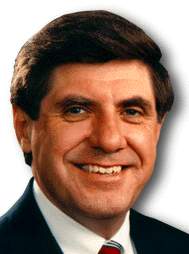
E.B. Nelson |
Nelson, E(arl) Benjamin, byname Ben Nelson (b. May 17, 1941, McCook, Neb.), governor of Nebraska (1991-99). Elected in 1990, he was the third Democrat in a row to beat an incumbent Republican associated with tax increases; the first two went on to become senators. He was elected to office by a narrow margin and was retained in a landslide. In the 1990 primary he defeated Bill Hoppner - who was supported by his former boss Bob Kerrey - by a 42-vote margin after a 48-day recount; in the general he beat Gov. Kay Orr 50%-49% because she raised taxes and her political consultants failed to place many of her paid-for scheduled TV spots in October. In a pattern also seen in Senate contests, Nelson ran strongest in the eastern part of the state (though he lost Omaha's Douglas County - the only governor in the history of Nebraska to do so) and in the southern tier, while Orr ran strongest in the Platte Valley, the sparsely populated central and western counties, and around heavily Republican Madison. Nelson pledged to serve "one Nebraska," spreading economic growth outward from Omaha and Lincoln. His first budget increased spending less than 1%, and he reformed welfare, started a lottery (for creative education projects), and built more juvenile prisons. In Republican 1994, he was reelected by an unambiguous 73%-26% margin, and promised during the campaign to serve out his entire term. However, he subsequently came under strong pressure (notably, and with some irony, from Democratic Senatorial Campaign Committee chairman Bob Kerrey) to run for the Senate seat Jim Exon relinquished in 1996. He did so, but lost to Republican Chuck Hagel. However, when Kerrey retired in 2000, Nelson was elected to his seat; he was reelected in 2006 but did not run again in 2012.

G.A. Nelson |
Nelson, Gaylord A(nton) (b. June 4, 1916, Clear Lake, Wis. - d. July 3, 2005, Kensington, Md.), governor of Wisconsin (1959-63). He entered public life in 1948 as a Wisconsin state senator from Dane county, a position he held for 10 years. In 1958, he became only the second Democrat during the 20th century to be elected governor of Wisconsin. While in office, he used a penny-a-pack tax on cigarettes to pay for the Outdoor Recreation Acquisition Program in 1961. The program allowed Wisconsin to buy hundreds of thousands of acres of park land, wetlands, and other open space. After two two-year terms, he was elected in 1962 to the U.S. Senate, unseating incumbent Republican Alexander Wiley. In his three terms, he championed conservation policies, including legislation to preserve the 2,100-mile Appalachian Trail and create a national hiking system. Nelson's most recognized effort, however, was Earth Day, which he started as an environmental demonstration based on the anti-war teach-ins of the Vietnam War. He announced his idea of a "nationwide teach-in on the environment" at a speech in Seattle in September 1969, and the first Earth Day, April 22, 1970, attracted an estimated 20 million people. Tens of thousands of people filled New York's Fifth Avenue, Congress adjourned so members could speak across the nation, and at least 2,000 colleges marked the occasion. In 1972, Sen. George McGovern, the Democratic presidential nominee, sought out Nelson as a potential running-mate, but Nelson said no. He continued to represent Wisconsin in the Senate until he was narrowly defeated in 1980 by Robert W. Kasten, Jr., one of a raft of Republicans swept into office with Ronald Reagan. Pres. Bill Clinton presented Nelson with a Presidential Medal of Freedom in 1995 for his environmental efforts.
Nelson, Hugh (b. Sept. 30, 1768, Yorktown, Virginia - d. March 18, 1836, "Belvoir" estate, Albemarle county, Va.), U.S. diplomat; son of Thomas Nelson. He was minister to Spain (1823-25).
Nelson, Sir Hugh Muir (b. Dec. 31, 1835, Kilmarnock, Ayrshire, Scotland - d. Jan. 1, 1906, Middle Ridge, near Toowoomba, Qld.), premier (1893-98) and acting governor (1904-05) of Queensland; knighted 1896.
Nelson, John (b. June 1, 1794, Frederick, Md. - d. Jan. 18, 1860, Baltimore, Md.), U.S. attorney general (1843-45) and acting secretary of state (1844). He was also chargé d'affaires in the Two Sicilies (1831-32).
Nelson, Thomas (b. Dec. 26, 1738, Yorktown, Virginia - d. Jan. 4, 1789, "Montair" plantation, Hanover county, Va.), governor of Virginia (1781); son of William Nelson.
Nelson, William (b. 1711, Yorktown, Virginia - d. Nov. 19, 1772, Yorktown), acting governor of Virginia (1770-71).
Nemcsics, Robert (b. Sept. 21, 1961, Trencianske Teplice, Czechoslovakia [now in Slovakia]), Slovak politician. He was a deputy prime minister and minister of economy and (acting) administration and privatization of state property (2002-03).
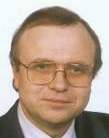
I. Nemec | 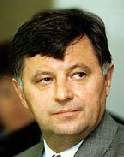
M. Németh |
Nemec, Igor (b. April 6, 1959), mayor of Praha (2002). He was also minister of state audit (1991-93) and head of the Office of the Government (1993-96) of the Czech Republic.
Nemec, Pavel (b. July 20, 1971, Prague, Czechoslovakia [now in Czech Republic]), a deputy prime minister of the Czech Republic (2004-06). He was also minister of regional development (2002-04) and justice (2004-06) and chairman of the Freedom Union-Democratic Union (2004-06).
Nemeshayev, Klavdy (Semyonovich) (b. Oct. 3, 1849 - d. June 8, 1927, Leningrad, Russian S.F.S.R. [now St. Petersburg, Russia]), Russian minister of communications (1905-06).
Németh, Károly (b. Dec. 14, 1922, Páka, Zala county, Hungary - d. March 12, 2008), chairman of the Presidential Council of Hungary (1987-88). A close aide to János Kádár, he filled various posts in the ruling Hungarian Socialist Workers' Party (MSZMP), being first secretary of the party committees of Csongrád county (1954-59) and Budapest city (1965-74) and from 1970 to 1988 a member of the party's senior decision-making body, the Political Committee. He was elected MSZMP deputy secretary-general in 1985 and became head of state in 1987. He retired in 1988 after losing his party functions in an MSZMP congress, which first indicated for the public the forthcoming crisis of the one-party system.
Németh, Miklós (b. Jan. 24, 1948, Monok, Borsod-Abaúj-Zemplén county, Hungary), prime minister of Hungary (1988-90).
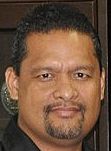
Nemra |
Nemra, Casten (Ned) (b. July 29, 1971, Ebeye, Kwajalein Atoll, Marshall Islands), president (2016) and foreign minister (2020-22) of the Marshall Islands. He was also chief secretary (2007-15).
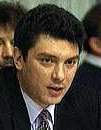
Nemtsov |
Nemtsov, Boris (Yefimovich) (b. Oct. 9, 1959, Sochi, Krasnodar kray, Russian S.F.S.R. - d. Feb. 27, 2015, Moscow, Russia), head of the administration (1991-95) and governor (1995-97) of Nizhny Novgorod oblast. In 1997 Russian president Boris Yeltsin brought him into the federal government as first deputy prime minister (also minister of energy and fuels in 1997), but in 1998 he resigned after Yeltsin abruptly sacked Prime Minister Sergey Kiriyenko, who was also from Nizhny Novgorod. While in the federal government Nemtsov made the reining in of the country's financial elite, popularly known as the oligarchs, one of his main tasks. This policy set him against powerful tycoons such as Boris Berezovsky, who used the media wings of their financial empires to attack Nemtsov. After Kiriyenko's government was sacked, both the ex-premier and Nemtsov said the move was engineered by Berezovsky and other financial barons. In 2000-04 he was co-chairman of the Union of Rightist Forces. In 2010 he was one of the founders of the People's Freedom Party (Parnas), merged in 2012 with the Republican Party of Russia to form RPR-Parnas, of which he became a co-chairman. In 2015 he was shot dead near the Kremlin by a group of gunmen.

Nena |
Nena, Jacob (b. Oct. 10, 1941, Lelu, Kosrae, Micronesia [now in Federated States of Micronesia] - d. July 6, 2022, Sacramento, Calif.), president of the Federated States of Micronesia (1997-99). The first elected governor of the state of Kosrae (1979-83), he was also a member of the Micronesian Political Status and Transition Commission from 1979 to 1981, and in 1982 he accompanied Pres. Tosiwo Nakayama to the South Pacific Forum. He was chairman of the Lelu Municipal Government Constitutional Convention in 1986 and a member of the Kosrae State Constitutional Convention. He was elected vice president of the Federated States of Micronesia in 1991 and reelected for a second term in 1995. He became acting president on Nov. 8, 1996, when Congress members declared Pres. Bailey Olter unable to discharge the powers and duties of his office after suffering from a cerebral vascular accident on July 16, 1996. President Olter, unable to return to office after 180 days since Nov. 8, 1996, automatically transferred the powers and duties of the presidency to his successor.
Nenadic, Mario (b. March 25, 1964, Sarajevo, Bosnia and Herzegovina), premier of Sarajevo canton (2020-21).
Nenchev, Nikolay (Nankov) (b. Aug. 11, 1966, Yambol, Bulgaria), defense minister of Bulgaria (2014-17). He was a minor presidential candidate in 2011.
Nendaka Bika, Victor (b. Aug. 7, 1923, Buta, Orientale province, Belgian Congo [now in Bas-Uélé province, Congo (Kinshasa)] - d. Aug. 22, 2002, Brussels, Belgium), interior minister (1965) and finance minister (1968-69) of Congo (Léopoldville/Kinshasa). He was also minister of transport and communications (1965-68) and ambassador to West Germany (1969-70).
Nene, Nhlanhla (Musa) (b. Dec. 5, 1958), finance minister of South Africa (2014-15, 2018).
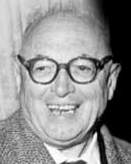
Nenni |
Nenni, Pietro (Sandro) (b. Feb. 9, 1891, Faenza, Emilia-Romagna, Italy - d. Jan. 1, 1980, Rome, Italy), Italian politician. After a protest against Italy's invasion of Libya in 1911, he was jailed for the first time and met Benito Mussolini in prison. He joined the Italian Socialist Party (PSI) in 1921 and became editor of the party's newspaper Avanti, having parted ways with its previous editor, Mussolini. After Mussolini and his Fascists came to power in 1922, Nenni attacked them in the paper as well as in speeches. Arrested in 1925 for publishing a booklet on the Fascists' murder of Socialist leader Giacomo Matteotti, he went into exile in Paris in 1926, holding the post of secretary-general of the PSI in 1931-39. During the Spanish Civil War he co-founded the Garibaldi Brigade. He was arrested in Vichy France by the German Gestapo in 1940, taken back to Italy in 1943, and interned on the island of Ponza. After Mussolini's regime collapsed, he was released (August 1943). He again took over the secretary-generalship of the PSI and in 1945 became vice-premier. In 1946 he was elected to the Constituent Assembly and was named foreign minister, but in January 1947 the PSI split and Nenni, heading the party's left wing, allied the remaining PSI (commonly called the "Nenni Socialists") with the Communists in united opposition to the Christian Democrats. He broke with the Communists after the Soviet invasion of Hungary in 1956. In 1963 he brought the PSI back into a full-fledged coalition with the Christian Democrats and served again as vice-premier (1963-68) and foreign minister (1968-69). He was elected president of a reunified PSI in 1966 but resigned when the party split again in 1969. He was made a life senator in 1970.
Neofit II (Neophytos II), family name Geanoglu (b. Jan. 12 [Jan. 1, O.S.], 1787 - d. Jan. 26 [Jan. 14, O.S.], 1850), president of the Provisional Government of Walachia (1848). He was metropolitan of Hungaro-Walachia (1840-49).
Neophytou, Averof, also transcribed Neofytou (b. July 31, 1961, Argaka, Paphos district, Cyprus), Cypriot politician. He was minister of communications and works (1999-2003) and a presidential candidate (2023).

Nepal |
Nepal, Madhav Kumar (b. March 9, 1953, Gaur, Rautahat district, Nepal), foreign minister (1994-95) and prime minister (2009-11) of Nepal. He was the general secretary of the Communist Party of Nepal (Unified Marxist-Leninist) (CPN-UML) from 1993 to 2008. After King Gyanendra seized full power, he was placed under house arrest from Feb. 1 to May 1, 2005.
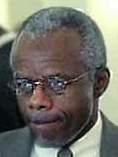
Neptune |
Neptune, Yvon (b. Nov. 8, 1946, Cavaillon, southern Haiti), prime minister of Haiti (2002-04). In 2000-02 he was president of the Senate. He was arrested on June 27, 2004, in connection with the killings on February 11 of several opponents of Jean-Bertrand Aristide near Saint-Marc where violence flared during the uprising that forced President Aristide from power and killed at least 300 people. In May 2005 he was near death after 18 days of a hunger strike demanding that the charges be dropped. Following an appeals court ruling, he was released from prison on July 28, 2006.
Nepveu, Jan (b. Aug. 27, 1719, Amsterdam, Netherlands - d. Feb. 27, 1779, Paramaribo, Dutch Guiana [now Suriname]), governor-general of Dutch Guiana (1756-57, 1768-79).
Nérette, Joseph (Camilien) (b. April 9, 1924, Port-au-Prince, Haiti - d. April 29, 2007, Port-au-Prince), provisional president of Haiti (1991-92).
Neri, Aldo (Carlos) (b. Oct. 19, 1930, Bahia Blanca, Argentina), health minister of Argentina (1983-86).
Neri (Schuster), Roberto (A.) (b. 19... - d. Feb. 3, 2008), interior minister of Uruguay (1985).
Neritani, Adrian (b. Oct. 26, 1967, Lushnjë, Albania), Albanian diplomat. He was permanent representative to the United Nations (2006-09).
Nerman, Claes Ulrik (b. Oct. 5, 1792, Gödestalund, Halland, Sweden - d. Oct. 9, 1852, Skälby, Kalmar, Sweden), governor of Kalmar (1840-52).
Nersesyan, Bakhshi (Arshakovich) (b. 1898 - d. ...), acting chairman of the Central Executive Committee of the Armenian S.S.R. (1937).
Nersisyan, Gurgen (Garniki) (b. Oct. 14, 1985, Stepanakert, Nagorno-Karabakh autonomous oblast, Azerbaijan S.S.R.), minister of state of Artsakh (2023- ).
Neruda, Pablo, original name Neftalí Ricardo Reyes Basoalto (b. July 12, 1904, Parral, Chile - d. Sept. 23, 1973, Santiago, Chile), Chilean diplomat. Better known as the poet who won the Nobel Prize for Literature in 1971, he was ambassador to France (1970-72).
Nervión, Francisco Armero y Peñaranda, marqués de (b. May 3, 1804, Fuentes de Andalucía, Sevilla province, Spain - d. July 1, 1866, Sevilla, Spain), prime minister of Spain (1857-58). He was also minister of the navy (1840, 1844-46, 1846-47, 1851-52, 1864-65), commerce and overseas (1840, 1844-46, 1846-47), war (1846, 1857-58), and interior (1857). He was created marqués in 1864.
Nery, Antonio Constantino (b. Dec. 8 or 20, 1859, Coari or Manaus, Amazonas, Brazil - d. Sept. 19, 1926, Belém, Pará, Brazil), governor of Amazonas (1904-08); brother of Silvério José Nery.
Nery, Júlio José da Silva (b. 1894? - d. Jan. 4, 1974, Rio de Janeiro, Brazil), federal interventor in Amazonas (1946); son of Silvério José Nery.
Nery, Paulo Pinto (b. Dec. 27, 1915, Manaus, Brazil - d. Nov. 15, 1995, Manaus), acting governor of Amazonas (1982-83). He was also mayor of Manaus (1965-72).
Nery, Silvério José (b. Oct. 8, 1858, Coari, Amazonas, Brazil - d. June 23, 1934, Manaus, Amazonas), governor of Amazonas (1900-03).
Neshchadimov, Vasily (Ivanovich) (b. July 26, 1949), prime minister of Karachayevo-Cherkessia (1999-2000).
Nesho, Agim (b. March 29, 1956, Tiranë, Albania), Albanian diplomat. He was permanent representative to the United Nations (1997-2006) and chargé d'affaires in the United States (2005-06).
Nesselrode, Graf (Count) Karl (Vasilyevich), German Karl Robert Graf von Nesselrode (b. Dec. 13, 1780, Lisbon, Portugal - d. March 23 [March 11, O.S.], 1862, St. Petersburg, Russia), foreign minister of Russia (1814-56); son of Graf Vilgelm Nesselrode; son-in-law of Graf Dmitry Guryev. He was also chancellor (1844-56).
Nesselrode, Graf (Count) Vilgelm, German in full Maximilian (or Maria) Julius Wilhelm Franz Graf von Nesselrode-Ereshofen (b. Oct. 24, 1728, Düsseldorf, Palatinate [now in Nordrhein-Westfalen, Germany] - d. March 8, 1810, Frankfurt am Main, Grand Duchy of Frankfurt [now in Hessen, Germany]), Russian diplomat. He was minister to Portugal (1778-88) and Prussia (1788-96).
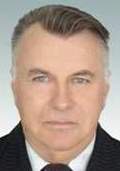
Nesterenko |
Nesterenko, Aleksandr (Vasilyevich) (b. Nov. 27, 1947), acting governor of Amur oblast (2007).
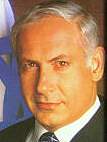
Netanyahu |
Netanyahu, Benjamin (Benjamin also spelled Binyamin), byname Bibi Netanyahu, in the 1970s also using the name Ben Nitay (b. Oct. 21, 1949, Tel Aviv, Israel), prime minister of Israel (1996-99, 2009-21, 2022- ). In 1967 he joined the army, where he served in the elite, top-secret Sayeret Matkal ("Border Reconnaissance") commando unit, which often staged daring raids, and rose to the rank of captain. In 1972 he was on the team that successfully stormed a hijacked airliner at Ben-Gurion Airport. In 1973 he fought in the Yom Kippur War. In 1982 he accepted an offer from Moshe Arens, the Israeli ambassador to the U.S., to join him and serve as deputy chief of mission. He then moved on to become the Israeli ambassador to the UN (1984-88). In 1988 he was elected to the Knesset (parliament) as a member of the Likud bloc and quickly established himself as an adept politician. In 1988-91 he was deputy foreign minister. He succeeded Yitzhak Shamir as leader of Likud in March 1993 following the party's 1992 electoral defeat. In 1996 he won the first direct election of prime minister with the slimmest of margins. Negotiations with the Arab world were difficult as he clung to a concept that the West Bank is the Jewish people's God-given birthright and rejected the concept of a Palestinian state. But he signed two interim accords with the Palestinians, marking the end of Likud's ideological opposition to ceding West Bank land. In October 1998 he signed the U.S.-brokered Wye River land-for-security accord. He suspended the deal in December, alleging Palestinian violations. In the 1999 election he was defeated by Ehud Barak. He was then replaced by Ariel Sharon as Likud leader. Under Prime Minister Sharon he served as foreign minister (2002-03) and finance minister (2003-05). After Sharon formed the Kadima party in 2005, Netanyahu again won the leadership of Likud, now consisting mainly of hardline right-wingers. In 2009 he formed a government along with Labour and various right-wing parties, in 2015 one without Labour. While prime minister he also held the portfolios of justice (1996, 2014-15, 2019), religious affairs (1996, 1997, 1998), housing (1996-99), science (1996-97), finance (1997, 1998-99, 2014-15), foreign affairs (1998, 2012-13, 2015-19), education (1998, 2019), health (2009-13, 2015, 2017-19), senior citizens (2009-13), economic strategy (2009-13), Jerusalem and diaspora affairs (2013), communications (2014-17), science and technology (2014-15), economy (2015-16), regional cooperation (2015-16), interior (2015-16), defense (2018-19), immigration and absorption (2018), diaspora affairs (2019-20), and labour, social affairs, and social services (2019-20). Under Netanyahu, who became Israel's longest-serving prime minister in July 2019, Israel kept moving further to the right, culminating in the 2018 Nation-State Law which reasserted Jewish supremacy; Israel in fact became a model for white supremacists in the West demanding a similar "ethnostate." In November 2019, while struggling to maintain power after two inconclusive elections, he was indicted on corruption charges. Nevertheless, after a third election in 2020 he was able to form a unity government with Benny Gantz, who was to succeed him after 18 months. Before it came to that, a fourth election was held in 2021, following which he finally lost his post when Naftali Bennett organized an unlikely coalition of parties both to the left and right of Likud. This collapsed too in 2022, and after the new elections he was able to return with a government that included Kahanist extremists, previously shunned even by the Israeli right (one of them, formerly convicted of inciting racism and supporting a terrorist organization, being made minister of national security), and which proclaimed as its guideline that "The Jewish people has an exclusive and inalienable right to all parts of the Land of Israel."

A. Neto |
Neto, (António) Agostinho (b. Sept. 17, 1922, Icolo e Bengo, Angola - d. Sept. 10, 1979, Moscow, U.S.S.R.), president of Angola (1975-79). In 1948 he joined a national cultural movement aimed at "rediscovering" indigenous Angolan culture (similar to the Négritude movement in French-speaking Africa). He studied medicine in Lisbon, Portugal, where he was first arrested for political activities. Returning to Angola in 1959, he was arrested in the presence of his patients in June 1960 because of his militant opposition to the colonial authorities. When his patients protested the arrest, the police opened fire, killing some and injuring about 200. Held in detention at first in Cape Verde, he was later transferred to Lisbon, from where he managed to escape to Morocco in 1962. There he joined the Angolan liberation movement in exile. At the end of 1962 he was elected president of the Movimento Popular de Libertação de Angola (MPLA), based in the Congolese capital of Léopoldville (now Kinshasa). Despite Soviet support for the Marxist-oriented MPLA, Moscow's relations with Neto were uneasy and were suspended for a time but restored after the 1974 military coup in Lisbon. When in 1975 Angola became independent, it was divided among its three warring independence movements (MPLA, FNLA, UNITA). With Cuban help, the MPLA forces held the central part of the country, including the capital, but civil war continued. On Oct. 8, 1976, he and Soviet leader Leonid Brezhnev signed a Soviet-Angolan treaty of friendship and cooperation in Moscow. In May 1977 Neto survived a bloody uprising of dissident elements of the MPLA. In August 1977 he visited Havana, but he belonged neither to the East nor to the West. He died in Moscow following an operation for cancer there.

N.P. Neto |
Neto, Natália Pedro da Costa Umbelina, foreign minister of São Tomé and Príncipe (2012-14).
Neto, Pedro Hendrick Vaal (b. Nov. 25, 1944, Cabela, Cuanza Sul, Angola), Angolan politician. A stalwart of the National Front for the Liberation of Angola (FNLA), he was foreign minister in the government of the Democratic People's Republic of Angola (1975-76) but later joined the government led by the People's Movement for the Liberation of Angola (MPLA) to become minister of social communication (1992-2005) and ambassador to Egypt (2006-11) and Zimbabwe (2011-19).
Netto, Antônio Delfim (b. May 1, 1928, São Paulo, Brazil), finance minister of Brazil (1967-74). He was also ambassador to France (1975-78) and minister of agriculture (1979) and planning (1979-85).
Netto, Walter Souza Braga (b. March 11, 1957, Belo Horizonte, Brazil), defense minister of Brazil (2021-22). He was also army chief of staff (2019-20) and head of the civil cabinet (2020-21).
Netzén, (Klas) Gösta (b. Jan. 30, 1908, Valbo, Gävleborg, Sweden - d. June 20, 1984), governor of Malmöhus (1961-73). He was also Swedish minister of agriculture (1957-61).
Neuman, Alois (b. March 12, 1901, Smidar, Austria [now Smidary, Czech Republic] - d. July 27, 1977, Prague, Czechoslovakia [now in Czech Republic]), justice minister of Czechoslovakia (1960-68). He was also mayor of Ceské Budejovice (1937-39, 1946-48) and minister of posts (1948-52) and communications (1952-60).
Neuman, Bernard-Hubert (b. Oct. 13, 1818, Boevange les Clervaux, Luxembourg - d. Sept. 26, 1891, Luxembourg, Luxembourg), interior and justice minister of Luxembourg (1863-64).
Neumann, Alfred (b. Dec. 15, 1909, Berlin, Germany - d. Jan. 4, 2001, Berlin), first secretary of the Socialist Unity Party (SED) of East Berlin (1953-57). A member of the SED Politburo from 1958 to 1989, he was also chairman of the Economic Council (1961-65), minister of materials and a deputy premier (1965-68), and a first deputy premier (1968-89) of East Germany.
Neumayer, Fritz (b. July 29, 1884, Kaiserslautern, Bayern [now in Rheinland-Pfalz], Germany - d. April 12, 1973, Munich, West Germany), justice minister of West Germany (1953-56). He was also minister of construction (1952-53).
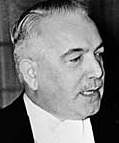
Neurath |
Neurath, Konstantin (Hermann Karl) Freiherr von (b. Feb. 2, 1873, Kleinglattbach, Württemberg [now part of Vaihingen, Baden-Württemberg], Germany - d. Aug. 14, 1956, Enzweihingen [now part of Vaihingen], Baden-Württemberg, West Germany), foreign minister of Germany (1932-38). Entering the German foreign service, he was vice-consul in London in 1903-08 and counsellor at Constantinople in 1914-16. Recalled to Germany in 1917, he was appointed chef de cabinet to the king of Württemberg. After World War I he served as minister to Denmark (1919-21), ambassador to Italy (1921-30), and ambassador to Great Britain (1930-32). Favoured by Pres. Paul von Hindenburg, he was foreign minister from June 1932 in the cabinets of Franz von Papen and Kurt von Schleicher and retained his post after Adolf Hitler became chancellor in 1933. He implemented Hitler's initial foreign policies, such as withdrawal from the League of Nations, but he was critical of Hitler's expansionist plans and in February 1938 he was replaced by Joachim von Ribbentrop and named president of a newly-formed Privy Cabinet Council. In March 1939 he was appointed Reichsprotektor for Bohemia and Moravia. He instituted the Nürnberg racial laws in the protectorate and made Czech industry work for the German war effort. Nevertheless, in 1941 he was told by Hitler that his regime was not harsh enough and Reinhard Heydrich was installed to act in his place, although Neurath nominally held the post until 1943. He was arrested by French forces in 1945 and was brought to trial before the International Military Tribunal at Nürnberg, found guilty, and, on Aug. 31, 1946, sentenced to 15 years' imprisonment. He was released from Spandau prison in November 1954 on account of age and ill health.
Neureuter, Hans (b. May 8, 1901, Elberfeld, Prussia [now part of Wuppertal, Nordrhein-Westfalen], Germany - d. Dec. 31, 1953, Saarbrücken, Saarland [Germany]), president of the government of the Saargebiet (1945-46).
Nevermann, Paul (b. Feb. 5, 1902, Hamburg, Germany - d. March 22, 1979, Puerto de la Cruz, Tenerife, Canarias, Spain), first mayor of Hamburg (1961-65).
Neves, Agostinho da Silva (d. April 3, 1851), president of Alagoas (1838-40) and Paraíba (1840, 1843-44, 1850-51).
Neves, Alfredo da Silva (b. Nov. 22, 1887, Barra Mansa, Rio de Janeiro, Brazil - d. June 22, 1975, Rio de Janeiro, Brazil), federal interventor in Rio de Janeiro (1939 [acting], 1945).
Neves, Carlos Filomeno Azevedo Agostinho das (b. June 20, 1953), São Tomé and Príncipe diplomat. He was ambassador to Portugal (1991-94), Spain (1992-94), and the United States (2013-17) and permanent representative to the United Nations (2012-17).
Neves, Graciano dos Santos (b. July 12, 1868, São Mateus, Espírito Santo, Brazil - d. April 21, 1922, Rio de Janeiro, Brazil), member of the Governing Junta (1891-92) and president (1896-97) of Espírito Santo.
Neves, Joaquim Xavier (b. c. 1793, Paranaguá, São Paulo [now in Paraná], Brazil - d. April 4, 1872, São José, Santa Catarina, Brazil), acting president of Santa Catarina (1869).
Neves, Jones dos Santos (b. Dec. 29, 1901, São Mateus, Espírito Santo, Brazil - d. Dec. 20, 1973, Vitória, Espírito Santo), federal interventor (1943-45) and governor (1951-52) of Espírito Santo.
Neves, Jorge Ney Viana Macedo, byname Jorge Viana (b. Sept. 20, 1959, Rio Branco, Acre, Brazil), governor of Acre (1999-2007). He was also mayor of Rio Branco (1993-97).
Neves, José, Filho (b. Sept. 17, 1883, Alagoa do Monteiro, Paraíba, Brazil - d. Sept. 28, 1964, Recife, Pernambuco, Brazil), federal interventor in Pernambuco (1945-46).

J.M. Neves | 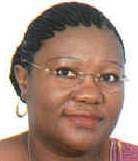
M. das Neves |
Neves, José Maria (Pereira) (b. March 28, 1960, Santa Catarina, Santiago island, Cape Verde [now Cabo Verde]), prime minister (2001-16), defense minister (2001-02), finance minister (2003-04), and president (2021- ) of Cape Verde/Cabo Verde.
Neves, José Maria Correia das (b. 1886, Mata Grande, Alagoas?, Brazil - d. Aug. 15, 1953, Maceió?, Alagoas), federal interventor in Alagoas (1940-41).
Neves, José Pereira de Araujo (d. March 15, 1850, Natal, Rio Grande do Norte, Brazil), president of Rio Grande do Norte (1849-50).
Neves, Leopoldo Amorim da Silva (b. Feb. 24, 1898, Manaus, Amazonas, Brazil - d. Nov. 7, 1953, Manaus), governor of Amazonas (1947-51).
Neves (Ceita Baptista de Sousa), Maria das (b. July 11, 1958, São Tomé), prime minister of São Tomé and Príncipe (2002-03, 2003-04). She was also minister of economy (1999-2001) and commerce, industry, and tourism (2002) and a presidential candidate (2011, 2016).
Neves, Sebastião Afonso Viana Macedo, byname Tião Viana (b. Feb. 9, 1961, Rio Branco, Acre, Brazil), governor of Acre (2011-19); brother of Jorge Ney Viana Macedo Neves. He was acting president of the Federal Senate in 2007.
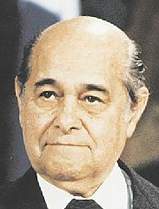
T. Neves |
Neves, Tancredo de Almeida (b. March 4, 1910, São João del Rei, Minas Gerais, Brazil - d. April 21, 1985, São Paulo, Brazil), Brazilian politician. He became involved in local politics, and in 1951 he moved to Rio de Janeiro to become a federal legislator. In 1953 Pres. Getúlio Vargas appointed Neves justice minister, but the following year Vargas committed suicide and Neves returned to Congress. After serving as a director of the state-owned Banco do Brasil in the late 1950s (and its acting president in 1956), he was again elected to Congress in 1961 and held the newly created post of prime minister (1961-62) under Pres. João Goulart. When the military took power in 1964, Neves became a respected leader in opposition circles and a popular centrist politician. In 1983-84 he was governor of his home state, Minas Gerais. Though he was not particularly innovative, his moderate and conciliatory stance made him the perfect presidential candidate. The Democratic Movement Party nominated him in August 1984; never regarded as too vocal a critic of the military regime, he also gained the support of defectors from the outgoing government's Social Democratic Party. These dissidents gave him the votes he needed to score a landslide victory in the 686-member electoral college over the government's candidate, Paulo Salim Maluf, on Jan. 15, 1985. He was scheduled to become the first civilian president in 21 years on March 15, but a series of seven operations, the first on the eve of his inauguration, prevented him from taking office. He died of complications following intestinal surgery. Although he was not sworn in as president, he was buried with the presidential sash. An act of Congress declared that Neves should be "listed in the gallery of presidents" for all appropriate purposes.
Neves Ferreira, João António de Brissac das (b. Feb. 28, 1846, Belém, Portugal - d. July 5, 1902, Funchal, Madeira, Portugal), governor-general of Mozambique (1889-90) and Portuguese India (1896-97).
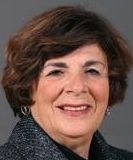
Neville |
Neville, Anita (Ruth), née Schwartz (b. July 22, 1942, Winnipeg, Man.), lieutenant governor of Manitoba (2022- ).
Nevu, Hosea, internal affairs minister of Vanuatu (2015-16). He was also minister of agriculture, forestry, livestock, fisheries, and biodiversity (2018-20).
New, Sir Laurence (Anthony Wallis) (b. Feb. 25, 1932), lieutenant governor of the Isle of Man (1985-90); knighted 1990.
Newall, Cyril (Louis Norton) Newall, (1st) Baron (b. Feb. 15, 1886, Mussoorie, India - d. Nov. 30, 1963, London, England), governor-general of New Zealand (1941-46). He was knighted in 1935 and created a baron in 1946.
Newcastle(-under-Lyme), Thomas Pelham-Holles, (1st) Duke of, (1st) Duke of Newcastle-upon-Tyne, (1st) Marquess of Clare, (1st) Earl of Clare, (1st) Viscount Haughton, (2nd) Baron Pelham of Laughton, (1st) Baron Pelham of Stanmer, original name Thomas Pelham (b. July 21, 1693, Sussex, England - d. Nov. 17, 1768, London, England), British prime minister (1754-56, 1757-62). He was also secretary of state for the Southern Department (1724-48) and the Northern Department (1748-54) and lord privy seal (1765-66). He assumed the name Pelham-Holles in 1711, succeeded as Baron Pelham of Laughton in 1712, and was created Viscount Haughton and Earl of Clare in 1714, Marquess of Clare and Duke of Newcastle-upon-Tyne in 1715, Duke of Newcastle-under-Lyme in 1756, and Baron Pelham of Stanmer in 1762.
Newcastle under Lyme, Henry (Pelham Fiennes) Pelham-Clinton, (5th) Duke of (b. May 22, 1811, London, England - d. Oct. 18, 1864, Clumber Park, Nottinghamshire, England), British secretary of state for war (1852-55) and colonies (1852-54, 1859-64); great-great-grandnephew of Thomas Pelham-Holles, Duke of Newcastle. He was also first commissioner of woods and forests (1841-46) and chief secretary for Ireland (1846). He succeeded as duke in 1851.
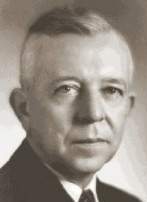
Newcomer |
Newcomer, Francis K(osier) (b. Sept. 14, 1889, Byron, Ill. - d. Aug. 16, 1967, San Antonio, Texas), governor of the Panama Canal Zone (1948-52). He received an appointment as a cadet to the United States Military Academy at West Point in 1909. In June 1913 he was commissioned a second lieutenant in the U.S. Army Corps of Engineers. In 1916 he was promoted to the rank of captain. When the U.S. joined the Allies in World War I, he went to France to take part in the Aisne-Marne offensive and the Serre and Vesle defensives. Having advanced to the rank of lieutenant colonel, he entered the Army War College, Fort Humphreys, Washington, D.C., in 1939. He graduated in June 1940 and was appointed assistant to the president of the Mississippi River Commission and to the division engineer of the Lower Mississippi Valley Division at Vicksburg, Miss. In May 1944, he became Panama Canal maintenance engineer, then part of the Caribbean Defense Command. That same year he received the rank of brigadier general. He served as chief assistant to then Panama Canal Zone governor Maj.Gen. Joseph Mehaffey. After serving for four years, Newcomer was appointed governor. During his tenure, questions of increasing the toll charges on privately owned vessels using the canal and of converting the lake canal to a sea-level route were under consideration. Also, for the first time in canal history, the payment of tolls was initiated for ships operated or rented by the U.S. government. During his tenure the name of the Panama Canal as a corporate agency was changed to Panama Canal Company in 1951, and the terms of "Silver" and "Gold roll" to designate wage standard were abolished on Nov. 21, 1948. In October 1949 he resigned from active army duty but continued serving as governor until 1952.
Newdegate, Sir Francis Alexander Newdigate, originally (until 1902) Francis Alexander Newdigate (b. Dec. 31, 1862, London, England - d. Jan. 2, 1936, Nuneaton, Warwickshire, England), governor of Tasmania (1917-20) and Western Australia (1920-24); knighted 1917.
Newdigate, H(enry) R(ichard) L(egge) (b. Dec. 24, 1832 - d. Jan. 17, 1908), acting governor of Gibraltar (1891).
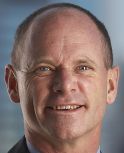
C. Newman |
Newman, Campbell (Kevin Thomas) (b. Aug. 12, 1963, Canberra, A.C.T.), premier of Queensland (2012-15). He was lord mayor of Brisbane in 2004-11.
Newman, Frank (Neil) (b. April 20, 1942, Quincy, Mass.), acting U.S. treasury secretary (1994-95).
Newry, Eugene Glenwood (b. Oct. 4, 1935, Nassau, Bahamas), Bahamian diplomat. He was ambassador to Haiti and the Dominican Republic (2002-07) and the United States (2013-17) and permanent representative to the United Nations (2013).
Newsom, David (Dunlop) (b. Jan. 6, 1918, Richmond, Calif. - d. March 30, 2008, Charlottesville, Va.), acting U.S. secretary of state (1980, 1981). After entering the U.S. Foreign Service in 1947, he served as diplomatic officer in Karachi, Oslo, Baghdad, and London. He served as ambassador to Libya (1965-69), Indonesia (1974-77), and the Philippines (1977-78). In Washington, he served as officer-in-charge, Arabian Peninsula affairs (1955-60), director, Office of Northern African Affairs (1969-73), and undersecretary of state for political affairs (1978-81). After retirement in 1981, he served as director of the Institute for the Study of Diplomacy and associate dean as well as interim dean at the School of Foreign Service, Georgetown University. In 1991 he was appointed Cumming Professor of International Studies and Diplomacy at the University of Virginia.
Newsom, Gavin (Christopher) (b. Oct. 10, 1967, San Francisco, Calif.), mayor of San Francisco (2004-11) and governor of California (2019- ).
Newton, Quigg, in full James Quigg Newton, Jr. (b. Aug. 3, 1911, Denver, Colo. - d. April 4, 2003, Denver), mayor of Denver (1947-55). He became the youngest mayor in the city's history when he defeated five-term incumbent Benjamin F. Stapleton. He modernized the city by creating a planning office along with the city's first budget office. He opened the city's purchases and contracts for competitive bids and instituted the Career Service Authority to de-politicize the city's hiring practices. After serving two terms as mayor, he became president of the University of Colorado (1956-63). Several buildings around Denver, including a senior centre and an auditorium, were named in his honour.
Ney, Camille (b. Jan. 1, 1919 - d. Aug. 29, 1984), Luxembourg politician. He was minister of agriculture (1972-74, 1979-82), public health (1972-74), and viticulture, waters, and forests (1979-82).
Ney, Hubert (b. Oct. 12, 1892, Saarlouis, Prussia [now in Saarland], Germany - d. Feb. 3, 1984, Saarlouis), minister-president of Saarland (1956-57).
Ney Pena (b. May 8, 1948, Svay Rieng province, Cambodia), interior minister of Kampuchea (1986-88).
Neychev, Mincho (Kolev) (b. March 23 [March 11, O.S.], 1887, Stara Zagora, Bulgaria - d. Aug. 11, 1956, Sofia, Bulgaria), chairman of the Presidium of the National Assembly (1947-50) and foreign minister (1950-56) of Bulgaria. He was also minister of justice (1944-46) and education (1946-47).
Neyelov, Yury (Vasilyevich) (b. June 24, 1952), head of the administration (1994-96) and governor (1996-2010) of Yamalo-Nenets autonomous okrug.
Neyens, Alphonse (b. Jan. 7, 1886, Consdorf, Echternach district, Luxembourg - d. Sept. 3, 1971, Luxembourg, Luxembourg), finance minister of Luxembourg (1918-25).
Neymour, Chet Donovan (b. 1967), Bahamian diplomat. He was permanent representative to the United Nations (2021-22).
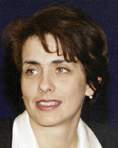
Neynski | 
Nezzar |
Neynski, Nadezhda (Nikolova), former surname (1983-2009) Mihailova (b. Aug. 9, 1962, Sofia, Bulgaria), foreign minister of Bulgaria (1997-2001).
Neyra (Zegarra), Ana (Cristina), justice minister of Peru (2020).
Nezvál, Ferenc (b. Feb. 7, 1909, Györ, Hungary - d. Nov. 26, 1987, Budapest, Hungary), justice minister of Hungary (1956-66). He was also minister of town and village economy (1956).
Nezzar, Khaled, Arabic Khalid Nazzar (b. Dec. 27, 1937, Sériana, Algeria), defense minister (1990-93) and member of the High State Committee (1992-94) of Algeria.







































































